#Long meta
Explore tagged Tumblr posts
Text
911 and the Wizard of Oz!
So I’ve written a couple of times about the wizard of Oz connections that 911 has had in the past. Well after 8x03 and the trailer for 8x04 - everything has become much clearer to me and boy oh boy is Tim pulling a blinder with this one!
I need to start by saying he is playing on lore from both the original books as well as the film, so much of this wouldn’t be evident if you had little to no knowledge of the book series. I however do - because I loved the books as a child and I have also long been interested in the link between the books, the original film and the queer narrative that runs through them. Especially because of my yellow and blue and then blue and green colour theory and its use in telling queer narratives in cinema and television in the aftermath of the 1939 film.
For those who don’t know the background of it, you can read my post here about the wizard of oz and its queer narrative and the yellow/blue colour theme, but for a brief run down the wizard of oz and its themes have been a key part of the queer narrative since they first appeared in print and then on film. Yellow blue colour theory stems from Dorothys dress and the yellow brick road and became a film short hand for queer narratives in film, during the hays code era (1934-1968), and has continued on to this day. the most recent and most obvious use of the blue/yellow blue/green coding has been in heartsotopper - where it is very heavily and very cleverly used to help tell the queer narrative, but it is its use in films during the hays code where it was doing a lot of work to ‘secretly’ provide queer narrative in film. (this is a specialist subject of mine and I could write about it all day - I really would love to do a phd in it, but I do not have the money or time to do that so I write about it at any opportunity on tumblr!)
Many of the nods to the story are subtle, but they are there and I am going to go through a good number of them with you - especially the ones we’ve had in season 8 so far, the main thing to note right off the bat though is that they all connect in to Eddie and that is very telling to me - especially when we take 5x01 - 5x04 into account. the rest is below the cut becasue it's long!
The very first reference to the Wizard of Oz we get is in 202 - 7.1. We have the entitled woman (that is the name they gave the character in the credits!) with her dog - Paisley.The entitled woman is wearing red shoes and we get shown her with just her feet sticking out from under the rubble in a clear nod to the wicked witch of the east being buried under Dorothys house in Oz.

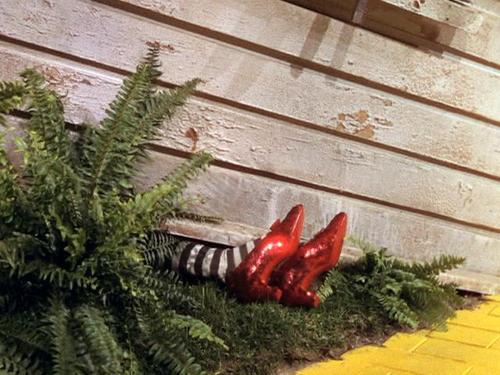
Kat the little girl who gets separated from her family and ultimately reunited with them is a nod to the overall story of Dorothy in the wizard of Oz - and Paisley is a nod to Toto - Dorothy’s dog. I will also mention the fact that we get a heart metaphor during this disaster - Jeff - the heart of a champion.
We get a further nod in season 2 in 207 - Haunted - where we have the girl at the halloween parade dressed as the film version of Dorothy. I don’t think there is a huge amount to read into from a Wizard of Oz perspective, beyond the fact that it is referenced - we don’t actually need to see anything further in regards to the Wizard of Oz - its all about making the connection.

This episode is a big episode of Eddie and his storyline and this is a way for 911 to link Eddie into the Wizard of Oz theme without being massively obvious about it and his absence from this scene is a key part of that.
There are other key elements in this scene that we’ve been seeing come into play over the seasons for Eddie and that is what makes the wizard of Oz reference especially interesting. First up it's important to note that this is the episode we see the return of Shannon in. We have the horse and his rider - being separated by the death of the horse and the officer describing the horse as his friend. There are two things this is playing on here - the first is the foreshadowing of Shannons death, the second is that the show has then reused this metaphor of partners being separated by death, this time making use of the police aspect as a part of Eddies breakdown in season 5 - Mills’s - Eddies partner while he was in the army and her death. These two elements are why Eddie absence is key - Eddie becomes the officer and Shannon or Mills becomes the Horse and having Eddie present in the scene waters down the metaphor.
The fact we get a lot of wizard of Oz references in season 5, makes this a really interesting and clever connection to draw. The other aspects of this scene in 207 is the pretty important reference about the horse needing a sedative to stop him thrashing around until his heart gave out. Bearing in mind this is the first really intentional heart metaphor we see on the show and it’s a pretty key episode for Eddie in relation to his heart, his absence from this scene becomes louder, especially as he is off with his heart (Christopher) enjoying halloween. It makes it clear that the Eddie and hearts metaphor has been there since very early on - and has been (at least loosely)connected to The Wizard of Oz.
Remembering what I said above and in my other post about the wizard of Oz being very heavily connected to queer theming and storytelling in media it makes it likely that this is the show putting in early building blocks for a queer Eddie arc gif they wanted to then go down that route later on. (this makes the season 5 theming I’ll talk about shortly even more interesting to me!)
The last thing to mention is the is the emphasis on the devil, a priest and a drag queen at the parade- all things we see appearing in Eddies arc through season n7 and into 8. The drag queens from the bachelor party - in which we really see Eddie letting go and have fun for the first time. The priest and the devil are a metaphor for Eddies struggles with his faith - the idea of temptation (in the catholic church - especially the devout catholic church, being queer in any way is seen as being tempted by the devil), and with us having knowledge of Eddie going to church and likely talking to a priest in some capacity in the next few episodes, we have yet another tie back to this storyline from 207.

Now I obviously have no proof with what the intentions were for ~Eddie in season 5, but I’ve long had my theories and now, knowing that they had originally intended to have Bucks bisexual arc take place in s5 but it got shut down by the higher ups, I can make some pretty educated guesses based off what we did get early on in the season.
Season 5 opened with the blackout and then we led straight in to 5x04 ‘Home and Away’ with all its yellow and blue colour theming. Can you see where I’m going with this? How does the opening of the film version of the Wizard of Oz start? Yup that’s right - in black and white and then when Dorothy finds herself over the rainbow everything is in colour and the use of yellow and blue is very strong with Dorothy’s blue gingham dress and the yellow brick road with the green colouring coming later on when they reach the emerald city.

So I think 911 was intending to play on that concept in season 5 - the idea that the black out is a nod to Kansas being in black and white (not to mention the use of green for the hackers!) and then 5x04 is a play on Dorothy following the yellow brick road - hence the heavy use of yellow and blue and the way it winds through the narrative of the episode (along with the use of the bluejay as the schools animal emblem - which is a symbol of communication, curiosity and confidence - seeing a bluejay is telling you to be bold and chase your goals!). What is the other thing we get a huge number of references to in season 5 - especially connected to Eddie - hearts and heart metaphors.
We do also get a nod to the wizard of Oz in season 6 and the zeppelin disaster - which is a nod to the hot air balloon the wizard crashed into Oz in. The zeppelin is yellow and blue and the conversation on board refers to one of the pilots mother in law - whilst she isn’t stated to be a witch, the implication is there. the 110 is also closed in roughly the same place as we get it closed in 8x03. along with the fact that Eddie is the one to go into the zeppelin - Chim and Buck only partially go in - and the parallel storyline in the episode is about a heart issue, we once again have The Wizard of Oz being tied into heart metaphors.

Let’s move on to season 8 now and look at the vast number of Wizard of Oz references we have seen so far and appear to have coming up in 8x04. I will say the sheer number of references in season 8 compared with the more subtle ones from seasons 5 and 6 is one of the reasons I’m so very sure we have a queer Eddie arc going on - that they’ve finally been able to pull that trigger and move things forward for him.
Just remember that things don’t have to exactly follow the story of the wizard of Oz to be relevant - its not about the narrative following the same path, but more about the use of recognised aspects and tropes from the book and film to convey information and aid the storytelling. It is often more about the concept and meaning behind something and a 911 character may share the traits of more than one wizard of oz character because it is their traits that are relevant not necessarily TWoO characters full journey through the book or film.
The bee-nado is a literal reference to the tornado that sent Dorothy to oz - its one of the reasons we don’t see more of the bees - they serve their purpose in the same way the tornado does so we don’t need to see them again.
Gerrard building ‘his 118’ with a security fence around the firehouse and cast iron plumbing is a reference to the wizard building the Emerald city - which has a wall around it for security. In Oz it is the place full o the most up to date technology etc. So Gerrard is building his Emerald City.
The mother in the car falling asleep due to anaphylaxis is likely a reference to the poppy field in the film version of TWoO, along with the flowers at the perfume launch and Bucks statement that ‘smoke worked last time’ - because the smoke did make the bees sleepy like the poppies made Dorothy and her friends sleepy.
Bucks plan to have Eddie run and attract the the swarm of bees is a reference to an event that happens in the book. The wicked witch sends a swarm of bees to sting them to death. The tin man and scarecrow had seen them coming and scarecrow comes up with a plan - he has Dorothy, toto and the lion covered in his straw to hide them from the bees who only find the tin man - they try to sting him but it breaks their stings and kills them instead without hurting the tin man as he is impervious to bees by nature of being made of tin. What we see happen in 801 is very clearly placing Buck into the role of Scarecrow and Eddie into the role of tin man - Buck comes up with the plan and Eddie undertakes it successfully - his turnouts protecting him from the bees just like the tin man being made of tin protected him.

Gerrard hitting his head is a reference to Dorothy hitting her head in the tornado and waking up in Oz - its a reference to Dororthy’s line ‘Toto, I have a feeling we’re not in Kansas anymore’ - its a play on the fact that the 118 is a very different place to when Gerrard was removed first time. Gerrard represents the black and white world - outdated and not up with the times (which he wasn’t back in the day either but that’s kind of the point), the world (the 118) is now in glorious technicolour since his departure and Gerrard will end up back in a black and white world in the end while the rest of the 118 will remain in colour and move forward. This places Gerrard in the role of the Wizard, but it is more akin to the book wizard than the film wizard - originally in the books (it was later glossed over as it didn’t go down well with readers) the Wizard arrives in a hot air balloon and becomes ruler of Oz by usurping he King and handing over the princess to a witch (more on this later!). As is shown in the film, he leaves Oz to return home in a hot air balloon. If Gerrard is the wizard, this makes Bobby the king (usurped from his throne at the 118) and Hen becomes Ozma (this is something I will talk about a bit later as it deserves its own section!) which fits with how we are being shown Hen being given the 118 captains role on a more frequent basis - suggesting the show is transitioning her into becoming the captain down the line.
Tia, her dog and Jordan are an interesting trio - they are a very clear parallel serve as a multi layered allegory as they play on several aspects of the film and books, as well as linking to aspects of 911 and especially on Buck and Eddies storyline.
Firstly we have the dog - who is the same type of dog as Paisley from season 2 - right down to the red bow in the hair (which is encouraging us to draw parallels with the earthquake disaster). Both dogs are a nod to Toto - Dorothy’s dog in the Wizard of Oz. The dog is also a representation of Buck, but I’ll go into that when I talk about Buck below!


Tia represents both Dorothy and the tin man, we see her initially as, not heartless, but guarded, but she softens especially when we see her following the instructions Hen gives, and bonding with various people on the plane including Jordan, in much the same way we see the tin man do for Dorothy and scarecrow. She is also a representation of Eddie (again I’ll go into this more later on)
Jordan is a reference to both the flying monkeys (through his telephone conversation he is implied to be a business monkey which is in turn a play on monkey business - behaviour that causes discomfort our annoyance) and the cowardly lion. He is also a reference to Chopfyt who only appears in the books and is a man made from the parts of others and is a reference to Tommy, which I will explain later as well!
its worth pointing out that Jordans viagra fuelled boner is hidden under a rainbow towel and when they get off the plane Tia, Jordan and the dog are sat on a yellow tarpaulin - the implication being that they are still in Oz and over the rainbow, but that isn't real life - its fake - a dream - and reaity will set back in once they are able to go home.

Buck has 2 red flares to bring the plane home - symbolic of the red slippers - click three times and say there’s no place like home.
There is a lot of yellow and blue lighting used in combination - especially around Buck and Eddie.
The green lighting on the plane after it has landed - a reference to leaving the Emerald city and Oz and going home.
Im sure there are others that I may have missed, but these are the key ones, and most of them will likely remain in play in some capacity in the upcoming episodes.
As for the potential upcoming oz references, we have the following
the tiger in 804 is likely a reference to lions and tigers and bears. Oh my! from the film, but may also be a reference to the hungry tiger from the books - who is a tiger who is never full and desires to eat a fat baby but never would as his conscience would never allow him to. He is described in the books as the largest and most powerful of his kind and is one of Ozmas chariot drivers and is friends with the cowardly lion. The Tiger reference coming in no place like home and the books connection of the tiger with Princess Ozma and the cowardly lion makes me feel like Karen may be represented by and paralleled with the tiger, and the idea that Karens conscience won’t allow her to metaphorically eat Ortiz (the fat baby) but that is purely speculation on my part!
the pumpkin stuck on a head storyline that’s been hinted at coming up in 805 - in the books there is a character called Jack pumpkin head who is made by the Princess Ozma when she is Tip and then brought to life by magic (Ozma is the rightful ruler of Oz and was given to the Witch Mombi of the North by the wizard in order to prevent he rightful ruler of Oz ascending the throne. Ozma is transformed into a boy called Tip by Mombi, but is later turned back when Glinda discovers what has happened). Im expecting this arc on the show to play into Jack’s storyline in the books. Jack refers to having lost a father when Tip is returned to being Ozma. I think we’ll see it played as a reference to Mara, Chim and Hen, because Hen is Very Ozma coded which I’ll explain a bit more later on!
Masks. with 805 being titled masks it feels very loaded towards the Wizard of oz and the fact he wears different masks (in the book) depending on who he is meeting with. He appears to Dorothy as a giant head (as we see used in the film), to the Scarecrow as a lovely lady, to the Tin Woodman as a terrible beast, and to the cowardly Lion as a ball of fire. He does this with the intention of scaring them all, but in all cases has chosen the wrong image to make the desired impression. there is of course the fact that the mask slips (the curtain gets pulled away by Toto) and the truth of the Wizard is revealed - that he is a fraud - merely a man who has been using magic tricks to make himself seem great and powerful.
these are just the ones we know about, there may very likely be more revered once we’ve seen the episodes, for example we might get a play on Eddie in church and going to confession - the idea of hiding ones identity behind a screen.
I want to talk a bit about the specifics of the firefam, and how they fit into the concept in a more detailed way. Obviously all members of the firefam fit into multiple aspects of each of the 4 main characters in Oz, but they each have one that has a stronger pull than the others. Each one of the characters in the books and film have specific traits that form their personality and a key part of their narrative - Dorothy wants to get home, The lion wants courage, the scarecrow a brain and the tin man a heart. These are all allegories for the bigger picture.
Dorothy wants to go home, yes, but that is part of her bigger desire to belong - the books reveal much more about her past and upbringing in Kansas. She is also the first person in the wider story - it is her journey that sets in motion all of the other ones.
The cowardly lion is in fact not cowardly, but incredibly brave, and a loyal friend, he is just full of self doubt because he believes his fear makes him inadequate as lions are supposed to be the king of beasts. we see him overcome that self doubt and go onto succeed - becoming a well respected and important member of Ozma'z court.
The scarecrow wants a brain but is in fact shown to be the smartest of the group - coming up with clever plans and sharing a great depth of knowledge the also becomes the ruler of the Emerald city - appointed by the wizard when he leaves, and it is stated by the tin man in one of the later books the he is ‘probably the wisest man in all Oz’
The Tin man wants a heart, but in fact is one of the most tender, emotional, considerate and caring people in Oz as well as being extremely competent and practical. He is also shown to seize up and rust due to either the rain or his tears. In the books he is given more backstory - his axe was enchanted by the wicked witch of the east and it causes him to chop off his body parts limb by limb. The witch does this because he is win love with her ward Nimmie Amee. when he chops out his heart he feels his could no longer love her and so left. he does later try to find his long lost love but is left disappointed when he finds her married to a man made up of his body parts and those of another tin man called Captain Fyter who had also been enchanted by the witch for the same reason. she refuses to leave her man of parts and tin man and scarecrow return to the emerald city together.
The Tin man and the scarecrow sit very much in parallel with one another in both the books and the 1939 film, they are very much a pair and shown to be each others foil and in the books especially spend a long time debating with one another about the relative importance of the brain and heart, but in combination with one another form a perfect whole.
With the main characters of Oz covered we can explore the way 911 is using their traits to tell the stories of our firefam, but before we do that I want to look at a few other key 911 characters and how they relate to the wizard of oz!
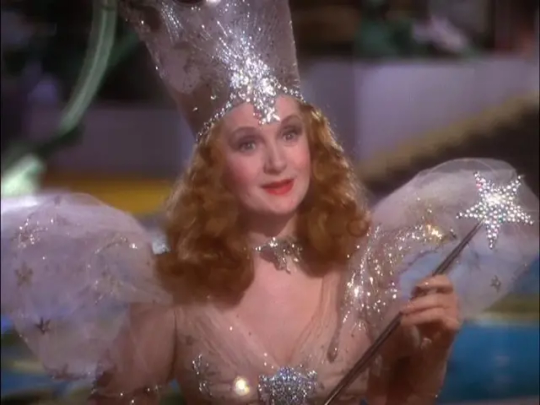
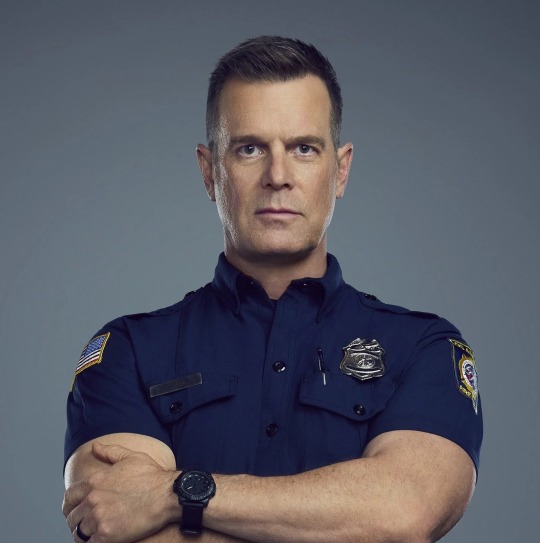
Bobby in my opinion is Glinda the good witch - he shares a lot of traits with her. It is Ginda who helps restore Oz (the 118) to its fully unified state - something that had ceased to be under the Wizard and the wicked witches rule in separate counties. She also tends not to meddle or interfere in Ozian matters unless requested to do so. This fits with bobby’s traits very well - he doesn’t tend to get involved in things unless pushed to do so or asked directly. Much earlier in Oz’s history Glinda also helps redeem the tyrannical king of Oz through the creation of the forbidden fountain and the waters of oblivion - the king drank the water and then forgets his cruel and nefarious intentions. bobby replacing Gerrard at the 118 fits fairly well into this theme.
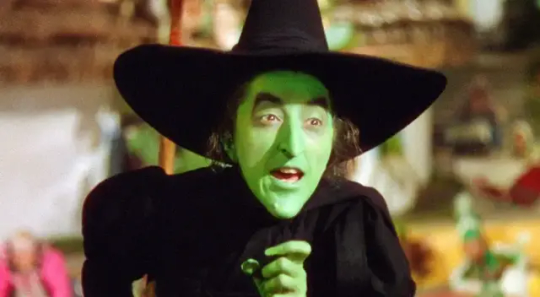
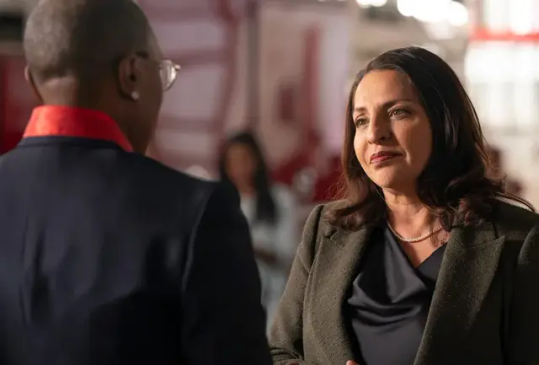
Ortiz is an interesting one - she fits into bot the role of The wizard, as well as the wicked witch of the west. I think that Ortiz is the wizard in part because the name Ortiz can loosely be read a s a play on ‘wiz’ as in wizard, but also because she is the most powerful person in the show right now - and it is all built on lies and corruption - much like the wizard is in Oz! However as the film unfolds we are shown that the witch is in fact more powerful than the wizard, but is also eventually easily brought down. This is why I think she is also a reference to the wicked witch, but also because the witch controls the flying Monkeys - who serve as her lackeys and undertake her bidding.

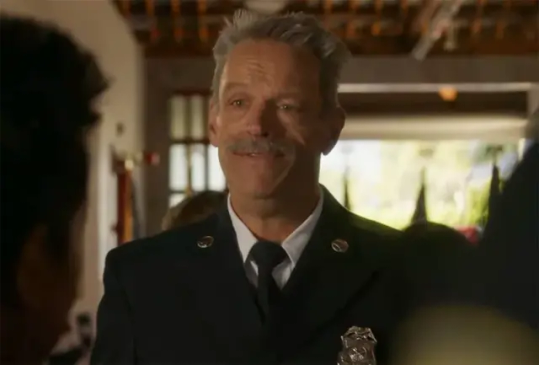
Gerrard is both the Wizard of Oz and a flying monkey. I wrote above about the wizard hiding behind screens and masks and and Gerrard and I wrote about Gerrard building fences around the 118 being reference to the wizard building the emerald city. The flying monkey connection is obvious - he is working under Ortiz.
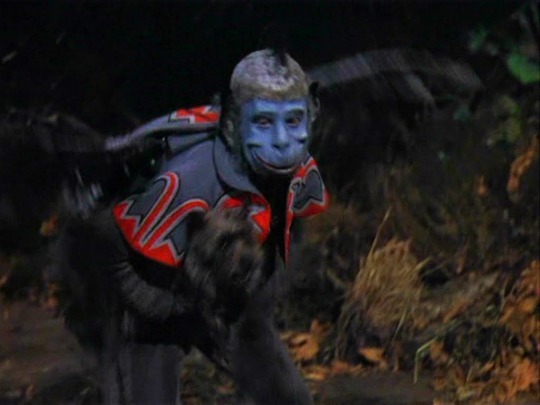
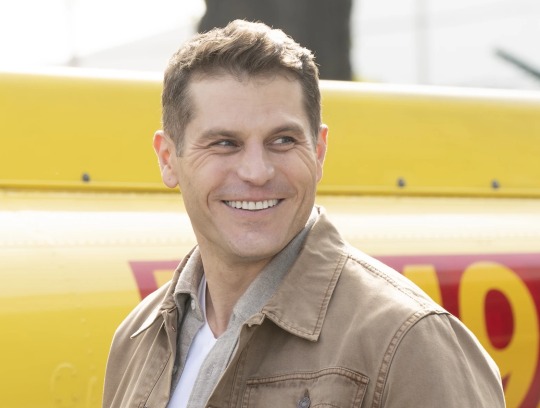
Tommy fits into a couple of different characters. He is in my opinion most closely connected to Chopfyt and Nimmie Amee, but he also fits into the meaning of the flying monkeys. Chopfyt is made up of the parts of the Tin woodman and Captain Fyter (the tin soldier) who are rivals for the attention of Nimmie Amee who is married to Chopfyt but was at one time courted by the tin man and the tin soldier. Captain Fyter and the Tin Woodman become friends during their journey to find Nimmie Amee. The flying monkey connection is perhaps a more obvious of the three, the monkeys are subservient to the wicked witch of the west and in the begins episodes we are shown Tommy being very much under Gerrard wing through his behaviour. It is also worth nothing that the flying Monkeys in the book drop the tin man over shape rocks leaving him so dented he could not move and they pull the scarecrow apart, scattering his straw and throwing his clothes up a tree - Dorothy is able to repair them both with the aid of the Winkies (the people under the control of the wicked witch of the west) and Dorothy then commands the flying monkeys to take them to the Emerald city.
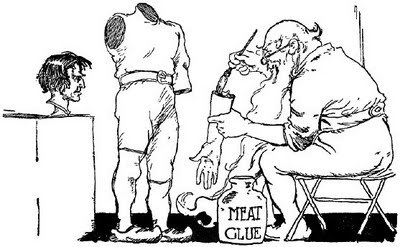
The meaning of these character connections is clear to me - Tommy as Nimmie Amee courts first the tin man (Eddie) and then the Tin Soldier (Buck) but chooses Chopfyt in the long run. Tommy is made up of parts of both Buck and Eddie in the same way that Chopfyt is made up of parts of Tin man and Captain Fyter. The fact neither Tin man or the Tin soldier succeed with Nimmie Amee and that she choses Chopfyt is telling and possibly gives us clues about the eventual demise of Buck and Tommys relationship and suggests that as tommy fits both characters parts (both characters who are fairly small roles in the books and are plot devices - much in the same way as Tommy is in 911), he will ultimately choose himself (as we’ve already seen him do in 705).
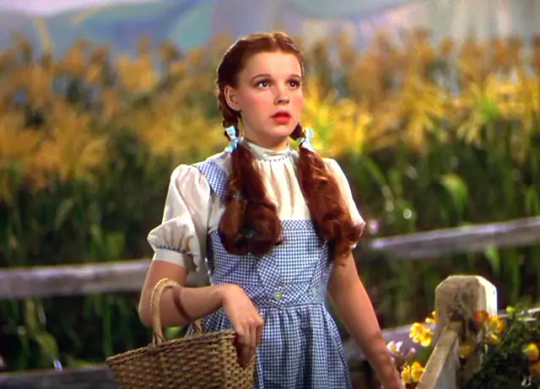
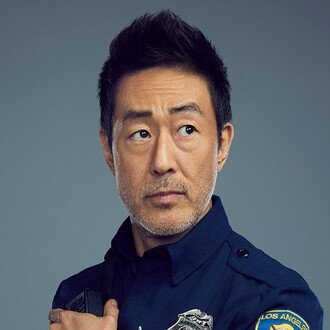
Onto the 4 remaining members of the firefam, and I believe Chimney is for the moist part, meant to be Dorothy - he is the first member of the firefam in the same way Dorothy is, he fits a lot more of the Dorothy tropes from the book than the film shows, he is described as the heart of the 118 - which is basically what Dorothy represents in the books and film - she is the one who keeps everyone together, or brings them back together when they have been separated. And if we follow the theming of Gerrard being the wicked witch of the west, it becomes more apparent - in the books Dorothy is enslaved by the wicked witch and forced to carry out menial cleaning tasks - in much the same way we see Chim being treated by Gerrard in Chim begins. It is Chim who we are shown supporting Hen, Buck, and Eddie as they begin their careers at the 118.
The other thing of note - which currently doesn’t fully work, but will if, as I suspect, the wizard of oz references around Eddie are a part of his Queer journey - is that Chimney is the only one of the four members of the team (we are not including Bobby as he is the captain) who has no queer coding in any way and is in a heterosexual marriage. The reason this is important and plays into the idea of Chim being Dorothy is that the term ‘Friend of Dorothy’ is coded speak for being queer - I explain it further in my meta which I linked at the top of this post - the play is that Dorothy herself is not queer, but that her companions on her journey down the yellow brick road are. Which fits Chimney perfectly - with Hen and Buck being Lesbian and bi respectively and with the Wizard of Oz connections to Eddies storylines across the previous seasons and again in the current season being very loud, it feels fair to assume that Eddie will also sit somewhere on the queer spectrum before too long (and really is the reason behind me writing this insanely long post!)
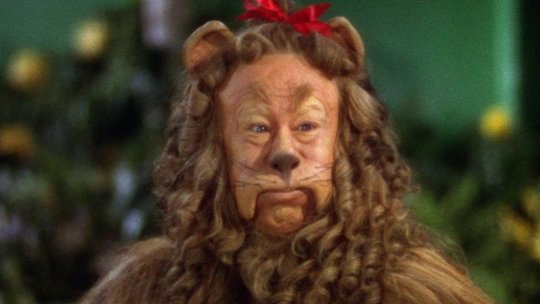
Hen is the cowardly lion. We are shown Hen doubting her abilities at several points throughout the show, but she is arguably the bravest of the 118. The cowardly lion’s favoured companion is the hungry tiger (as I wrote about above - we may well see Karen paralleled with the tiger in 804)
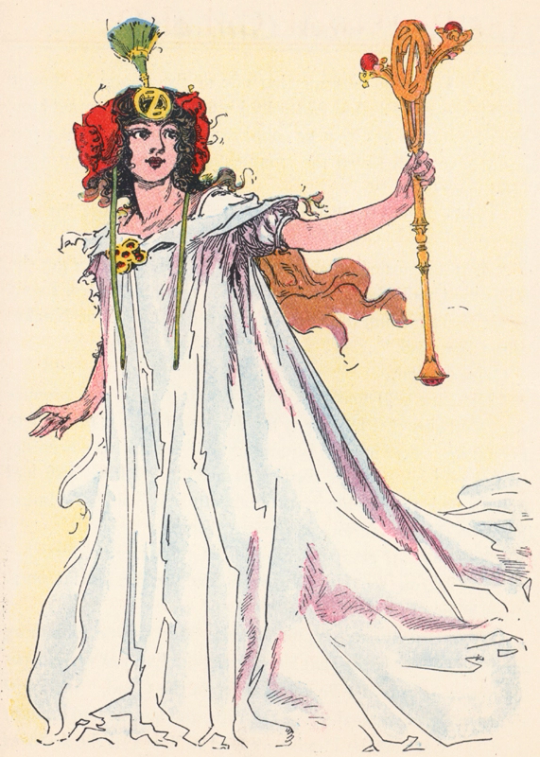
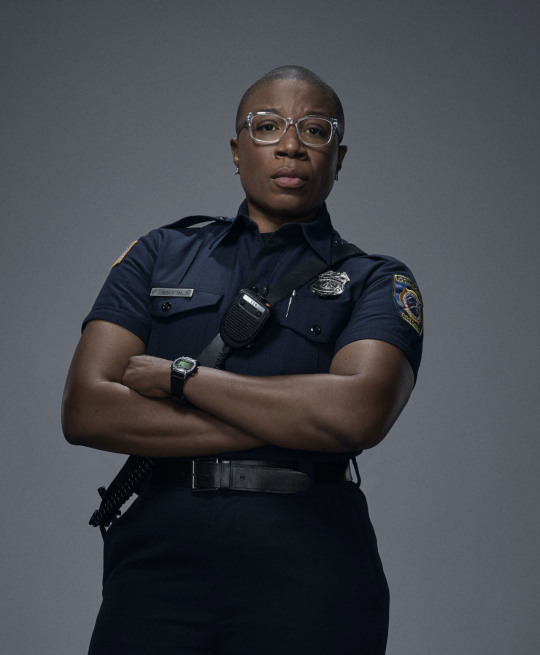
But Hen is also Princess Ozma and this is a far more powerful connection. Ozma is the rightful heir to the throne of Oz and spent much of her childhood in the form of a boy called Tip as she had been enchanted by the witch Mombi until Glinda the good witch discovers the enchantment and forces Mombi to return her to her true form and take her rightful place as ruler of Oz. With Bobby filling the role of Glinda, helping Hen achieve her full potential and the allegory of Hen having to hide herself for much of her life until she becomes a firefighter - the wig we see Hen wearing in Hen begins plays into this idea perfectly - that Hen was disguised but has been freed from that disguise and become her true self.
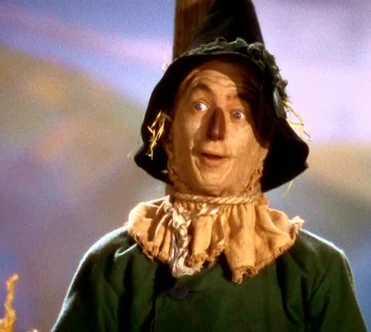

Buck is the scarecrow. But he is also Toto and Captain Fyter. I explained the Captain Fyter connection above in the section on Tommy so I won’t repeat myself here. Buck is toto for a couple of reasons. Firstly we have the connection to the dog in the plane in season 8 who growls at Jordan and Tia tells him that the dog doesn’t like men, he then becomes friendly when Jordan is ill, but we see him returned to Tia when they leave the plane. this is all a allegory for Buck’s bi arc. Tia is Eddie in the scenario and Tommy is Jordan . The dog growling and being protective is akin to Buck growling and becoming jealous over Eddie and Tommys friendship, trying to keep Tommy away from Eddie, but then becoming friendly with Tommy in the same way the dog becomes friendly with Jordan in a therapy dog kind of way before returning to Tia at the end, implying that Buck will always go back to Eddie when it comes down to it. the therapy dog aspect is also interesting as it implies BUck is providing some kind of therapy for Tommy - this could be read as Buck helping Tommy learn and grown (likely in connection with his still undressed past behaviour) - makes him a better person, before they part ways and Buck ‘returns’ to Eddie.
Then there is the wizard of oz references - it is Toto who sets much of the plot of the wizard of Oz in motion - by biting Almira Gulch in Kansas in the film version and by hiding under the bed in fright in the book version. It is Toto who reveals the truth of the Wizard of Oz being just a man, and it is Toto who leads The lion, scarecrow, and tin man to where Dorothy is after she has been captured by the wicked witch (in the film - he is less involved in the book!) and it is toto who stops Dorothy from leaving with the Wizard and ultimately leads to Dorothy learning the slippers she wears can carry her home if she clicks her heels together 3 times and wishes to go home. All of these events either play into Bucks arcs in 911 or will potentially going forward. Bucks impulsive ways could be said to mirror Toto’s impulsive actions in TWoO and it will be interesting to see if being taken under Gerrard wing leads to him gaining information that helps Hen take down Ortiz!
The biggest connection though is with the scarecrow. The scarecrow has long been associated with bisexuality - due to his line in the film ‘of course some people go both ways’. in the book the scarecrow also reveals that he lacks a brain but greatly desires one - he is in fact only 2 days old when Dorothy meets him so he is essentially just naive because as the book progresses it becomes increasingly clear he actually is very intelligent and knows many things. One of the other aspects of the scarecrow is his ability to know his own limitations and in the books he becomes ruler of Emerald city, but hands the crown over to Princess Ozma enabling her to take up her rightful position as ruler of all Oz, becoming one of her most trusted advisors. Most of these are traits that Buck shares with the scarecrow - we see season 1 buck reflected in the naijvtie of a 2 day old scarecrow, but once he hits his stride, we see that Buck is actually very intelligent, full of knowledge (random facts wiki Buck!) and comes up with great ideas - things that are being very clearly demonstrated in season 8 so far. He is also becoming much much better at knowing his limitations and that is something I think we will continue to see develop in the way it does in the scarecrow across the books.
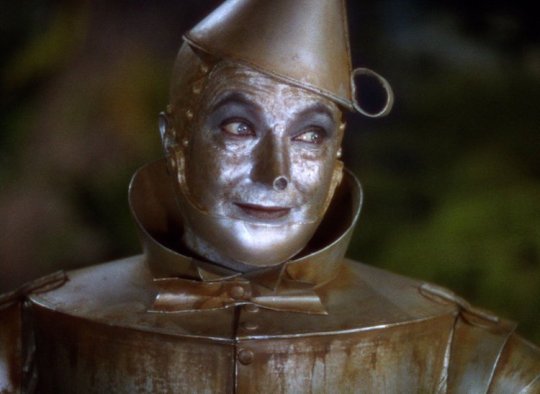
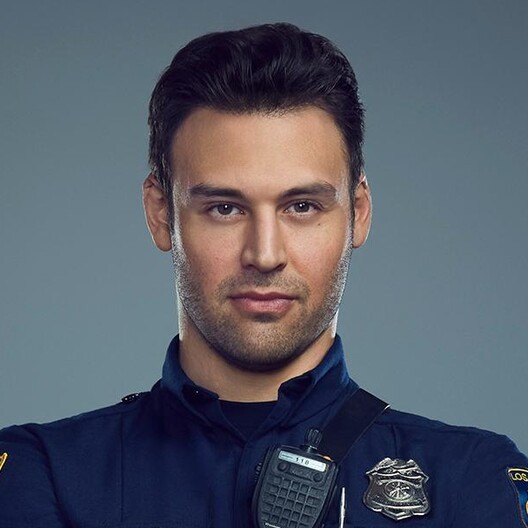
And finally we have Eddie. Eddie is the Tin man through and through. The heart metaphors that surround Eddie - especially in season 5 are a very obvious and direct link to the tin man. and Like I said above the Tin man is the most compassionate, sensitive and tender and caring people in Oz. He is incredibly practical and competent as well and undertakes the scarecrows plans readily. He and the scarecrow pair up a lot across the book series and go on adventures together, their heart and brains combining to lead them to success in nearly all cases. The tin man also becomes a trusted advisor to Ozma and is considered to be a fair and wise person in Oz. These are all things we see portrayed in Eddie. He has this tough exterior, but inside he is very soft and tender and he only reveals that side of himself to those he can trust. Eddies heart is a key part of Buck and Eddies dynamic especially in combination with Bucks brains - we are so often shown Buck having an idea and Eddie carrying it out because he trusts Buck - the perfume bee run is just the latest in a long line of them and it is a key aspect of the Tin man and Scarecrow in the Oz books. I’ve spoken above about the other aspects of the tin man and his connection with various characters, but it really is the tin man and scarecrow dynamic that is at the heart of things in the wonderful wizard of Oz book especially (pun intended!!).
All of it plays into the Oz theming we’re being shown in 911 having an important meaning and it is very much connected to Eddie far more than any other character. One can argue that the books - at their core - are about following your heart and letting it lead you to your truth and to home and that is the very heart of Eddies story. Carla’s line about making sure he’s following his heart and not Christophers rings very true, and we’ve reached a point now where Eddie has to follow his own heart, because Christopher is not in the picture and they’ve chosen to go very very hard with the wizard of Oz metaphors - building on the foundations they already created in previous seasons and now being able to bring them to fruition.
I could literally write about this all day, but this is already ridiculously long and I'm not sure it even makes sense at this point! It was only supposed to be a short post! So I’m stopping here and letting you all go back to your lives - thank you for reading especially if you've made it this far! and let me know your thoughts!💜💜💜🐝🌪🌈
Tagging a few random people just in case they're interested! @buddiediaz118 @buddie911abc @fruityfirehose @sunflowerdigs
@spotsandsocks @livingwherethesidewalkends @satvojihusana @inell @eddiedisasterdiaz @lemotmo @courtjestermerlin @lover-of-mine @lovecolibri
#kym writes very long meta!#long meta#sorry this wasn't meant to be this many words!#911 does the wizard of oz#911 abc#911 meta#the wizard of oz#the wizard of oz and queer narrative#eddie diaz#evan buckley#buddie#anti bucktommy#anti tommy kinard#911 spoilers
280 notes
·
View notes
Text
Fish: A Good Omens Sex Meta Thing
A deep dive meta on fish and that deathless death.
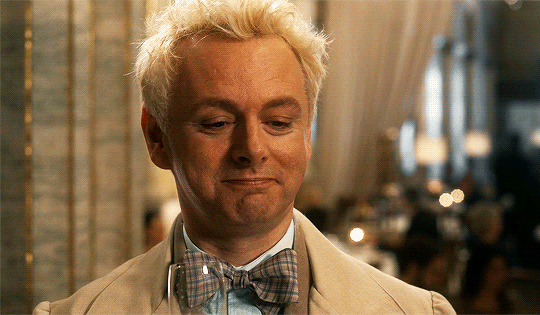

NSFW under the cut. TW: Mention of Satan's attacks on Crowley. Also for those who asked me for more on the Ineffable Husbands and trauma-informed partnership.
Aziraphale, listen to me. The supernatural world? It's a mess. Life under the sea is better than anything they've got Up there...
This is basically the requested "Crepes 2" but you don't have to have read that first. I did link it at the bottom if you have not and you're interested in more meta like this one. Thanks for reading. 💕
Couples. Romantic and/or sexual partners who have an understanding of a mutually-agreed upon level of commitment to one another and their relationship. Frequent celebrators of special occasions.
"A team-- a group; group of the two of us." A couple.
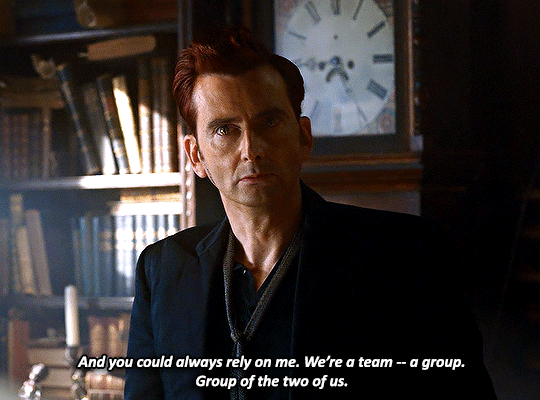
Special occasions. Notable life events celebrating milestones and past days significant to a couple's relationship.
"For special occasions." Why Aziraphale bought one dozen cases (144 bottles) of Chateauneuf-de-Pape in 1921, as he either tells or reminds Crowley on the walk to the bookshop in 2008. Only "a few bottles" were still left at that time, according to Aziraphale, after 87 years of Crowley and Aziraphale celebrating special occasions enough times as an unofficial couple between 1921 and 2008 to have drank almost 144 bottles of the wine they only drink on special occasions.
Wedding anniversary. A special occasion; the "big one" of a married couple's special occasions. Celebrated annually by married couples as a romantic day that honors their commitment to one another. In S2, the day of The Meeting Ball is the night that Armageddon: Round Two gets underway. It is also the wedding anniversary of...
Mutt and his beloved spouse. The lovely magician who owns Goldstone's Magic Shop in 2023 and his beloved spouse, who is dry-witted, trans and had on a dress the color of Crowley's eyes at The Ball. Paralleling characters to Crowley and Aziraphale.
Anniversary. For partners who are not married, usually celebrated as a day of significance in their romantic relationship, chosen for its importance to them. Almost always related to a "first" in the relationship, like the day they first met or on which they had a first date.
"This is The Big One, Crowley..." What Satan (while impersonating the voice of Freddie Mercury) said to Crowley about Armageddon while assaulting him in 2008, on the night Armageddon: Round One began. Crowley was supposed to be having dinner with Aziraphale at the time.
The 1.01 sushi scene. Our re-introduction to Aziraphale in 2008. A series of indicators that we learn throughout the course of the season teach us that Crowley was supposed to be with Aziraphale in the Japanese restaurant on this night before he was delayed by Hell, assaulted by Satan, and forced into helping to start Armageddon.
Various scenes in S1 show us that Crowley always comes up on the same side of Aziraphale if he is approaching him from behind when meeting him but we don't yet know that in the first scenes of 1.01. As a result, we might not immediately realize that the reason why Aziraphale opens his eyes and looks to his left after hearing a miracle chime in this scene is because he expected that it was Crowley arriving to meet him after having been running late. In reality, it turned out to be Gabriel on his right-- which Aziraphale first sees in a mirror and which will be mirrored in additional scenes in the show (Crowley dragged to Hell in 1827 and the Gabriel statue on the other side of Aziraphale, etc.). Dialogue from the scene set the next day in St. James' Park that we will look at later on in the meta also confirms that Crowley was supposed to be with Aziraphale in the 1.01 sushi scene.
The sequence of scenes at the start of the 2008 minisode also sets this up by giving us Crowley alone first and letting us revel a bit in how fun he is and like him even more. The contrast with Hastur and Ligur establishes for us that Crowley is about a trillion times smarter and more enlightened than these guys. It's the second scene with Satan, though, that exists to show us that while some of the demons are just idiots, demonic life for Crowley is actual hell.
The "Bohemian Rhapsody" he so endearingly rolled up blaring in The Bentley comes back and now takes on a nightmarish tone as Crowley receives instructions from Satan while driving The Bentley and we learn that Satan can possess him at will and Crowley's sunglasses-- even in the dead of night while driving alone-- start to make more sense. They're a defense mechanism but he's actually defenseless in the face of this threat. It's from watching Satan get in-- through the radio, taking over the music, speaking through the voice of a non-evil entity, jumping through the air and through Crowley's sunglasses through his eyes and into his mind and rendering his body immobile while he's driving The Bentley-- that we are taught the core of what it means to be a demon in Good Omens.
The demons belong to Satan, in Satan's view. They are part of his collective of souls who exist to serve him. They are not individual people existing independent of him. There is no such thing as bodily autonomy in Hell.
What Satan does to Crowley in 1.01 is a metaphor for sexual assault. It's a forcible attack on his body against his will and without his consent. Though the scene is mercifully short, we are left with the awareness that it is short for reasons of the plot in this instance-- because Armageddon is beginning and the purpose of the attack in this moment is to give Crowley directions on delivering the antichrist baby. The scene, though, shows us that Satan can do this to Crowley whenever he wants and Crowley-- an otherwise very powerful being-- has no known defense against it. Crowley is unsurprised by it and that, plus all his various defensive layers already in existence in 1.01, show that it has happened before. Crowley has been on Earth for 6,004 years in 2008 and the implication here is that these assaults have been happening periodically the entire time and are among the issues most responsible for the PTSD symptoms he shows throughout the show.
It's off of this assault, though, that we segue into our re-introduction scenes of Aziraphale in the present and they are, at the start, the exact opposite of this nightmare that Crowley is living. As Crowley is attacked in his car on a dark road alone at night and then has to narrowly avoiding killing a man in an oncoming truck, we move over to Aziraphale's world, not yet realizing that this is the world that Crowley lives in when he can get away from Hell-- that it is actually their world together.
Aziraphale is presented with the sushi from his friend who has prepared it specially for him and we listen to Aziraphale thank him. The Italian of "Bohemian Rhapsody" (symbolic in this moment of Dante's Inferno and Hell) gives way to Aziraphale speaking Japanese (symbolic of mindful living.) The tone is all kind and gentle-- respectful and peaceful. We then get what is, really, the exact opposite of what just happened to Crowley, which is Aziraphale taking a slow breath with his eyes closed, inhaling the scents of the brine of the fish and vinegared rice and the herbs, and centering himself in the present moment as part of the experience of enjoying his meal.

The immediate contrast is drawn between Satan-- Crowley's rapist, who terrorizes him-- and Aziraphale-- Crowley's partner, who loves him, and with whom he has the kind of consensual, mindful, sensual experiences he was supposed to be getting up to on this night when Armageddon began instead.
In S2, the importance of the sushi scene from 1.01 returns as it is mirrored during the attack on the bookshop. Once again, Crowley is away from Aziraphale when he should have been there by that point and Aziraphale is worried about him. Present instead is, once again, Gabriel. This time, Gabriel has undergone a bit of a Jim journey. (Aziraphale offering him hot chocolate instead of tea in 2.01 was also set up by the sushi scene, as it's off of Gabriel being grossed out by the "rose matter" tea, showing again how important the scene is.) In S2, Gabriel is with Aziraphale again, this time pushed back further into the bookshop, and where are they in the bookshop-that-represents-Aziraphale during the sushi scene mirror? They're upstairs, on the landing.
Specifically, they're just inside the top of the stairs in front of a room, the door to which we are shown several times in S2 but which we have not yet seen open.
We have gone into the room next door to it-- that's the guest bedroom, where Gabriel stayed during the season. By process of elimination and out of an idea of convenience here, the room we haven't been inside of that is located at the very top of the stairs is almost certainly Aziraphale's bedroom. So, we've gone from S1 and having Gabriel show up unexpectedly while Aziraphale mistook him for Crowley while he and Crowley were supposed to be having one of their sexy meals together to S2 and Gabriel now there in the mirror scene in front of their bedroom, drawing a bit of a correlation between what these two scenes are both about.
There's also something symbolic to the idea that S2 uses invitations and doors and rooms in the bookshop to symbolize Aziraphale himself and who he lets in and whose voices he is, for better or worse, listening to at different times-- with his mental health crisis being symbolized by the bookshop being essentially overrun to a point that anyone can now get in. The one room that is shown to us but the door to which never is opened in S2 is the bedroom door. The bookshop can get overrun and others can get deeper into it than we've seen before-- demons in the living room, Maggie and Nina and Gabriel upstairs and in the back kitchen table area like the family they've become-- but the bedroom door stays closed because only Crowley and Aziraphale are allowed in there. No one but them can open the door. Metaphorically-speaking... and probably literally as well.
As the sushi scene is paralleled in S2, we get Shax there bullying Aziraphale. Shax is jealous of Aziraphale and his relationship with Crowley and she also fails to understand it because she sees Crowley as a demon like her and presumes he's as dark as she is, having no idea that Crowley's demonic schtick is an act to survive. She gives voice to these questions (and to Aziraphale's most illogical self-doubts-- but self-doubt is never logical...) when she asks:
"Aziraphale, what *are* you? Crowley's emotional support angel? The softest touch? The one who went native? Do you need more big, human meals, Aziraphale? Shall we send up *the sushi*?"
Shax is actually doing something here, language-wise, that the show first did with Hastur in 1.01, and that's making them both useful idiots when it comes to language. Remember Hastur's mistranslation of "ciao" as Crowley leaves the graveyard with the baby? What Crowley said was, as we know, Italian-- Hastur got that bit correct-- but instead of translating it in his mind as meaning the "hello"/"goodbye" that "ciao" means in Italian, he confused it with its homophone of "chow", which he said "means 'food'." It does but in an informal way or in reference to food given to animals.
This is darkly ironic in the scene because of where Crowley is headed in the next scene-- and where he's supposed to be during both scenes. He's supposed to be "chowing down"/having food-- having dinner-- with Aziraphale and food is, as we'll learn over the course of the 2008 minisode, euphemistic for sex in Ineffable Husbands Speak and symbolic in relation to it in the show itself overall. Instead, Hastur isn't entirely wrong when he translates "ciao" as "chow"-- and he might have done so unconsciously in his mind because he knows Satan is going to contact Crowley with instructions soon. He sees Crowley as "chow"-- in the sense of food fed to the animal that is Satan.
In 2.06, while Crowley is taking Maggie and Nina to safety outside the bookshop, Satan is mentioned when Shax demands that Gabriel and Beez be given to her to take "as gifts for Our Master Satan." Dagon-- Head of the Dark Council and not known for mincing her words-- replies that Satan "wouldn't want them... maybe as hors d'oeuvres." Not a single person in the room-- which contains almost every major non-human character in the show shy of Crowley-- disagrees with this assessment. Rape is not about sex-- it's about power-- but in a show that uses food as euphemistic for sex on several different levels, Dagon's comment is chilling.
It not only takes the attacks on Crowley that are already a metaphor for sexual assault and codes them through food in such a way that the feeling you get from the 1.01 Satan scene-- how it comes with an implication that the assaults aren't always a delivery of instructions-- is correct and that, unsurprisingly, Satan is a rapist in every way possible, but it also sees someone who would know in Dagon state that Satan would not actually care that much about Gabriel and Beez. He'd rape 'em, sure, is what Dagon is saying. He's Satan. But they would be just hors d'oeuvres. They're not who he's really fixated on.
The Grand Duke of Hell who betrayed him and their former Supreme Archangel partner are not interesting to Satan is Dagon's statement and not a single person in the room challenges that. No one says anything about it and the scene is deliberately structured so Crowley is not in the room when it's said to create this reaction in the others... the implications of which are just horrible where Crowley is concerned.
Back to Shax in the bookshop attack scene...
Shax parallels Hastur here because they are using her lack of language skills to highlight something to us by what it is that she doesn't understand. Much like with Hastur unintentionally spelling out what's really going on through mistranslations of words, Shax is trying to bully Aziraphale and she's tossing insults at him that are, actually, in the alternative meanings of what she's saying, the answers to the very questions she's been asking.
"Aziraphale, what *are* you? Crowley's emotional support angel? The softest touch?..." In insulting Aziraphale, Shax is using Crowley's mental health issues as a way of insulting both of them here, which shows how Hell obviously isn't exactly the most trauma-aware place. She's obviously saying that Crowley is comparable in mental health issues to humans (whom the demons see as beneath them) who have a need for emotional support animals. Like Hastur with the "chow", there's an animal comparison being drawn beneath the words used here but instead of the ominous lead-in to Crowley being attacked in 1.01, in S2, we have it about Crowley and Aziraphale, not Crowley and Satan.
So, Shax is calling Aziraphale Crowley's pet, right? And then she calls Aziraphale "the softest touch", which is a phrase meaning someone who is really gullible. What Shax doesn't realize is that the other, human-derived meanings of what she just called Aziraphale are the answer to the question of what Aziraphale is to Crowley.
In British slang, "pet" is a term of endearment. To pet someone is to touch and kiss in a way meant to be sexually arousing-- as in, "heavy petting."
The softest touch. This is, quite literally, the definition of a caress.
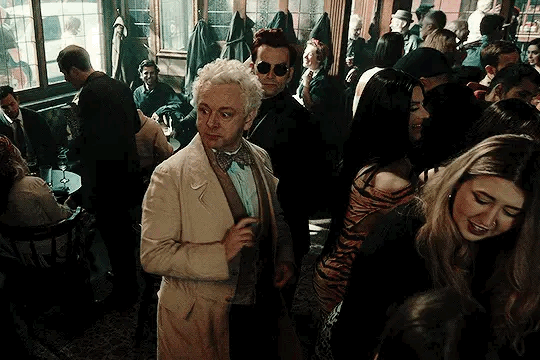
In S2, Aziraphale pats his and Crowley's pet-- The Bentley-- but he pets Crowley. The only time he tries to actually pet The Bentley is when he's semi-jokingly making it a sexual metaphor for Crowley. It underscores that Shax is almost there in getting it-- she's just not quite understanding the meaning of her own words-- which are words that, like Hastur's ciao/chow moment, exist to tell *us* something in how we look at them more than to tell the character speaking something.
In effect, we get a whole scene in S2 that parallels the 1.01 sushi scene by defining some more what it's really all about through Shax not quite fully getting it. What is Aziraphale to Crowley? is her question and the answer is the softest touch, just in the other meaning from the way that Shax says it. Aziraphale is kind to Crowley and gentle with him. He's the mindful sushi night in the face of the horror chow of Hell. They love each other. It's soft and sweet and that's why Shax has trouble understanding it-- it flies in the face of what she thinks the demon Crowley would want because of the reputation Crowley has sold everyone on regarding who he is, which isn't who he really is at all.
"The one who went native. Do you need more big, human meals, Aziraphale? Shall we send up *the sushi*?" Aziraphale is the angel who "went native"-- he lives a mostly human existence with Crowley alongside the humans. Shax clearly doesn't eat that much as no one has ever called sushi a "big meal" lol but besides that bit of humor aimed our way, this is more tying of food to sex. Aziraphale likes food and he likes sex and in Ineffable Husbands Speak-- which Shax does not speak-- food is euphemistic for sex. What's unnerving about this scene in this moment is that it plays like the later scene between Maggie and Shax does-- as if Shax is reading the thoughts of the character she's bullying and lobbying them back at her. She might well be doing this here and that's why the sushi comes up-- Aziraphale is thinking about it because Crowley should be here and isn't and Gabriel is right near him instead and it reminds him of 2008. (This wouldn't be the only callback to S1 in this sequence, either; there's Aziraphale explaining the fire extinguishers to Nina not that long after this.) Either way, it's writing designed to directly correlate this part of the bookshop attack with the 1.01 sushi scene to further underline what the 1.01 scene is about.
Okay, so, let's look then at why we're so into repeating bits of this sushi restaurant scene in GO and what it tells us about Crowley and Aziraphale's story by what other scenes it ties to...
As the 1.01 episode continues, we get another scene pretty soon after the sushi scene which adds another layer to this by recontextualizing our understanding of the sushi scene-- that's their lunch at The Ritz the next day, in which we learn that Crowley is rather into watching Aziraphale eat and Aziraphale loves it. This then helps to explain Aziraphale's look in the sushi scene when he turns to look in the direction of where he thinks Crowley will be on the left, before it clicks that Crowley is not there and he sees, instead, Gabriel on his right via the mirror on the wall.
Aziraphale hears the chime with his eyes still closed. His eyes are then still on the food when he reopens them and he hasn't had time to see that Crowley is not beside him before he turns in that direction and this is the expression on his face as he does:

That is a pretty sexy little look that was indisputably supposed to be given to Crowley...
In the later scene where they're at lunch at The Ritz, we come in on their meal at the end of it. Aziraphale is on the last forkful of his dessert and we get the idea of kinky lunch from what we see on the tail end of it. But before it? Back at the start of the episode, set the night before? We see that everything that happens the next day at The Ritz actually happens because they weren't able to be together the prior night. It will also help us to understand how Crowley knows about "the fascinating little restaurants where they know" Aziraphale in the St. James' Park scene.
The 1.01 sushi scene tells us that, by 2008, they sometimes sneak out to a quiet, dark place where they think they won't be seen to have dinner together.
What's most notable about the set of this scene in the sushi restaurant is the shocking brightness of one color in particular.
The scene leading into it, as we noted, is Satan's attack on Crowley in The Bentley and that scene is, appropriately, very dark. It's pitch black night outside and Crowley, in his perpetual black clothes, half-blends into the night around him. Flecks of grey and silver are the main sources of light in the scene. The same color scheme tips into the Aziraphale sushi restaurant scene-- with two exceptions. The silver grey remains (Gabriel) and so too does the thick, black darkness but there is more light in the restaurant and it shines over Aziraphale. He looks bright against the black darkness, even though he wears beige. He is the light that is missing from Crowley's scene. But that's not the shocking color to us in the scene. That's the one that saturates its way through the darkness around Aziraphale. That color is...
Pink. The color you get when you mix white (Aziraphale) into red (Crowley). Traditionally, a color of love, romance and health.
Pink plume. The energy field emanating from the bookshop when Crowley and Aziraphale performed a miracle together to protect Gabriel in 2.01. Also: part of Mrs. Sandwich's hair accessory during The Meeting Ball. Mrs. Sandwich represents sex and healthy communication in 'The Whickber Street Shopkeepers and Traders Represent The Stuff of Life' thing the show has going on.
"In the pink." A phrase meaning "in good health."
1967. Flashback scene in the 1.03 Cold Open in which Aziraphale gives Crowley holy water and they discuss their relationship-- specifically, trying to be more openly together. The scene is drenched by the pink light from the sex shops (one called the "Love Shop") that were then in the spot where Give Me Coffee or Give Me Death (symbolic of freedom) is in S2.
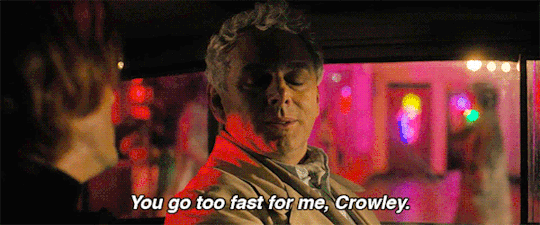
Jane Austen. One of the most famous writers to ever live (sorry, Crowley, but she is lol.) Writer of romance novels. A human that both Crowley and Aziraphale knew in the early 1800s. As Aziraphale brings her up to Crowley while they are talking about romance, pink floods the frame through the clothes on the extras in the wider part of the shot besides him. Pink is also present throughout this scene in general, which already parallels 1967 via it being related to set up, The Dirty Donkey and Crowley's turtleneck.
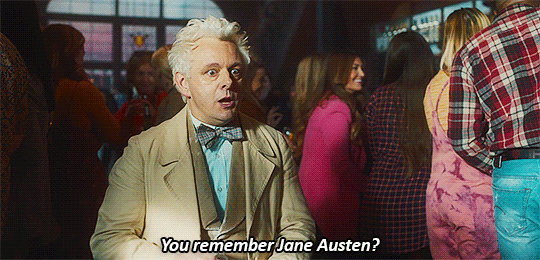
Back to the pink-dipped sushi restaurant in 2008... what else do you notice about this scene that is familiar, now that you've seen all of S1?
Maybe that Aziraphale is actually sitting at a bar? And thought Crowley would meet him there, so they would be sitting at the bar together? Aziraphale also had just spoken at the start of the scene with the restaurant person on the other side of the counter. Where have we seen one of them doing something like that before?
That other rather fish-oriented scene: Rome. 41 A.D....
Rome. 41 A.D.. Aziraphale runs into Crowley in a tavern in Rome. Crowley is miserable and not having the best day of his demon life. Frustrated by the temptations he's been sent to perform for Hell that have him enabling horrible men in the Roman military, he's lonely, tired and grouchy. This initially was worsened by the arrival of Aziraphale, whom Crowley always loves to see but who, in that moment, was a reminder of how broken Crowley felt.
PTSD. Post-Traumatic Stress Disorder. A psychological condition brought on as a result of experiencing the psychological shock of a traumatic event or events. Some symptoms of PTSD include disturbed sleep, difficulties feeling safe, difficulties trusting yourself and others, anxiety, depression, and intimacy issues.
"In the pink." Remember the phrase meaning "in good health'"? Not a lot of pink in the Rome scene... initially. 😉
"Salutaria." What Aziraphale says in toast as he and Crowley clink glasses. Means "to your health." Crowley clinked glasses but quickly looked away, leaving Aziraphale thrown in the moment as to why Crowley was not rejecting his presence entirely but seemed uneasy and was putting up some walls between them that he had not in this way up to this point.

So, why was Crowley doing that?

Anorgasmia. Modern, clinical umbrella term for all issues relating to disorders surrounding an individual's ability to orgasm. If physical or medicinal reasons are eliminated, however-- as they often are-- then anorgasmia is a psychological mind-body disconnect.
Not an arousal disorder. Sufferers of anorgasmia still experience desire, compounding the impact of the disorder.
Secondary anorgasmia/situational anorgasmia. The inability to orgasm unless under certain conditions, such as through self-stimulation (masturbation). The inability to enjoy partnered sex. Extremely common in rape/sexual assault survivors.
(Diagnosis for anorgasmia are related to biological sex but Crowley is able to switch that at will so he'd be both of these, which are fundamentally the same thing.)
Hot Water Boiler. Device which heats up water in a house or apartment. In S2, a metaphor for anorgasmia.
In S2, Shax is living in what used to be Crowley's apartment and asks him if he knows how to fix the hot water boiler, as it has "two yellow lights" and isn't working. The point is that this used to be Crowley's apartment. Crowley, in 2023, knows how to get beyond a bout of it. He's fixed his own metaphorical hot water boiler-- and also the literal one when he used to live in that apartment. And while he's being sarcastic because Shax won't stop hounding him and Aziraphale, he's also giving her the most sage advice he knows, as he has continuously been doing during the season. In this case, it's to self-love a bit (which is actually prescriptive for anorgasmia in our modern times as well.) That he does is suggestive of the prior issues with secondary/situational anorgasmia.
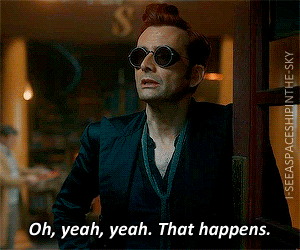
Alcohol (in Ineffable Husbands Speak). As we looked at in the Crepes meta: Surface layer: alcohol. Hidden language layer: Sex. Quite extraordinary amounts of alcohol. An extremely alcoholic breakfast at The Ritz.
Whiskey. Alcohol. What Crowley orders in a bar. Usually Talisker, which is a single-malt scotch. (Scotch being whiskey made in Scotland.)
Broken bottles of whiskey. What was in the case Crowley brought Mrs. H in 1941 at the start of the sexual metaphor that is The Bullet Catch.
Trauma-informed partner. Modern term for a romantic and/or sexual partner of a trauma survivor who is aware of the pervasive nature trauma can have on a person and who endeavors to provide a sense of safety-- physical, psychological and emotional-- for their partner and to create a relationship centered on healing and recovery, rather than one that causes further distress.
Frequently survivors of one or more forms of abuse themselves, as Aziraphale is. Not expected to be perfect but just to do their best by their partner.
Characteristics of trauma-informed relationships include kindness, empathy, mindfulness, gentleness, well-earned trust, a sense of playfulness, and a well-developed shared sense of humor. (Sound familiar? 😊)
The Bentley. Crowley's car and Linus blanket. As sexual metaphor, when Aziraphale is feeling cheeky: Crowley himself.
Driver's license. Documentation that must be obtained in order to operate a motor vehicle. Requires permission, experience, necessary skills, and willingness to learn. In London, not originally necessary to drive upon the invention of cars, until everyone realized what an absolute disaster that was. Aziraphale long ago passed his test and has had a driver's license since shortly after Crowley bought The Bentley. They did not require licenses at that time but always-eager-to-be-thorough Aziraphale made them give him a test to be sure he was truly qualified to drive.
As sexual innuendo: Crowley, we're absolutely ridiculous. You won't give up your car and I wall myself off in a fortress of books I can't part with but you've been "in my bookshop" and I've been "driving your Bentley" for an absurdly long amount of time. We even swapped bodies a few years ago. It might not actually be possible to be any more intimately familiar with a person than we are with one another and we both know I had these car keys the moment I asked for them so hand them over. No one was exactly a trauma-informed partner in those days but I was-- aren't I marvelous?😉I'll treat your car as gently as I treat you. Give me the keys or I will just keep going until I run out of car sex innuendo and I should warn you that I have lots more...
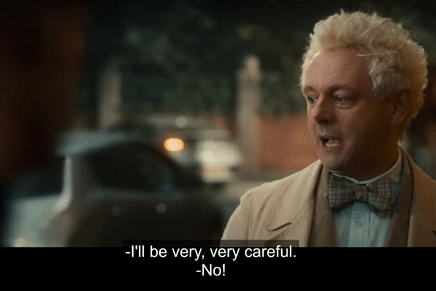
Trauma-informed partner. Aziraphale.
Mindfulness. A state of mind that focuses on being in the present moment by being conscious of one's thoughts, emotions, and bodily sensations. A state of the mind being connected to the body and experiencing the present moment consciously and fully. Frequently used to help combat PTSD, anxiety and depression. Also frequently used as a therapeutic intervention for assault survivors experiencing intimacy issues.
Aziraphale and Crowley smelling the magic shop in Season 2 and Aziraphale inhaling the scent of the sushi in 1.01 are both examples of mindfulness exercises. The sushi scene is tied to sex, as the food kinky thing is a form of foreplay, suggesting a focus on sexual mindfulness in bed.
Mind-body connection. What is in need of repair in sufferers of situational/secondary anorgasmia. Sexual assault causes the body to associate a loss of control with being under threat. Whereas people who have not experienced a violation of their bodily autonomy tend to respond to sexual stimulation with a response of pleasure, those who have been hurt have bodies that are wired to react to being touched or to feeling out of control as if they are under threat again, even if they are intellectually aware that the new situation they are in is not dangerous. What is arousing for others can cause a sense of anxiety instead of pleasure. There is also the risk of flashbacks to being attacked.
Healing the mind-body connection requires a trusted partner with whom the person suffering from anorgasmia feels safe and who is willing to help keep their partner in the present moment and help them "re-wire" and recover their body through new, positive experiences.
Asmodeus. The Demonic Prince of Lust. Crowley. A persona to have in Hell to give him big reputation that didn't involve him having to kill anybody and that also acted as a cover for his anorgasmia.
"Crowley." What Crowley asked Aziraphale to call him in 33 AD, just 8 years prior to Rome. An admittance of being mad about Aziraphale.
"What am I supposed to be, an aardvark?" In Rome, as Crowley grows nervous by this wine-drinking Aziraphale who also has nothing to do for the evening that has shown up in his world on a miserable day, he responds to Aziraphale's "still a demon, then?" nervous chatter with a line of his own, asking what else he was supposed to be? An aardvark? Of course, if Crowley was not a demon, being with Aziraphale would be easier and he wouldn't be in this mess in the first place but an aardvark is not just a random animal that Crowley thought up here.
Just prior to this moment, Aziraphale had approached him with "Crawley-- Crowley" and a soft smile. It wasn't actually a mistake on Aziraphale's part but a silent question: is it still alright to call you that? Thanks to S2 and the Job minisode we can see the 33 A.D. scene- in which Aziraphale learns of Crowley's new name-- in a different way. We see it as Crowley romancing Aziraphale a bit-- responding to Aziraphale being obviously a little jealous of Crowley's reputation as the wild Asmodeus with a whisper of how he'd changed his name to "Crowley"-- something that we know now that only Aziraphale understands. In Rome, eight years later, Aziraphale is asking by saying both names if that's still something Crowley feels-- and silently saying he hopes it is by subtly asking and by flirting with him a bit.
Crowley doesn't object to Aziraphale calling him "Crowley" and that encourages Aziraphale to join Crowley, who sends signals that he wants his company, even if he's grouchy. Maybe especially because he's grouchy. He can be grouchy around Aziraphale, who is his friend and will listen.
Aardvarks. Primarily eat ants and termites. In the insect metaphor in the show, humans are ants. (The "ants go marching" of The Flood scene.) Demons were hornets in this analogy but also flies and one could assume that termites might also be a good demonic insect analogy, as termites eat decaying plant material and demolish the dying down into the ground. Since food is sexual metaphor on Good Omens and living creatures are metaphorical in multiple ways, being an aardvark then is being someone who both fucks and kills other demons and humans. Being an aardvark is actually a good metaphor then for what's expected of Crowley in Hell and he obviously has some issues with it.
He doesn't want to kill anybody and he's sitting there wearing Roman military regalia, having been sent by Hell to facilitate some death and destruction in a way that he hasn't been able to Bildad his way out of this time. Aziraphale's presence is always welcome but Crowley's crabby in this moment because he knows Aziraphale is in a place by this point where he wants to sleep with him and they just ran into each other in a tavern and both clearly have the night free and now Crowley's got to decide if he's going to tell the angel or not that he's a disaster of an aardvark.
Aphrodisiacs. A substance purported to increase sexual desire. Named for the Greek goddess of sexual love and beauty, Aphrodite, who has been depicted since antiquity usually nude and on the shell of an oyster (or, occasionally, a scallop), as both are two of the oldest purported aphrodisiacs known to man.
Oysters. History's foremost food-related aphrodisiac... though that's not really proven. A few years ago, Italian and American scientists did a joint study to attempt to prove if oysters really did increase virility. What they found was a very minor increase in testosterone in men brought on by one of the compounds of oysters (which is also found in some other kinds of shellfish.) The difference was so small, though, that the scientists determined that an individual would have to consume a lot of oysters (like, a bucketload) to notice any significant difference. In other words?
Whether it works or not is, like with almost all aphrodisiacs, in the mind of the individual. If you believe it will work, it likely will. It's mind over matter. If you want it to work, it probably will. Thematically, an interesting thing to throw in a scene involving a character deciding he's in a place to work on overcoming psychologically-based anorgasmia.
The ancient Romans were obsessed with the oyster-- particularly the soldiers of the Roman military. Much of the cultural awareness of oysters as having a reputation today as being sex-boosting food is actually rooted to the beginnings of that trend in ancient Rome. Both Crowley and Aziraphale would have been aware of the reputation of the oyster in 41 A.D. and Crowley wearing military regalia might have been one of the reasons, in particular, that Aziraphale chose oysters as an euphemism to convey his meaning.
Oysters. Fish. To eat them, you have first got to get them out of their protective shells.
Adam and Eve. The first humans and the other inhabitants of The Garden of Eden. Parallels to Crowley and Aziraphale. Eve gave Adam food-- showed him the pleasures of eating the apple. It sent them on a path of sensual exploration and Adam, freed by Eve showing him food, gave her sex in return.
The other two in Eden at the time-- The Angel of the Eastern Gate and The Serpent of Eden-- are actually no different.
Crowley tempted Eve but Crowley also parallels Eve to Aziraphale's Adam. Crowley encouraged Aziraphale to try the ox ribs and unleashed the raging hedonist that Aziraphale can be. Rome in 41 A.D. is Aziraphale then realizing just how much they are Adam and Eve. (Something that they become aware of over time and is at the root of things like Crowley dryly saying that it's "time to leave The Garden" in 2019 in S1, when they leave a park to go have kinky lunch together.)
By Rome, Aziraphale is now a devoted gourmand. He also drinks now; he's tried wine at some point in the interim years between the Job minisode and this scene. (This is the first scene in which both Crowley and Aziraphale drink and the first time we see them share a toast-- something that becomes symbolic of them as lovers in scenes in the future, like its parallel scenes in 1941 and 2019-- furthering the suggestion of Rome as the start of their sexual relationship.)
Aziraphale might be in Rome on Heavenly assignment but that's not what he mentions to Crowley, if he is. Instead, he talks about Petronius, whom he assumes from Crowley's military clothes that Crowley will know and whom Crowley does. If referring to, as we suspect, Gaius Petronius Arbiter, then Aziraphale is referring to a being so queer even the historians can't get around acknowledging it-- a courtier who was the taste and style maker of the Roman empire, and who is believed to be the author of The Satyricon, which is basically the foundation of satire in literature but also famously contains a whole chunk of it that is just basically erotica.
Some details of Petronius' life are a little vague so Good Omens is exploiting the wiggle room here to suggest that he actually did own a restaurant. In reality, Petronius wrote in The Satyricon a description of ancient Roman feasts that have been seen as maybe barely satirical because of the whole bacchanalia of the period that Petronius was satirizing. So, by 41 A.D., Aziraphale is moving in wealthy human queer circles in ancient Rome and enjoying all of the pleasures life on Earth has to offer... and he's found Crowley alone in a tavern and is throwing as many of these things together in a sentence at one time as possible to convey an overall sense of would you like to join me?
The Job minisode has already happened. Aziraphale is more than aware that Crowley was enjoying watching him eat. They're both here with the night free and blending in amongst the crowds has never been easier than it was in highly-populated Rome. Aziraphale is used to picking up humans and it's different than it is with Crowley, who is quasi-immortal like he is and his friend and somebody for whom Aziraphale has feelings. There's also something funny about the fact that Crowley is in a (literally) hellish mood and Aziraphale is pretty undeterred and still goes for it. In attitude, Aziraphale is basically like You're in a terrible mood--you need to get laid, Crowley. Lucky I showed up, isn't it? 😂
Meanwhile, Crowley is fully aware of what Aziraphale is up to. He's known since he heard Aziraphale approaching him and has been mulling over how he's going to handle it. The grouchiness isn't just about his bad day-- it's anxiety manifesting as crabbiness. To his credit, Aziraphale seems to get that even before Crowley more specifically shares the source of that anxiety.
So, Aziraphale goes for it and how he does is to pick up on their way of speaking to one another euphemistically that they started in Job's courtyard and introduce food as a way of speaking about sex. This is already amusing in S1 but it's funny as fuck after S2 when we know that the ox ribs have already happened at this point and that that's why Aziraphale is going this route. Aziraphale's like how to see if Crowley wants to smash? Tell him I'm hungry wink wink... 😉
I would also like to point out that they are already in a tavern that sells food. In the wider shots of Crowley in the second half of the scene, a plate of food is on the table beside him. There are oysters *in this bar* lol. Oysters were not uncommon in ancient Rome by this point-- if this conversation were really entirely just about trying this particular kind of seafood, they could just order some from the woman who served Crowley his drink who is three feet away for the entire scene and try oysters right here.
By bringing up Petronius and another restaurant where they sell sexy fish, Aziraphale is laying down an ancient Roman, euphemistic equivalent of do you want to get out of here?

To tell Crowley that he [Aziraphale] hears that Petronius "does remarkable things *to oysters*." To ask Crowley to go to bed with him.
Specifically, to see if the food kinky Crowley wants to go with him to Petronius' new restaurant and try these oysters the human guys are so on about and then go back to where Aziraphale is staying and see if the oysters really do anything to their oysters.
With this one sentence, Aziraphale has just turned "oysters" into three specific, separate-but-interrelated things at once:
1) oysters are fish-- just the seafood itself-- as we're always also talking about the thing on the surface level as well in Ineffable Husbands Speak and this is no different. Petronius makes some yummy oysters, according to the restaurant reviews of ancient Rome, and his new restaurant is an opulent food orgasm of a place and Aziraphale correctly thinks that would be appealing to both of them. He loves to eat and Crowley loves to watch him eat and does Crowley want to go on a little date to do that-- just also with actual sex this time?
2) oysters are aphrodisiacs-- Aziraphale is bringing up the fact that everyone is talking about how eating oysters can increase your sexual desire and bring about more pleasure for you and your partner(s) in bed. Aphrodisiacs are evocative of partnered sex. Not that you can't take them for fun times on your own but most people do not so bringing them up then sets up the verbal italics of "to oysters" that lands Aziraphale's invitation, unintentionally, straight in the heart of Crowley's issues, because:
3) oysters are a partnered sex orgasm-- Aziraphale says he (Petronius) "does remarkable things to oysters" so Petronius makes delicious oysters, which are what you eat to increase sexual desire and therefore what apparently cause you to experience more pleasure for longer and to climax harder... the innuendo is that the oysters (the aphrodisiacs) do things to your oysters (your orgasm).
Surprise twist, Aziraphale...
Crowley has made sure it never occurs to anyone that he has problems in bed and that has included Aziraphale up to this point.
Crowley basically now has a couple of choices. He can gently rebuff Aziraphale's offer, hopefully without embarrassing him too much, and they can try to pretend this never happened, and then he knows that Aziraphale is probably never going to ask him again. Not an option. Who knows when else they might find each other with the night free like this again? and Crowley does want to try.
He can pretend there's nothing wrong with him and stress himself into a disaster, like he's probably tried to do with humans before but they die within a couple of decades and take the embarrassment with them but Aziraphale's going to live for ages, is really his only friend, and Crowley's in love with him. Crowley's self-sabotaging at times but he's also an optimist and a romantic, and it's those things that give him some hope that he might not be permanently broken.
Finally, there's that he can just tell Aziraphale the truth because, let's be real here, the angel wants to try it and like hell is Crowley saying no to that.
So, he doesn't.
(Note the red squiggles on his costume that look pink in the light and like a heart monitor jackhammering-- with anxiety, with arousal-- and the candle that burns a pink flame where the light hits the jug.)

"I've never eaten an oyster." Aziraphale has defined an oyster between them as an orgasm had during partnered sex and that is what Crowley is saying he's never had.
He's also possibly saying that he has never eaten an actual oyster-the-seafood, because even though they were pretty common in Rome in the era, Crowley eats less than Aziraphale does, apparently hasn't been in Rome that long, and has had, until this moment, no reason to try the fish everyone is throwing back to try to increase their sexy times as Crowley's just been avoiding any sexual situation like the plague.
This is both a leap of faith on Crowley's part and a moment indicative of just how much he trusts Aziraphale. He needs every other living being to believe he's Asmodeus but Aziraphale can have the real, unvarnished truth because Aziraphale is the only person Crowley trusts not to hurt him. He knows Aziraphale can keep his secrets and that they have their own private world where vulnerability is allowed. He knows that Aziraphale is his friend beyond anything else.
This is telling Aziraphale that he'd like to try but he's kind of a mess. He doesn't want Aziraphale to feel like it's his fault if this doesn't work and he wants him to know what he's getting into. Crowley has long harbored a suspicion, though, that it would be different with Aziraphale, which is also why he wants to give it a try. If the angel can't help him rewire himself here, no one can.
Emphasizing this is Aziraphale's reaction. If they had been talking about pizza, maybe this reaction would have fit lol but it's clearly not a reaction to learning that Crowley has never consumed one particular kind of squiggly, hard-to-eat, honestly not that great seafood. It's a reaction much more befitting learning Crowley has not experienced something far more delicious and life-affirming than actual oysters-the-seafood.
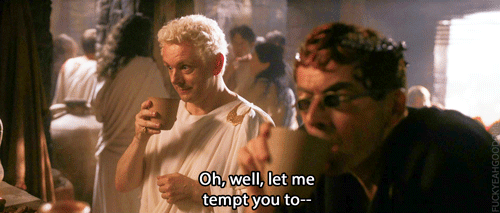
"Oh-- well, let me tempt you to--" Just consider this moment from Aziraphale's perspective for a minute...
Serpent of Eden Crowley? He is literally the spark that lit the flame of all of humanity here. By tempting Eve into free thought and sensual pleasure, he also empowered her into teaching Adam these things. As a result, Crowley is basically responsible for sex on Earth-- for all of its history. If you live in the Good Omens universe and you've ever had an independent thought, a sensuous experience, or an orgasm, you owe Crowley a thank you note.😂Every play Aziraphale has ever seen, every meal he's ever enjoyed, every human he's ever taken to bed-- all of those experiences are indirectly because of Crowley.
Aziraphale has wanted him for quite literally ever. He compares everyone else to him. No one else has ever made him feel like this. He knows they're attracted to each other but he never felt like he knew what, if anything, he had to offer Crowley. The hottest being he'd ever seen freed him from the prison of his own repression here-- what could he ever give Crowley that was worth something like that? How do you learn together and try new things and adventure together with someone who seems like they're leap years ahead of you and know all the things it took you a long time to find out?
It's at "I've never eaten an oyster" that Aziraphale realizes that the being who freed everyone else got left behind and Aziraphale can fix that. He is good at burning holes in prison walls. Protection and arming others against threats to them and healing and kindness-- that's what he does. He's been here thinking for ages that Crowley would never need anything from him that he knew how to give like this but now he sees it differently. They've shown each other already by this point that they're good at being partners but this one aspect of it always felt to Aziraphale like it would be imbalanced. In Rome, he realizes that it isn't.
Aziraphale doesn't have the vocabulary we have today for these sort of issues and Rome wasn't exactly a bastion of trauma-informed sex lol but he didn't need any of that because he's intuitively good at this. He already knows that it will be fine because Crowley doesn't know it yet but he effectively already told him that it will-- by telling him in the first place. Aziraphale knows that trust and desire are what's needed and that they have those in spades. All he really has to do here is help Crowley relax and get out of his head.
Or, as Aziraphale will put it during the 1941 sexual metaphor that is The Bullet Catch plot: "You do the shooting. I'll do all the hard bits."
What gets Crowley's attention in Rome is how utterly confident Aziraphale is. How empathetic but unpitying. Aziraphale doesn't hesitate and he trips over himself accepting the challenge-- which is awfully cute-- but it's that Aziraphale doesn't treat him like he's broken or seem to see this as daunting that works for Crowley. There is a lot of internalized shame and fear and pain associated with anorgasmia and Crowley has been stewing in this for a very long time up until Rome so for Aziraphale's response to be not dismissive of it but, instead, reassuring, was exactly what Crowley needed. Aziraphale's whole attitude is oh ok no problem should we get going now or..? While he was not happy about Crowley having had difficult experiences before because he doesn't like to think of him in pain, he was really into the idea of Crowley thinking it could be different with him.
Aziraphale really, really, really likes being the person Crowley let in enough for this. Pardon the Crowley pun here but Aziraphale has never stopped crowing about it between them in thousands of years and if Crowley weren't besotted with him, he would have murdered him over it by now. (See: an example in 1941 that we'll look at near the end of this meta and "I had to miracle in the cherries" in Good Omens: Lockdown.)
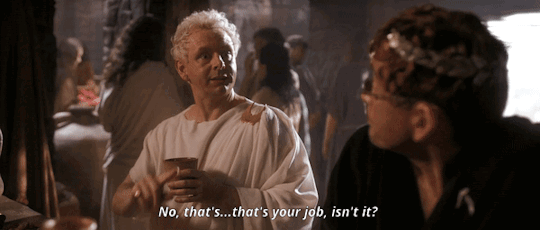
"No, that's... that's your job. Isn't it?" Aziraphale's use of "tempt" to offer Crowley sex is then something of a joke between them because neither of them are tempting each other in a demonic sense of the word at any time. They find each other tempting though, in the sense that they find each other attractive. To use "tempt" with one another is just to ask each other if they are in the mood for something, not to influence the other into doing anything ("tempt you to a spot of lunch?" and "temptation accomplished" in 2019.)
This is really established first in the Job minisode, chronologically, as Crowley didn't so much tempt Aziraphale to try the ox ribs so much as he just offered them to him and Aziraphale decided to without influence. The same is true for Crowley choosing to try sex with Aziraphale in Rome-- he's really already chosen to by not saying no and that's all before Aziraphale's "well, let me tempt you--".
When Aziraphale replies to Crowley's reaction to the "tempt" line with "No, that's... that's your job. Isn't it?", Aziraphale is teasing him a bit. He's saying he sees through Crowley's massive control issues and that he gets him. You always have to be in control but you don't always want to be. Well, today's your lucky day, Bildad, because we're partners in this now.
Or, as it's known in 2023:

Flame burning pink as Crowley smiles a little for the first time in the scene:
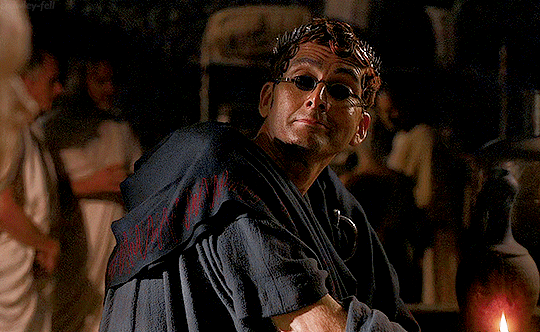
"Oysters! Oranges!" What Juliet (the woman selling snacks) calls out as the opening dialogue in the 1601 scene to entice prospective buyers, the only one of which really is Aziraphale. Oysters-- aphrodisiacs. Oranges-- cinematic symbol of death. Aziraphale chooses...
"Some grapes please! They look scrummy." Grapes. Fermented grapes are wine. Wine is alcohol. Alcohol is sex. We haven't a need for oysters anymore and we shun symbolic death in favor of the little death. The grapes look "scrummy", shortened version of "scrumptious", meaning both "delicious" in food terms and "sexy enough to eat" in people terms. Aziraphale eats them in front of Crowley during the scene.
Oysters. What Crowley and Aziraphale had in ancient Rome.
Oysters. What Crowley and Aziraphale had in ancient Rome.
Oysters (in Ineffable Husbands Speak). Both an aphrodisiac and an orgasm, but...
...since they don't want to bring up anorgasmia every time they're flirting or talking about sex for the rest of their very long lives... and since oysters on their own are really hard to work frequently into conversation and would get a bit old pretty quickly, they need another word.
So, based on what we've seen in the series, it evolved into...
Oysters = Fish.
Fish live in the ocean, amongst other sea creatures.
Fish & sea creatures (in Ineffable Husbands Speak). An orgasm.
Anything related to the ocean (in Ineffable Husbands Speak). A metaphor for sex.
If it is in or lives in water, it's prime material for climatic innuendo. If it has multiple meanings in English? It will be used frequently as part of wordplay. If it pertains to the ocean or lends itself to destructive adjectives (shipwrecks, sea monsters, bubbling seas and rising waves), it will absolutely be a sexual metaphor at some point.
Such as...
Wahoo. A kind of fish. Also: an exclamation of joy. For obvious reasons, Crowley and Aziraphale's favorite fish joke.
In 1941, Aziraphale seeks feedback in the dressing room on their sexual metaphor Bullet Catch performance-- that they are both more than aware of-- and Crowley agrees that it went well and dryly suggests they "chalk up a win for the side of the angel", turning the common phrase that is usually "...side of the angels" singular to reflect only Aziraphale, who is over the moon that Crowley enjoyed it and cheekily replies "wahoo!" before their flirting is interrupted by Furfur.
Decades later, Crowley gives another stellar performance-- the full, epic saga of his M-25 Orbital Disruption-- to the joyless, miserable lot in Hell and concludes it with a line that he plans to tell Aziraphale later to make him laugh:
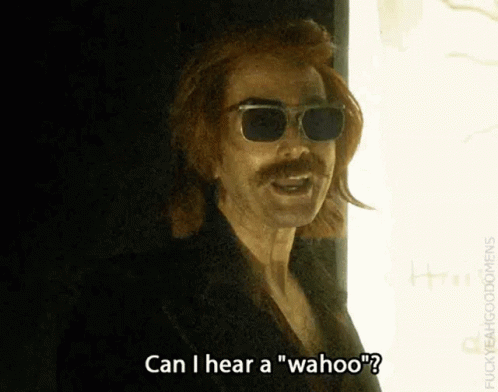
Carp. A kind of fish. Also means: to stand around and bitch. Aziraphale telling Crowley to stop standing around getting off on grouching and go get Maggie and Nina for The Meeting Ball in S2.
Gravlax in Dill Sauce. Cured salmon. This one is special and we'll look at it in the Dill Sauce meta about the St. James Park scene soon.
Ducks. Waterfowl. Aquatic birds. This is long enough. 😂 They are a whole separate meta.
Pickled herring. A kind of fish, cured in salt. What was dumped out of the barrel by Elspeth in The Resurrectionist minisode so she could use the barrel to transport her corpse. Crowley and Aziraphale spend half the minisode dragging around a barrel that should contain fish (the little death) but actually contains a corpse (actual death)-- foreshadowing the fact that their date will end with Crowley dragged to Hell and the start of the holy water arc of misery for them.
Red herring. A dry, smoked fish that turns red as it is smoked (ooh la la...) 😉 Also: A literary device, in which something is established with the intent of it distracting the audience from something else in the story. Elspeth and her pickled herring barrel are a red herring that changes The Resurrectionist minisode story from what the audience thought it would be into what it is, distracting the audience from the fact that the story actually began with Crowley and Aziraphale meeting in a graveyard at midnight for... ah... reasons. Aziraphale also turned 'red'-- turned to Crowley's side-- during the course of the episode, even as his shot at getting him some "pickled herring" that evening went up in hellfire smoke.
"Sargeant Shadwell." The hilarious, Sean Connery-esque way that Crowley said Shadwell's name in 1967, made funnier by the fact that a shad is a type of fish... and part of the herring family and this scene itself is a red herring. It misleads the audience into thinking we have a whole new plot about Crowley leading a break in to a church that is rendered inert within a matter of minutes when Aziraphale gives Crowley holy water. Shadwell's name is basically 'Fishwell' and, for Madame Tracy's sake, I hope that's true and not ironically funny. Either way, doubtful that Crowley and Aziraphale haven't joked about his name before. Shad also phonetically sounds like 'shag', the British slang word for fucking, and Crowley's tone of voice in the scene had a ring of 'shag' connotation to it.
Kieler Sprotte/Kieler Sprotten. A German smoked herring dish. A hidden reference in the Baraqiel entry in 'The Demon's Guide to Angels...' book that Furfur had in 1941. Baraqiel is Crowley and the entry, based on what's in it, was written by Aziraphale. One of you requested a meta on Baraqiel so that's on deck for now.
Newt. A semi-aquatic salamander. They live in the water but only some of the time. Also: Newt Pulsifier, an extreme parallel of Crowley who breaks all technology he touches, loves his less-attractive-than-The-Bentley car, and falls for a being who has issues with the purpose they feel they were put into the world to fulfill. Newt gets "in the water," metaphorically-speaking, when he has sex for the first time in S1 with the Aziraphale-paralleling Anathema, which is another example of how he's a more extreme version of Crowley, whose parallel to Newt is Aziraphale helping him through his intimacy issues.
Flounder. A kind of fish. Also means: to struggle helplessly in water. "To flounder" is frequently confused with "to founder", which is wordplay intentionally being used by Aziraphale in the "Seeds of Destruction" scene in S1, which we'll look at in the requested Seeds meta soon.
Bananafish. A kind of fish. Also: the first two words of Aziraphale's magic words. Is it "bananafish" or is it "banana, fish"? It's a little unclear and possibly situational. It's also likely both and a reference to wordplay and sex via fish. "The Bananafish" is also a short story by J.D. Salinger about trauma, PTSD and suicide that correlates to S2 quite a bit but we can look at that in a more Aziraphale's-trauma-centric meta.
The 'drunk-in-the-bookshop' scene. Part of the 2008 minisode, in which Crowley and Aziraphale are drunk and talking on the surface about Armageddon but are actually flirting with each other using sea-related terminology to make some drunken sexual metaphors.
Whales and dolphins. Sea-dwelling mammals. Not fish but live like them, alongside them. Damn big brains. Whales, in particular, are their own metaphor in Good Omens-- above and beyond Ineffable Husbands Speak-- but, in this context, they are non-fish creatures that live in the ocean, so Crowley is equating himself and Aziraphale to whales and dolphins in the drunk-in-the-bookshop scene and calling Aziraphale smart and clever in doing so. He is too drunk to come up with how smart they are ("brains the size of... *gives up* damn big brains" lol). His point is that Aziraphale is so smart, which is so hot, and that's his point. Brain city, whales.
Off of this, a drunk Aziraphale has heard Crowley say "damn big brains" and is thinking you know what *else* is big, Crowley?

"Kraken! Oh, great, bigggggg bugger..." Totally plastered Aziraphale is undefeated at Completely Wasted Wordplay, though, and he has a mythical monster and a whole attempt at a sexual metaphor for Crowley here, thanks to whatever brain cells are still kicking around in his damn big whale brain. The Kraken is huge and we aren't just talking about smart anymore, nope... Adding to the humor is the use of 'bugger'-- The Kraken is a massive one and we're talking about both in size and in terms of quite extraordinary amounts of buggery that Aziraphale wants to get up to here...
Giant squid and octopi. Also not fish but live in the sea, much like the whales and dolphins that Crowley had just mentioned and probably one of the reasons why Aziraphale's mind then goes towards The Kraken.
The Kraken. Mythical sea monster from Norse mythology. The Kraken-- and sea monsters, in general-- are thought to be based on giant squid and/or octopi. Particularly before days when squid and octopi were understood, The Kraken was sometimes described as a "sea serpent". Crowley, in Aziraphale's sexual metaphor here, is The Kraken-- is the great, bigggg bugger who is:
"Supposed to rise up-- right up-- to the surface. At the end. When the sea boils." We're talking about Armageddon on the surface but we're talking about sex under the surface and The Kraken is a mythological being who does not exist, making this drunk conversation even funnier. Adam will manifest The Kraken into existence later on in the season-- but, prior to that, the actual Kraken was a myth. Aziraphale and Crowley both know that. Neither of them believe in The Kraken-the-sea-monster. Aziraphale is just using it as a joking sexual metaphor while they're drunk as all fuck to flirt with Crowley using their whole ocean-themed innuendo.
"The Kraken" is "supposed to rise up, right up, to the surface, at the end". The sea serpent going from the depths of the cold black sea to cresting the surface of the ocean at the end of days, which is Aziraphale using destructive sexual metaphor-- using disaster, death, apocalyptic terminology, etc. as a metaphor for sex. Armageddon is the end of days is a sexual climax. "The Kraken" rises to the surface of the ocean "at the end-- when the sea boils"-- when it becomes too hot and there's no other choice but for the sea serpent to come... to the surface. 😉
"There is a lot of 'underlying unspokenness' and it comes to the surface now and again." Michael Sheen quote describing the nature of Crowley and Aziraphale's relationship in S1 in the interview below. I'd bet serious cash he's specifically thinking about The Kraken scene.
Thanks to @procrastiel for showing me the interview.
youtube
"Well, that's mah point! Dolphins and whales-- whole sea bubbling-- hard to keep everybody from turning into bouilla--" Crowley's response to Aziraphale's The Kraken metaphor. Actually surprisingly witty at the start considering how drunk they are (it's their damn big whale brains hitting on something every few words lol.) It is, indeed, his point that Aziraphale is talking about-- his boiling point-- but Crowley uses "point" in the other meaning here as well (as in, "that's the point of what I was saying!").
"Whole sea bubbling-- hard to keep everybody from turning into bouilla--" Everybody, eh, Crowley? 😂I thought we were talking about fish being boiled in the end of days here? (Someone ought to get Crowley and Aziraphale to make videos explaining climate change lol.) These fish and dolphins and whales seem like they could be easily mistaken for people? Like, say, you and Aziraphale, hmm?When the whole sea gets bubbling and it's just too hot in here, it might, indeed, be hard to keep you both from turning into...
Bouillabaisse. A fish soup that is frequently referred to as a fish stew, which is what a drunk Crowley calls it. The dish is French and when Crowley is too drunk to get the word out, he keeps repeating the first half of it-- "bouilla"-- which comes from the French verb "bouillir", which means "to boil". He heard Aziraphale's "when the sea boils" and his mind took it to the fish joke of bouillabaisse. To boil is, of course, to cook something in very hot water.
Crowley is too drunk to get the word out in full and repeats the "boil" part of it, getting distracted at one point and calling Aziraphale "baby" while they make hilarious, drunk, kissy faces at one another, before redirecting it with "fish stew-- anyway! It's not their fault."
A bouillabaisse features at least two different kinds of fish cooked together and served alongside one another in the same bowl.
Bouillabaisse/A fish soup or stew (in Ineffable Husbands Speak). Climaxing together/simultaneous orgasm.
"Fish stew-- anyway! It's not their fault." The end of the 'bouillabaisse' portion of the scene and yes, it's not the fault of the actual fish that will be turned into bouillabaisse when the world ends but this is also Crowley thinking of Aziraphale's earlier "hereditary enemies" comment and saying again that it's not their fault, they didn't ask for this. Tossed drunkenly into this getting sloppy sexual metaphor, it's pretty funny as it's also saying wouldn't be their fault if they turn into bouillabaisse later as who could blame them? World ending, been waiting for days, bouilla bouilla baby...
youtube
Good thing they sobered up because they were one more bottle of Chateauneuf-de-Pape away from just speak-singing "Under the Sea" at one another. Even the sturgeon and the ray, angel! They get the urge and start to play! That's *mah point*... 😂
"Heaven will finally triumph over Hell." One of the coded things that Aziraphale said to Crowley in the 1.01 St. James Park scene. While the surface layer of this conversation is about Armageddon, they're actually talking on the hidden layer about having not been able to be together the prior night. The key bit to this that I'm mentioning here is the use of the word "triumph"...
Triumph. A triumph is obviously a great victory or success but the history of the word is interesting. It originally meant a victory parade-- a processional-- held for a victorious general upon his return to ancient Rome. It was exclusive to Rome for a time as a word and still is how historians refer to that type of processional.
By using "triumph" in the St. James' Park scene, Aziraphale correlates the would-be sushi night with Rome.
Sushi. Raw fish mixed into vinegared rice, along with other ingredients. What Crowley and Aziraphale usually go out for in the modern era on their unofficial anniversary, which is the date of the first time they had sex in ancient Rome.
1,967. The number of years between the first time Crowley and Aziraphale had sex and when they were trying to meet to celebrate that special occasion in 2008 in 1.01. Armageddon: Round One began on their 1,967th anniversary. A reference to:
The 1967 scene, in which they talk about their relationship, and "dine at The Ritz" is said.

41. The number of years between Aziraphale suggesting they could one day "dine at The Ritz" in 1967 and when they did for the first time in 2008. A reference to:
The 41 A.D. scene in Rome, which shows how they first became lovers.
Well, with one caveat...
Hellfire and Holy Water. Substances produced by the physical corporations of angels and demons which are lethal to one another's "opposite kind"/"enemy." Aziraphale's body can make Holy Water, which could liquidate Crowley into non-existence. Crowley's body can make Hellfire, which could burn Aziraphale into the same.
As such, they spent some time concerned that each other's, em, "hellfire" and "holy water" might be harmful to one another, until they disproved this theory. This historical HIV allegory is alluded to in the "angel-demon, probably explode" Discorporated!Aziraphale scene in S1 (to "explode" also meaning to "explode a theory"-- to disprove it) and also in this scene here, in The Big Damn Sexual Metaphor that is The Bullet Catch:
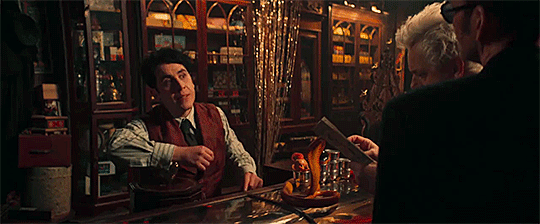
Aziraphale's dry "just aim for my mouth but shoot past my ear," right?
So, how did they figure out that they wouldn't kill each other?
Kingdom of Wessex. 597 AD. The Camelot scene. Crowley and Aziraphale cross paths in the time of King Arthur and are so damn over canceling each other out at work. After Aziraphale rebuffs Crowley's initial proposal of basically quiet quitting Heaven & Hell-- just doing the paperwork and phoning it in-- because he thinks Michael will figure it out (not because he doesn't want to lol), the two part the scene without a resolution... but the 1601 scene provides that resolution for us via the reveal of The Arrangement.
Back in 597 A.D., after the scene we saw, Crowley and Aziraphale got creative in trying to find a solution to their work woes and wound up experimenting with what they had been told by Heaven regarding what their capabilities were. They uncovered that Crowley could still do blessings and Aziraphale could do temptations. So long as they kept pulling power from their respective head offices, it didn't matter what type of miracle they did and no one in Heaven or Hell figured it out. This then caused them to also realize that if they were biologically similar enough to be able to do the same miracles, then odds were high that they actually wouldn't hurt one another if they had more expansive sex and they decided to try it. They're both still here so obviously the end result was nothing but wahoo. What else is suggestive of this besides the already mentioned scenes? This one, in 1941:
Excalibur. King Arthur's sword. Excalibur's Chest. The famous swords-in-the-box magic trick, on sale at Goldstone's in 1941. Swords are as much sexual metaphor as guns. Note what's between them in the magic shop in 1941 when they agree to perform The Bullet Catch together that night, after a performance by The Ladies of Camelot:

This is part of the reason why they also use performing miracles as innuendo-- besides the fact that there is just a lot of material there lol. It's because it took them 556 years after Rome but they happened into figuring out Heaven's big secret and it freed them to boff each other senseless for the last *maths* 1,426 years as of S2 lol so it's kind of irresistible. An example is Aziraphale in S2 with "the 25 Lazari miracle you and I performed together the other night" which is on the surface, sure, about the miracle they did together to protect Gabriel but which Aziraphale makes actually sound like what they got up to the other night, probably the one before Gabriel arrived. He's talking about Muriel there for the Gabriel miracle but he's saying it with a tone of: I suspect that the angel is here to verify the miracle that was Sunday night. I'd imagine alarm bells must have been ringing in Heaven constantly since. You and I raised the damn dead, old serpent...
The Bullet Catch. A sexual metaphor for both "firsts"-- 41 A.D./Rome and 597 A.D./Kingdom of Wessex-- mashed together because they were similar... but also a metaphor for Crowley and Aziraphale's relationship overall.
The Bullet Catch requires them to trust one another and be vulnerable with one another. It's only possible because of how much they trust in and care for one another. Crowley's ability to fire the gun in a way that won't kill Aziraphale-- which Aziraphale is trusting him to do-- means that Crowley has to trust himself to do it. He has to believe himself capable of it and that he can relax enough to do it. He only believes this because Aziraphale believes it about him and makes him feel safe enough to focus. Aziraphale's trust in him allows Crowley to trust both himself and Aziraphale while Aziraphale's trust in Crowley allows him to let Crowley in enough to let him see his insecurities and be loved in spite of them, something Aziraphale's self-doubts and imposter syndrome keep him from doing with other people. Crowley knows he's imperfect and loves him madly anyway, something Aziraphale has trouble doing with himself and which no one else in Heaven ever has. Crowley's faith in and love for Aziraphale give Aziraphale the confidence to live more freely and feel like he's among the professional conjurers and not just on the outside of life. Their trust in one another helps them trust each other and that self-trust opens them up to experiences with each other that lead to ever-deepening trust of one another that lifts them both in a kind of feedback loop.
"Cheers for, um, getting me off the hook." Crowley thanking Aziraphale for helping him with the Mrs. H situation. He's more than aware that Aziraphale assisting with Crowley's broken alcohol bottles when alcohol = sex to them is more than a little metaphorical for their actual history and he chooses a fish reference as part of the thank you. "Cheers" is that British way of saying "thank you" but it's also obviously what people also say as a toast (which is also a word used to refer to warmed bread, which is also related to partnered sex in Ineffable Husbands Speak.) It's what Crowley actually says in 2019 at The Ritz at the end of S1 in the "Cheers. To the world." moment. Here, it's also a reference to the first time they did clink some glasses together in toast-- the "Salutaria" of ancient Rome. And what is this toast-y thank you of Crowley's for? For getting him off-- that is, for getting him "off the hook."

"Off the hook" refers to a caught fish being taken off the hook. It also became, over time, a phrase referring to communication, from the days of phones with cords. Leaving a phone "off the hook" meant that calls couldn't come through and communication couldn't be had. By 1941, the phrase would have roots in both origins and if we're talking about fish and telephones, we're talking about earlier in the evening in 1941 but we're also talking what it referenced to them symbolically about the past of their relationship. It is also absolutely why Aziraphale jumps on The Bullet Catch as his grand gesture once they get to the magic shop-- he sees a way to continue the metaphor that they're both more than aware of.
It also makes it a thousand times funnier then that poor Aziraphale essentially makes the same assumption about demonic life twice over a bazillion years apart. He thought The Bullet Catch would be a no-brainer, fun thing for them to do because he assumed that Crowley had fired a gun before, only to discover that this was now actually Rome all over again because while Aziraphale has a firearms license and a Derringer hidden in a hollowed-out book in the bookshop, this metaphor was suddenly way too on point because Crowley hasn't fired a gun with someone else around before-- in this case, at all, actually. His dry as all fuck "not as such" response to Aziraphale is well, we both know I've fired the metaphorical gun this rifle is standing in for here but yeah, no, I have no idea how to shoot this thing and I was going to miracle you safe and now those aren't working either so I have to do this for real and I'll just be over here trying not to have a panic attack...
Talking. Making sure the telephone is not off the hook is obviously always a good thing with everyone one trusts around them in life. In a relationship context, feeling safe enough to talk openly with your partner about things which make you feel vulnerable is the mark of a trust and what allows for deep intimacy. Talking in bed-- not just checking in with a partner but talking beyond that-- is a therapeutic intervention for anorgasmia, as it helps someone suffering from it to stay present in the moment. Tends to work in general but even more so if the person involved likes chat in bed as a whole, which a couple of scenes suggest Crowley does (the evolution of it into also some extra spicy chat in the "Seeds of Destruction" scene in S1 and his self-deprecating "you just say 'blah blah blah'" moment in S2.)
"We need to talk." What Crowley says in 1.01 when he calls Aziraphale from a corded public pay phone. This is the first time that Crowley and Aziraphale talk in the present, even if they're in separate locations, and the first time we've seen them interact since the opening scene of the show of them on the wall in Eden. We've spent the first part of the 2008 minisode re-introduced to them separately, not yet fully aware of how they were supposed to be together during it. Crowley doesn't wait until he's back in Mayfair after dropping off the antichrist baby-- he calls Aziraphale from the nearest payphone. He says "we need to talk", a phrase that is, for many, a relationship cliche that comes with a sense of the foreboding but we will learn from this scene also means other things to them.
For one thing, it's a code phrase that automatically triggers them to meet the next day at noon at St. James' Park. If one of them calls and says they "need to talk", they know that it means to meet the next day and when and where. This one they know a lot better than their four million alternative rendezvous spots, as we saw in that other scene in S1 when they set up meeting in the bandstand over the phone. Because it triggers St. James' Park, it means that the initial talk will be all coded in their hidden language, as that scene in 1.01 was, but that is also a form of communication for them and a kind that they actually enjoy.
For another thing, it means that they need to talk in general-- that something is happening and they need to talk about it, as was the case with Armageddon. At the time that they have this phone conversation, they don't yet know that one another already knows about Armageddon starting. We know from all the contextual clues we've already looked at here that they were supposed to be having dinner together earlier and that they also can't say that over the phone so when Aziraphale says: "Yes, I rather think we do. I assume this is about....?" there's a dryness to Aziraphale's tone because a form of talking was already on the menu. Sushi night is Rome and Rome had talking so, yeah, Aziraphale rather does think they need to talk-- to fuck-- and also Armageddon just started so they'll need to actually talk-talk about that as well at some point.
Crowley's response to what it's about, though, is destructive sexual metaphor. What do they need to talk about, on all levels, summed up by Crowley in a word?
"Armageddon." Armageddon: the actual end of the world and Armageddon: their big damn anniversary sex. The Big One. It's an apology of sorts for Hell detaining him and a request that they meet tomorrow.
The scene ends with Crowley placing the phone back on the hook-- indicative of understood, secure communication, the likes of which will be on display in the following scenes of the 2008 minisode.
Talking (in Ineffable Husbands Speak). Both verbal communication and physical communication. Talking means speaking. Talking also means making love.
"Trust me." What Aziraphale mouths at Crowley in 1941 to get him to be in the moment enough to be able to fire the gun. Absolutely one of the things Aziraphale said to Crowley to help him relax in Rome.
"I knew you'd come through for me. You always do."

Aziraphale pouring Crowley another glass of wine (and alcohol = sex) and the wordplay kink out here in full force as there are three levels of meaning happening at once. Surface level is about their success with The Bullet Catch earlier in the evening. Aziraphale knew Crowley would come through for him-- "come through" in the sense of he can always rely upon Crowley to be there for him when he needs him to be.
To "come through" something, though, is also to get through to the other side of something-- to have been able to pull through a difficult time or a struggle-- and refers to Crowley always coming out of dark periods and not giving up. But there's really also the third meaning, which is just the direct innuendo:
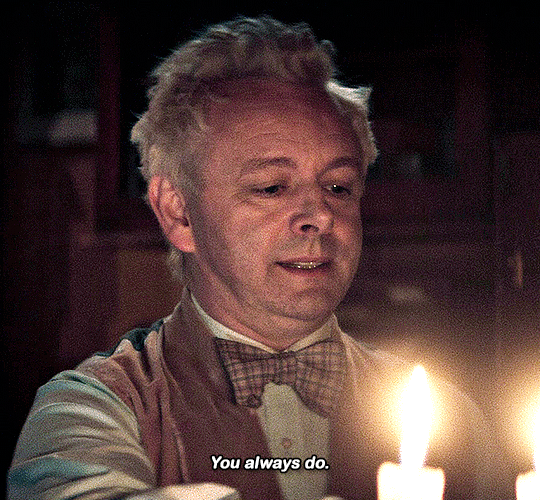
Some serious 'tone of voice' at play in this bit here performing a little magic trick and making that 'through' disappear right out of first sentence lol, turning it into: I knew you'd come for me. You always do.
Aziraphale's never going to stop being thrilled at their Roman triumph here and is still happy to remind Crowley in 1941 that they both know Aziraphale just does it for him.
"Well, you said 'trust me', so..."
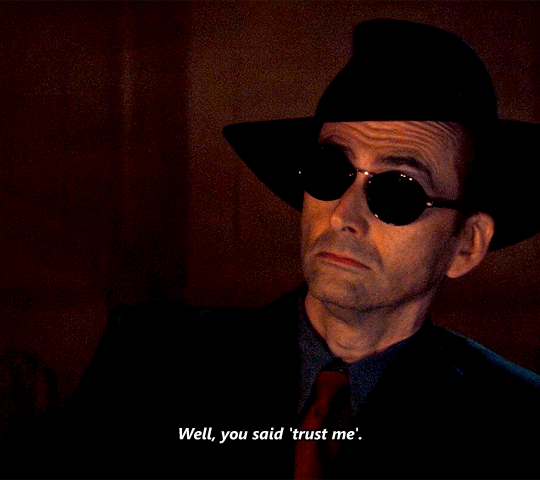
Just prior to this, Aziraphale had been telling Crowley the magic words he silently said to keep the photo of them from Furfur (more fish-- "bananafish").
"Well, you said 'trust me'..." is Crowley saying "well, you said my magic words, so..." Aziraphale invoked Rome and talked to him so he got there.
"And you did." And Crowley did trust him, so it worked.
Aziraphale, though, is not just thinking about earlier that night in that moment in 1941 when he's staring off, reminiscing, before looking at Crowley like that...
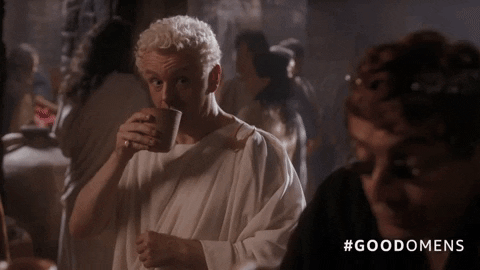
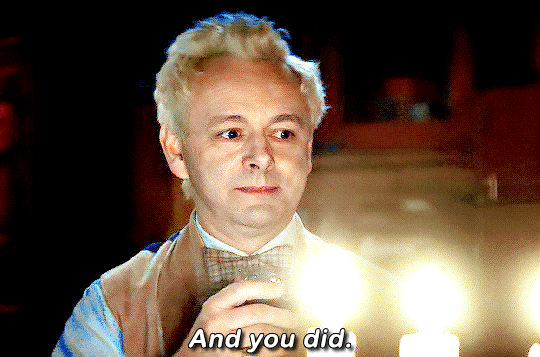
...he's thinking about Rome.
"To drain the whole sea/Get something shiny..." Lyrics from Hozier's "Take Me to Church", pretty uniformly agreed as the most Crowley song that has ever Crowley songed, and which is on his official playlist in S2.
Pearls. The shiny things found in the sea. The jewels harvested from within the opened protective shell left behind by emerged oysters.
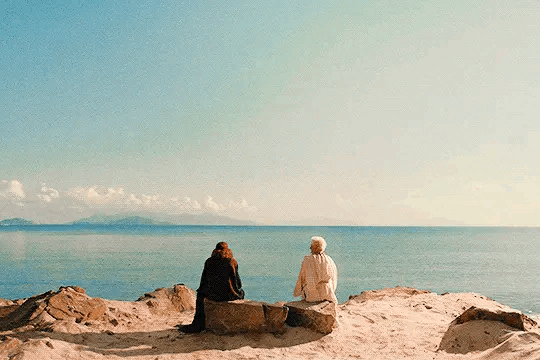
The original post referred to a bit in this one:
#ineffable husbands#ineffable husbands speak#good omens#good omens 2#good omens meta#aziracrow#crowley#aziraphale#spicy omens#tw sa#tw trauma#tw ptsd#crowley x aziraphale#aziraphale x crowley#long meta
228 notes
·
View notes
Text
Alright, I’m gonna talk about Ed and abuse.
“Why? Why are you spending your precious time on Earth typing about some dumb fandom stuff when you could be doing literally anything else?”
In short, seeing the “Ed is an abuser who’s inevitably going to hurt Stede” takes has been driving me absolutely bonkers since I first noticed them. They’re not going away, so I have to essay about it.
In less-short: it’s because abuse is a serious thing and, as someone who’s experienced it, I get riled when it becomes a topic of discourse in my silly pirate fandom. It’s because it’s upsetting to read meta after meta accusing an indigenous man of being an abuser when the text doesn't support that reading. It’s because a lot of the abuse discourse in the fandom fails to separate real-life abuse from violence in a show. It’s because the vast majority of the abuse talk only acknowledges physical abuse which, while terrible, is not the only kind that hurts people and utterly destroys their lives.
It’s because calling Ed abusive or insisting that he’s a future abuser can harm people who are like him -- people who have suffered abuse or get angry sometimes or have hurt people when they were hurt. Victims of abuse, especially those who dealt with it in childhood, often fear becoming abusers themselves. They bottle up their anger for fear of hurting someone. They hurt themselves in a misguided attempt to protect others. They don’t need to see meta that enforces their fears.
Before I get into it…
I may as well come clean and say that I’m on team Ed absolutely isn’t abusive.
Plenty has been typed in Ed’s defense by POC in the fandom, so I’m not going to go into how deeply unfortunate it would be to make an indigenous main character an abuser. I’m just going to say that, when you consider OFMD’s genre and attitude towards violence, it seems clear to me that you can’t call Ed abusive without calling out other characters unless you have some kind of bias against Ed. His actions are deplorable in the real world, a bit much in OFMD’s world, deeply unhealthy, not okay by any means, and shitty and traumatizing for his crew, but they aren’t abusive.
Remember: Our Flag Means Death is a comedy with tons of over-the-top violence. If your theory is unrelentingly grim or looks at violence and its consequences in a real-world light, consider stepping back and remembering what genre the events of the show are happening in.
And if you think that only the violence committed by the indigenous lead is abuse, look at the actions of the other characters and ask yourself why Ed doesn’t get the same grace you’ve granted the others.
What is abuse in the real world?
Abuse “includes [a pattern of] behaviors that physically harm, intimidate, manipulate, or control a partner or otherwise force them to behave in ways they don’t want to. This can happen through physical violence, threats, emotional abuse, or financial control.” (1)
“Emotional abuse includes non-physical behaviors that are meant to control, isolate, or frighten someone. These behaviors are often more subtle and hard to identify but are just as serious as other types of abuse.” (2)
It’s important to emphasize that not all purposeful harm to another person, physical or otherwise, is abuse. “What abuse really means is control. When a truly abusive situation exists, it’s because one party is seeking to control the other through abuse.” (2)
Abuse is a pattern of behavior that involves one person intentionally harming another. That harm is meant to control, and it can take on more forms than just physical.
In our world, all abuse is terrible. Vitally, our world is not a pirate rom-com.
Adding context: what is abuse in Our Flag Means Death?
Our Flag Means Death is a romantic comedy with one core romantic couple, Ed and Stede, whose story takes priority over everything else. It can be dark, it can be serious, but it is, at its core, a comedy, and not a subtle one at that. (3) Sometimes things are just funny and that’s it.
The show’s meanings aren’t hidden under layers of red herrings and subtext; if you’re compelled to bring out the conspiracy corkboard, you’re probably in too deep.
But this isn’t just a rom-com: it’s a pirate rom-com, and that comes with gratuitous violence. Here’s a short, fun list of examples of things that we can consider canon-typical pirate violence:
Tying hostages to the mast and letting them cook a bit
Wanton murder during a raid (“Note the gusto!”)
Threatening a crush at gunpoint until they stab you
Whippies and yardies
Cutting off toes and feeding them to people “for a laugh”
Literally any violence directed at a racist (this violence is, in fact, good and encouraged)
There’s also the pirate-typical killing of other pirates. Duels don’t seem entirely unusual, and Izzy outright tries to get Stede killed at several points in season one. When Chauncey Badminton and the English navy show up after being summoned by Izzy, Stede’s life isn’t the only one on the line: the rest of the crew is also put in potentially life-threatening danger.
In short, Our Flag Means Death has a lot of violence and peril, and very few instances of violence (looking at you, Hornigold) are treated as anything other than socially acceptable. But do you know what’s really important in the show?
Feelings.
The way characters feel as a result of something is given an immense amount of weight. The show’s subtleties are in the realms of the mental and the emotional, and that’s where the real pain is too.
Nigel Badminton’s death was bad because it was emotionally and mentally devastating for Stede. Ed’s father’s murder was bad because it hurt him and forced him to create a monstrous alter ego to cope. Both of those men -- Nigel and Father Teach -- are totally acceptable casualties. Their deaths would be net positives (in this universe where abusers are punished for their behavior) if they hadn’t had such strong impacts on our leads.
Feelings are everything in Our Flag Means Death, and the feelings of our leads are the heart of the show. That’s where the story is. That’s where the complexity and ambiguity is.
So what is abuse in this context? The casual treatment of physical violence and the seriousness of emotional distress tell us to adjust our own moral judgments accordingly. Physical violence is everyday, straightforward, and often comedic; emotional violence is devastating and complicated. Physical violence is cartoonish and, often, part of a punchline. Emotional violence is real and raw and not a joking matter. Planning to murder a guy and steal his identity can be shrugged off; ditching your boyfriend after experiencing a traumatic event is more complicated.
When we ask ourselves if something in OFMD is abuse, we have to consider the act in the context of a rom-com that’s all about the feelings of two guys, set against the violent backdrop of piracy, and absolutely packed with people getting maimed and murdered in casual, comedic ways.
So...
Is Ed abusive in the context of the show?
No.
Aaaand we’re done!
Joking, joking. Obviously I’m going to pick out the examples of “abuse” that people cite and discuss each one, but first: we need to talk about Ed, violence, and anger.
Ed is not a violent person. He’s not full of rage that’s threatening to erupt at all times, and he’s not some kind of sadist who revels in hurting people. The violence of Blackbeard is a fuckery: it's the theater of fear, an illusion of cruelty calculated to terrify others into surrendering and obeying without (much) bloodshed.
Ed has his whole thing with murder that's rooted in childhood trauma. Killing his abusive father to protect his mother scars him so badly that he distances himself from the situation -- he blames Father Teach’s death on the Kraken, an invented monster. As a pirate, he creates loopholes and rules that technically put one step between him and killing (in his mind). He orders murders and causes deaths and maims and maintains his image as the bloodthirsty Blackbeard, but Ed doesn’t do “the big job” himself until the end of season two. When Stede’s life is in the balance, Ed can kill to protect him.
Edward Teach kills only to protect.
But that’s killing, and we’re talking about general violence. It's true that Ed is casual about the day-to-day violence of piracy. He participates in it, incites it, and doesn’t feel bad about it. No one does; violence is part of the job.
That leaves us with the "anger problem." Ed is sometimes characterized as an angry person who lashes out when enraged, and canon doesn't at all support this interpretation. Ed gets mad, yes, but his anger is always at least understandable (and, in my opinion, he's one of our more restrained characters). It isn’t a constant, simmering thing that turns him into an abusive monster when he’s triggered. He doesn't always deal with his anger -- or any of his other feelings -- in a good and constructive way because both of our leads lack emotional maturity, but I think it's a grave mistake to characterize him as an angry person.
Hopefully I can elaborate on this idea -- the idea that Ed is only violent and angry in a normal and canon-appropriate way, and anger is by no means one of his defining characteristics -- by doing a run-down of all of the times Ed is accused of being abusive or showing signs of being an abuser-in-the-making.
---
Ed loses his shit on a falling snake during his nature adventure with Stede (S1E7). In this scene, he’s embarrassed about the treasure hunt, oblivious to Stede's intentions, and annoyed by the very existence of nature. He is not relaxed. When nature takes him by surprise, he stabs the crap out of it in a scene that is played for comedy. There’s the important part: this is comedy. Ed is grumpy and his childish tantrum is harmless and silly. It isn’t a red flag. Overreacting while irritated isn’t an indicator that someone will be abusive.
Ed punches Izzy after the English have taken the Revenge, captured Stede, and turned Ed over to Izzy (S1E9). Honestly, I think the fact that Ed lets Izzy talk before punching him demonstrates a great deal of restraint on his part. This is justified anger and fear for Stede’s life. This is not an indicator that Ed makes a habit of hitting Izzy.
In his post-pillow fort era, Ed is cleaning up his cabin when Izzy confronts him (S1E10). Izzy insults Ed, tells him that he’d be better off dead than as he currently is, and says that he serves only Blackbeard (Ed better watch his fucking step). Ed reacts by grabbing Izzy by the throat and telling him to choose his next words carefully. This is, in my opinion, a reasonable reaction and exactly the response Izzy was fishing for. The only pattern this scene indicates is one where Izzy goads Ed until he starts performing the violence expected of Blackbeard.
Which takes us to The Toe Scene.
In real life, it would be extremely fucked up for a boss to remove an employee’s toe and make him eat it. OFMD is not real life. One episode earlier, Ed was talking about the life he was glad to leave behind -- the life where The Toe Thing was done “for a laugh.” Not as punishment, but for fun. It’s set up as something that’s gross (“yuck”), not a grave punishment. When Ed feeds Izzy his toe, he gives Izzy what be asked for: he gives him a violent captain. He gives him Blackbeard. He gives him the guy who fed people toes for fun.
But what’s important here is that Ed is not having fun. He’s having a lot less fun than Izzy is, going by their expressions in the scene. This isn’t who he wants to be, but after having the possibility of a better life snatched away, Ed throws himself back into the sure thing. He becomes the Kraken -- the captain Izzy wants, the violent monster that Ed thinks he is and tries to distance himself from, and the only thing Ed thinks he can be. It’s sad. It’s desperation, not anger and abuse.
In the second season, Ed headbutts Stede after he’s revived from his coma-death (S2E4). In the next scene, Stede is holding a cold steak to his face and calling it an accident. Roach says “that’s what they all say” -- a line that alludes to domestic violence. The thing is? It’s not, and the crew has expectations of Ed that Stede doesn’t (as indicated by Stede's earlier assertion that Ed's a nice guy in response to Olu's concern that Ed will kill him).
Ed is freshly out of a coma (or newly alive). He’s nonverbal. His brain is, medically speaking, couscous. He still has one foot in the gravy basket. When he sees the man who left him hovering over him -- the man he loves, the man who just appeared to him as a mermaid -- he tries to say something. When that fails, he resorts to a headbutt. This is a single violent action perpetrated by a confused and hurt man who doesn’t know what to do with all of his feelings. He can't talk. He can't push Stede away.
Stede understands all of this, even if the other characters don’t. He sees the headbutt for what it is: a bit of a bitchy move. He isn’t afraid of Ed. He never is.
Stede also isn’t afraid of Ed when he acts out later that episode. When Ed learns that Stede went back to Mary, he excuses himself from the dinner table, smashes a chair against the wall, and knocks a vase to the ground. In this entire episode (this entire season), Ed is having intense feelings that he doesn’t know how to express or work through. The reveal that Stede returned to his wife is the final straw. He takes his tangled feelings out on an acceptable target (a chair, a vase) instead of Stede because he doesn’t want to hurt Stede.
This looks like displacement -- when “an unacceptable feeling or thought about a person, place or thing is redirected towards a safer target.” Displacement is an “intermediate level coping mechanism.” That is, it’s more sophisticated than the ways children deal with intense issues, but it’s still not entirely mature. In an adult, it indicates a level of emotional immaturity. (4) Ed is emotionally immature, not inherently violent. He gets overwhelmed by his feelings and lashes out -- not at a person, but at something that can’t get hurt.
Displacement is not an indicator that someone is an abuser. It’s a coping mechanism. It’s an attempt at emotional regulation. It’s not the best coping mechanism, but it’s not a sign that someone is going to go into a rage and assault people.
Stede cringes when Ed smashes the chair and sends the vase crashing to the ground, but he’s not afraid of Ed. He is never afraid of Ed because he knows that Ed isn’t a real threat to him. He cringes because sometimes that's what a person does when a loud thing happens. That's what people do when chair shrapnel starts flying. Also? It's kind of embarrassing behavior on Ed's part. They're guests enjoying a mediocre dinner! That's no way to act!
And this leaves us with the first two episodes of season two.
Ed is fully in his Kraken era. He has no hope that Stede will return, he no longer trusts the crew, and he feels trapped in a life he absolutely doesn’t want. He thinks that he has to perform Blackbeard until death sets him free. He sobs in his cabin when no one’s looking. Publicly, Ed fades into the role of remorseless and bloodthirsty pirate captain.
Needless to say, this makes for a shit work environment. Ed works the crew (and himself) too hard. He drinks and does drugs (note that his drug of choice is rhino horn -- visually coded as cocaine -- instead of alcohol, the drug associated with his father) and runs everyone ragged. He’s an absolutely terrible boss, but he isn’t abusive.
That isn’t to say that the crew left on the Revenge isn’t traumatized. They are! They’ve been thrown off balance by the sudden change for the worse in someone who was previously a pretty cool guy, and they’re traumatized by the neverending violence that the constant raids -- raids that are bloody and deadly, not the fuckeries of the past -- demand of them. They’re traumatized by that final night in the storm when Ed does everything in his power to goad them into killing him, almost murdering everyone in the process. They’re traumatized by their own attempt at murder and their own capacities for violence.
In S2E4, Blackbeard’s crew has flashbacks to the violence they perpetrated under the Kraken: Jim fighting Archie, Fang breaking a man over his knee. They’re haunted by guilt about what they did to Ed, as evidenced by their Lady Macbeth-style scrubbing. Their own violence is a significant part of their trauma.
No, that doesn’t absolve Ed. He drove the violence -- demanded it of both the crew and himself. He hurt other people because he was hurting, and that’s terrible.
Ed’s behavior in the first two episodes of season two is horrible, especially when his desperation reaches a fever pitch, but there's no attempt to control and no habitual mistreatment. Nothing he's doing is normal for him. He's spiraling and unraveling and pulling the world apart around him. Not all bad or violent behavior is abuse.
(We also have to ask ourselves just how bad Ed’s behavior really is. Archie, someone from the pirate world who has no idea what the Revenge was like pre-Kraken, tells Jim “that’s how these things usually go” at the height of Ed’s violence. She doesn’t act like she experienced anything out of the ordinary.)
But what about Izzy?
What about Izzy indeed. Let’s walk through the first two episodes.
One of the first things we see Ed do in season two is shoot a man. At first this seems like the show telling us that Ed is embracing the kind of violence he couldn’t manage before, but if we pay attention, we can see that he’s still following his “not a murderer on a technicality” logic. The man he shoots has a sword through his chest; he's as good as dead. He also falls offscreen before Ed shoots, making the action less impactful.
OFMD is not subtle and this is a quick way to communicate what’s going on with Ed. He’s not doing well and he’s more violent than he was last season, but he’s still himself under the Kraken’s makeup. He hasn’t done a moral one-eighty. If the show wanted us to think that Ed's a monster, they would have made him a hell of a lot more violent.
So. Izzy.
Immediately after Ed tells Izzy that he’s replaceable in S2E1, we reach the scene that some point to as proof of domestic violence. This is where Izzy breaks down because he has just been told in no uncertain terms that he’s not Blackbeard’s special little guy. That’s devastating to him, and he cries when the crew approaches him with kindness and sympathy.
Jim tells Izzy he’s in an unhealthy relationship with Blackbeard. Frenchie describes their relationship as “toxic.”
A toxic relationship is “any relationship [between people who] don’t support each other, where there’s conflict and one seeks to undermine the other, where there’s competition, where there’s disrespect and a lack of cohesiveness." (5) And you know what? Yes, Ed and Izzy definitely have a toxic relationship. And is their relationship unhealthy? It sure is -- for both of them. But the crew is, understandably, more sympathetic towards Izzy because they’ve never been present when Izzy was hurting Ed.
(Only tangentially related, but the crew must have really liked Ed pre-Kraken. As far as they know, the man went dark with no warning or cause. They deal with him for approximately three months (assuming one raid a day), and he has to go so far before they put an end to him. Remember when they were ready to toss Izzy overboard after, like, twelve hours under his command?)
Even though they only have one side of the Izzy and Ed story, the crew isn’t accusing Ed of domestic abuse. The term doesn’t apply to the mutually fucked-up thing that Izzy and Ed have and, beyond that, the scene is played for laughs. Jim and Frenchie use comically modern language. The whole thing feels like an intervention for a stressed-out middle manager with a shitty boss. It's funny. It's a comical thing in a comedy show.
Izzy returns to Ed and tells him that the crew won’t throw treasure overboard to make room for more treasure. Ed says, “And that’s another toe.” Losing a toe is the penalty for failing the kind of captain that Izzy said he will serve. It’s obviously not okay to punish an underling by taking toes, but we’ve already established that toe-removal isn’t a cruel and unusual pirate punishment.
(Specifically, toe-chopping is the cost of Izzy’s failure. Frenchie disobeys and lies to Ed in his short time as first mate and he doesn’t lose a single toe. Izzy bears the brunt of Ed’s cruelty because he’s the one who demanded it.)
This is not who Ed wants to be, but it’s who he thinks he has to be. It’s who Izzy told him to be.
Next, Izzy makes the mistake of invoking Stede and Ed storms above deck. He holds the crew at gunpoint, one by one, and asks them if they think that the vibes on the ship are poisonous. No one gives him a positive answer and Ed turns the gun on himself. He works himself up until Izzy interrupts and the following exchange happens:
IZZY: “The atmosphere on this ship is fucked. Everyone knows why.” ED: “Well, I don’t. Enlighten me.” IZZY: “Your feelings for Stede fucking Bo--”
[Ed shoots Izzy in the leg. Ed steps over him on his way back to his cabin.]
ED: “Throw this shit overboard and get suited up.”
The fucked up vibe is not because of Ed's feelings for Stede. Ed's feelings for Stede resulted in Ed having a nineties-rom-com-style breakdown and proposing a talent show. The Kraken and the ensuing fucked atmosphere were ushered in by Izzy.
Izzy is only shot after he proposes talking it through (something he attacked Ed for in S1E10) and publicly places all of the blame on Ed's feelings (feelings that he previously threatened Ed about -- Izzy owes his loyalty to Blackbeard, not a "namby pamby in a silk gown pining for his boyfriend" who would be better off dead). Whatever Izzy's intentions are, it's not irrational for Ed to interpret this as a further threat or an attempt to stir up a mutiny.
What’s important for this post is this: Ed's actions are not unusually cruel for a pirate captain who considers his first mate out of line. Shooting someone in the leg is the kind of thing that the idea of Blackbeard that Izzy worships does to maintain his reputation.
Fang cries when Ed shoots Izzy because he knows Blackbeard. He has been with Blackbeard longer than anyone else, and this isn’t Blackbeard. Blackbeard doesn’t work his crew this hard. Blackbeard doesn’t disregard the deaths of long-time crewmates like Ivan. Blackbeard doesn’t shoot his own crew. Fang is off-balance and distraught because his captain of twenty years is acting far, far more cruel than the one he knew.
This is not Ed as he usually is. Ed at his worst is breaking all of his past patterns. He’s behaving like a different person. His actions at this point in time are not typical of his past actions or predicative of his future actions.
When we reach S2E2, Ed is chipper. He’s cleaning up, he’s tying up loose ends, and he has decided that, no matter what, this is the day that he dies. He’s determined. First, he’ll give Izzy a go at killing him; next is the storm, the destruction of the steering wheel, and taking increasingly desperate actions to get the crew to stop him. He tells Jim and Archie to fight to the death. He goes to blow the mast away with a cannon and doesn’t react as nameless crew members are being washed overboard.
Ed is stopped only by Izzy’s reappearance and the violent mutiny that follows.
None of what Ed does here is abuse. This is desperate violence. This is an unwell man begging everyone around him to send him to doggy heaven.
And finally, we have the big murder party in the season finale. A surprising number of fans interpret Ed’s willingness to cut down naval officers as a sure sign that he’s gotten worse and he’s more violent than ever. This is, in my opinion, a take that completely ignores everything we know about Ed and his relationship to violence.
It bears repeating: Edward Teach kills only to protect. He murders his father to protect his mother. He kills as Blackbeard to protect himself (and no matter how he tries to distance himself from that violence, he still causes deaths). He mows down colonists for Stede. He kills for safety and for love, and by the end of season two, he has made some kind of peace with the Kraken and his own capacity for violence.
It’s sweet. It wouldn’t be sweet in the real world, but in this world? In a world where physical violence is funny more often than it’s serious? In a world full of pirate characters who all have hefty body counts? It’s growth. It’s Ed healing.
Ed is doing better. He’s not a threat to the man he loves, and now he’s not a threat to himself either.
Anyway.
No, Ed is not abusive. No, there’s no indication that Ed will become abusive in the future.
Dislike characters. Take issue with things. Feel whatever you want to feel, but remember that abuse survivors are not a monolith. Consider, just for a moment, that the abuse you think you see in the show is not textual. Ask yourself if Ed is truly worse than all of the other characters or if you have some bias warping your view of him.
Finally: please keep in mind that I’m not trying to present The One True Interpretation. I’m just rolling all of my arguments and thoughts into a ball and throwing it out into the wild. You don’t have to agree with me but, if you don’t, I hope you’ll at least consider what I'm saying.
Peace and love and goodbye.
#ofmd#ofmd meta#edward teach#long meta#like too fucking long#abuse#tw abuse#cw abuse#me typing things#fandom critical#kinda?
269 notes
·
View notes
Text
Okay but like. Sir Palamedes and the questing beast. At first I was thinking, okay so.
After getting heartbroken by his doomed loved for Isault, Sir Palamedes devotes his life to pursuing an outwardly beautiful creature, made of an amalgamation of many other things. It was created as the result of a horrible crime, and from it’s belly is coming a horrible howl, like the yapping of many dogs, because the beast is perpetually pregnant with something that will tear it to shred when it comes out. It literally carries its own death. Furthermore, the creature’s very existence represents the discord which will destroy King Arthur’s court from the inside.
And this pursuit is “as doomed to fail as his love for Isault”.
That maps with his heartbreak over Dulcinea (Isault) and his battle with Cytherea (the beast), right?
But the rest of the myth doesn’t fit. Depending on the sources, we have these further elements:
-He picked up the quest from another king, Pelinore, whose family had been passing down the duty to hunt the beast from generations to generations. Only that family was said to be able to kill it.
-Sir Palamedes is doomed to fail, until he converts to christianity, at which point another knight helps him lure the beast into a lake to kill it.
-The creature may or may not be in love with Sir Palamedes. This is apparently from some side plot in an early version of The Once And Future King where he disguises himself as the beast and it falls in love with him, Looney Tunes style, and that is why he decides to devote his life to hunting it. In the same book btw the guy who was hunting it before decided to drop the quest and then the beast was wasting away for lack of attention so he literally nursed it back to health, released it, then started hunting it again. PLUS at another point the dude is captured and the beast shows up to rescue him, so. That’s some weird ass codependent enemy situationship that Sir Palamedes just waded into, is what I’m saying.
ANYWAY with all of these extra plot point in mind, I have thus decided that Cytherea isn’t the Questing Beast to Palamedes Sextus. Nona is.
(She carries the howling of her true self, which will destroy her when it is released. She is brought to a lake [the tomb] before dying. Pal “converts” by becoming Paul. She was born of a crime. She heralds the empire’s fall. Palamedes more or less inherited the task of dealing with the revenant beast(s) from Cassiopeia. She’s a giraffe— wait, what?)
#the locked tomb#the locked tomb meta#tlt meta#long meta#palamedes sextus#nona the ninth#tlt spoilers
46 notes
·
View notes
Text
Nie Huaisang and the Morality of Revenge
(Greatly expanded AO3 version here – I would definitely recommend that one more, but it's a little long for a tumblr meta)
"Take revenge on the ones who bite you. Wen Ning’s branch doesn’t have much blood on their hands."
There's a clear pattern as to how revenge is presented in MDZS. Though revenge against the ones who wronged you (or those close to you) isn't something you're morally obliged to do, it isn't condemned, and tends to be presented in the right. Revenge against innocents, however – that's where you draw the line.
All of which leaves Nie Huaisang in a very interesting position. Because though his target is the person directly responsible for his brother's death... those he's willing to harm to achieve that goal are not.
Vengeance in MDZS
MXTX: If you were to ask Wifi as to why he did not reveal [Nie Huaisang's] mask, it’s because there wasn’t enough evidence, there wasn’t a way to catch his tail (...) there was no way to punish him, because his reasons were righteous. - MXTX interview, translation here – 'Wifi' refers to Wei Wuxian
Now, it's one thing to say revenge is presented as right, and it's another thing to prove it. Why do I think this, and what material is there to support this in the actual text?
One major piece of evidence is Wei Wuxian himself.
If he were Chang Ping, he wouldn’t have cared how prominent or powerful the LanlingJin Sect was, or how much glory the road ahead offered him, and he wouldn’t have let the matter [of his clan being murdered] go. Instead, he would’ve went to the dungeons on his own, cut Xue Yang up so that he was nothing more than a puddle of flesh on the ground, and summoned his soul back to repeat the process to the point that he regretted ever being born in this world. - Chapter 33, EXR translation
This is something that Wei Wuxian thinks in the present day – not under pressure, not in the aftermath of anything traumatic. And the important thing is that it's never questioned. There isn't a moment where Wei Wuxian or anybody else dwells on this and thinks/says 'maybe I shouldn't keep retaliating like this' or 'will harming more people after their actions have already been taken actually fix anything, or just cause more damage?'. It's also never framed as a tragedy that these views don't change. There is a moment of thinking his past self went too far with his vengeance, but look at the context:
And for every one of the Wen Sect’s cultivators whom he killed, he made them into puppets as well before controlling them to kill the friends and family they had before they died. (...) Not only others, even when he, himself, thought about it afterward, he felt that he had done a bit too much. - Chapter 60, EXR translation
Killing their friends and family – yes, this is a war between clans (people with blood ties to each other)/sects (in which you spend most of your time around fellow members), so it's likely many of these are on the battlefield... but do we know this is the case for everyone? We know there are people and branches of the Wen sect who are noncombatants, and we know outer disciples exist, whose families may or may not be affiliated with the sect in some way. We also know resentful corpses can seek out, recognise and target people due to their bloodline without direct control (see Nie Mingjue finding Jin Guangyao and then targeting Jin Ling in Hatred and Concealment), so seeking out family members outside of the battlefield is possible. Out of the potentially thousands of people Wei Wuxian killed in this way, is it really that probable that every single one was guilty?
This is what I believe 'done a bit too much' means – targetting people who may or may not have been directly involved in action against Wei Wuxian/the allied sects.
There are also other instances of vengeance, directly against the ones who harmed you, being framed as justified (resurrecting Wen Ning to kill the inspectors that killed him, for example); as well as instances that aren't exactly vengeance but are still linked to punishing somebody for their bad deeds (seen a lot with Xue Yang – eg Xiao Xingchen demanding "severe punishment" for what Xue Yang did to the Chang clan in Chapter 30*, Wei Wuxian's "Xue Yang must die" after witnessing the Yi City flashbacks in Chapter 41), also framed this way.
But, first, a clarification.
MDZS may not condemn vengeance, but it does condemn holding onto resentment and letting it twist you, particularly when it leads to the harming of other people. And this is something important to note about Wei Wuxian's character, as well – he is quick to vengeance and retaliation, but that's exactly the point. He does the deed and then doesn't hold onto those feelings (under normal circumstances), instead carrying on to live his life with his adherence to his moral code unaltered**. See the Second Siege – a lot of these people directly contributed to the first siege on him, but he doesn't hold onto his resentment and decide not to save them as a result. Instead, he and Lan Wangji work to save them as well as the Juniors at great personal risk to themselves. That's why most of his actions are justified by the narrative, and why the two times he does act based on feelings of resentment he holds (Sunshot Campaign in the above quote, and Nightless City***), his actions aren't.
Back to vengeance itself.
Of course, vengeance is not presented as the only course of action! Lan Wangji doesn't do anything to avenge Wei Wuxian's death, instead focusing his energy on helping people and on teaching the younger generation to avoid the mistakes his made, and he's all the better for it. The line immediately following Wei Wuxian's thoughts on Chang Ping and Xue Yang is this:
But, not everyone was like him[.]
Which is followed by understanding for Chang Ping's situation, especially taking into account the fact that "some of the Chang clan's people were still alive" and may have been casualities if vengeance was carried out. Revenge isn't something you're obliged to do – and when the alternative is protecting others, is arguably less important. But, in itself, it isn't a moral wrong. As someone I talked to about writing this meta said, it's often the only way to bring someone who has done bad deeds to justice (which the story supports: see my earlier points about Xue Yang, as well as MXTX saying Xue Yang "deserved to be beaten by the protagonist") in a society which often leaves bad deeds unpunished and good deeds condemned.
(Of course you're allowed to disagree with this view of vengeance and punishment – I do myself – but that's what I believe to be the story's view on the matter.)
When it does become a moral wrong is when it targets innocent people.
Going Too Far?
As we've discussed, there two scenarios where revenge is presented as in wrong: the above, and being corrupted by the resentment you hold due to continously seeking your vengeance. And more often than not, these scenarios are strongly tied to each other. The sects targeting the Wen remnants after the Sunshot Campaign is an example of the former, as is Xue Yang's murder of the Chang clan; Nie Mingjue's single-minded hatred of Jin Guangyao is a clear example of the latter. Even if Jin Guangyao did do the actions Nie Mingjue had hated him for (and he did!), the resentment Nie Mingjue carried due to this eventually led to his death (through its amplification by the Collection of Turmoil). We also have a reversal of scenario two with Jin Ling's arc of learning to let go of his hatred, which deserves its own post.
But even in the above, there are traces of the other problem. Were the sects not blinded by their resentment and prejudice against anyone with a Wen name? Did Xue Yang's experience with Chang Ci'an and the injustice/resentment he felt from that not negatively impact him? And did Nie Mingjue's anger at Jin Guangyao (even if it was supernaturally amplified) not lead him to lash out at Nie Huaisang, an innocent in this scenario? And other scenarios are even more intertwined with both, for example Jiang Cheng pursuing ghost/demonic cultivators after Wei Wuxian's death (scenario 1) due to his hatred and resentment (scenario 2).
This relationship is very interesting, since it leads to the idea that holding onto resentment does make you more likely to target innocent people – ie, it often leads to loss of critical thinking, something else that's strongly condemned in the novel (as the force behind mob mentality, etc). It's also eerily similar to people's ideas of what practicing guidao, aka cultivation using resentful energy, does to you ("damag[ing] your heart" – LWJ, Chapter 62)... as well as to the loss of discernment that occurs both times Wei Wuxian loses control of his cultivation (Wen Ning accidentally targeting Jin Zixuan, the corpses accidentally targeting Jiang Yanli)****!
As for why this sort of vengeance is presented as wrong, I think it's pretty obvious – it harms innocent people as well as yourself. There isn't really any good in that.
Nie Huaisang In Context
So, with all that said... let's finally look at Nie Huaisang.
As MXTX has said, she believes his reasons were justified. His aim wasn't to take revenge on innocents, which avoids scenario one (in motives, at least). Whether or not Nie Huaisang was 'corrupted' due to resentment he felt is a little harder to judge***** – we don't really know his inner workings before Nie Mingjue is killed, so we don't know his moral code or what he's willing to do before then. We're also not there for the vast majority of his planning, so we don't know how he changed during that period, and by the time we're in the story proper, his mask is too good to really discern anything about his attitude... and we don't see much of him afterwards, either, the only thing being him starting to his more competent side when organising the coffin sealing ceremony. So we'll leave scenario two as an unknown, and not comment – however, it should be noted that vengeance doesn't seem to affect Nie Huaisang's critical thinking.
But what's unique about his vengeance isn't motives, direct targets, or the effect it has on him. It's something we haven't really seen before – the effect on those who weren't his targets, but were still heavily harmed. In other words, collaterals.
The most obvious example is probably Mo Xuanyu:
Perhaps to gain information from Mo XuanYu, Nie HuaiSang talked to him once. From Mo XuanYu’s grievances, he knew that Mo XuanYu had once read the fragmented manuscript that recorded an ancient, forbidden technique in Jin GuangYao’s collection. He then urged Mo XuanYu, who had had enough of the humiliation coming from his own clan members, to seek revenge using the forbidden technique of body sacrifice. - Chapter 109, EXR translation
Was Mo Xuanyu a direct target, someone who Nie Huaisang knew was innocent yet decided to take vengeance on anyway? No. But was he provided an avenue to and motive for suicide by Nie Huaisang, as part of his plan to take revenge on someone else? Yes! And Mo Xuanyu isn't the only death Nie Huaisang had a hand in causing – perhaps his is even the least direct. After all, he was responsible for releasing the hand at Mo Manor as well, leading to the deaths of four people (the Mo family and A-Tong) and endangering many more (the junior disciples, the rest of the household's servants). Yes, this wasn't his aim – he wanted Wei Wuxian to subdue it and start investigating the case – but he knowingly endangered everyone while doing so, and in the end the hand was subdued as quickly as it was by Lan Wangji's involvement, who he couldn't have known was there!
There's also the case of luring the Juniors to Yi City, purely to place more blame on Jin Guangyao if they'd died there! That isn't even necessary to taking down Jin Guangyao and figuring out the case of the corpse, as resurrecting Wei Wuxian and releasing the hand arguably were (Nie Huaisang could've tried to expose Jin Guangyao earlier, but we don't know which way public opinion would've swayed – that isn't necessarily a point in his favour, just a remark)! Then he threatened Jin Guangyao with the letter, leading to the events of the Second Siege which endangered and nearly killed "thousands" (Chapter 68) of people, as well as to the events at the Guanyin temple which nearly killed Jin Ling and Wei Wuxian and endangered more... and there are the smaller things too, like killing those cats, potentially dismembering the innocent Meng Shi's corpse, and possibly knowing about Sisi for a while before freeing her (she said she was freed "recently" in Chapter 85 – but to be fair, we don't know how recently he found out, or how long ago exactly she was freed. She wasn't necessarily freed right before she gave the testimony). We can't forget about potentially endangering many people who lived in Qinghe due to causing the Nie sect to greatly decline, and making himself seem like somebody useless, meaning people likely wouldn't go to him for help if they needed it.
In conclusion: a lot of people were killed, harmed or endangered in his plan. So, with a potential body count that would've (...nearly. maybe. not quite.) rivalled Wei Wuxian's had things gone wrong... where does that leave him in the eyes of the narrative? Do the ends justify the means?
...It's interesting.
Slowly, Nie HuaiSang brushed together his storm-drenched hair, “I think that if this person hates Jin GuangYao so much, they’d probably be entirely merciless towards something he cherishes more than his life.” (...) Perhaps (...) he didn’t want to admit that he used others as pawns, treating human lives as nothing. - Chapter 110, EXR translation
Nie Huaisang's actions are certainly framed as some of wrong. This is consistent with the closest example we have to his actions also being framed as in the wrong (Nie Mingjue harming others by lashing out while hating Jin Guangyao, albeit on a much smaller scale, with durations, intentions, presences of plans, the effect holding onto resentment had on them also being very different; possibly Jin Guangyao himself in his plan to kill Jin Guangshan, although that's obviously not the only condemnable action Jin Guangyao takes, and he very much does intentionally harm others even if it wouldn't really contribute to his aims (burning down the brothel, giving the Tingshan He sect to Xue Yang to experiment on, killing the prostitues when he could've bribed them and forcing them to keep on going even once Jin Guangshan was dead, among many other things)... there really aren't many similar situations to Nie Huaisang's in the novel), even though they're framed this way for different reasons (being blinded by resentment vs knowingly endangering others as part of a wider plan).
Yet, on the other hand, it isn't considered a tragedy that his actions went unpunished – and with reference to MXTX's quote about Nie Huaisang, this isn't accidental (with a slight caveat we're about to talk about).
In the end, it comes down to another, very related, theme.
Conjectures were conjectures, after all. Nobody had evidence. - Chapter 110, EXR translation
MXTX: If you were to ask Wifi as to why he did not reveal [Nie Huaisang's] mask, it’s because there wasn’t enough evidence, there wasn’t a way to catch his tail. - MXTX requote, start of this meta
Think critically. Don't target somebody without evidence. Don't target someone who may not have done something wrong.
Don't target innocent people in pursuit of vengeance, or justice.
That's the main reason Nie Huaisang wasn't exposed. Would Wei Wuxian have exposed him had he had the evidence needed? Maybe – we can't really say. He did endanger a lot of people. But targeting him without evidence, letting suspicions drive actions, would make Wei Wuxian – and indeed, anyone who did so – no better than the mob that does the same thing throughout the novel.
They're also doing it in pursuit of what they think is justice, or vengeance, or an intertwined mixture of the two, after all.
---
*Which is quite similar to Wei Wuxian's own thoughts when first told about it (in the quote). This further supports the assumption that this line of thinking is presented as justified, due to Xiao Xingchen himself being written as an ideal of goodness:
When writing paragraphs about Xue Yang, I had to adjust my mentality to be in the darkest, cruellest state, while it was the exact opposite for Xiao XingChen, from whom I felt holy light every time I wrote about him. - MXTX's postscripts (Chapter 113.5), EXR translation
**"Forgetting the pain as soon as the wound has healed" is a phrase that's used to describe him in the novel, and while it's generally used to describe somebody not learning a lesson after a punishment, it describes this aspect of him perfectly.
***Relevant quote:
Wei WuXian had already lost his judgement. He was already half-mad, half-unconscious. All evil was being augmented by him. He felt that everyone loathed him and he loathed everyone as well.
Holding onto those feelings of loathing and resentment is directly tied to losing judgement and presence of mind – which demonstrates this theme better than any analysis can, I think.
****For more analysis on the themes of resentment and how resentful energy ties into that, this amazing meta by @rynne delves into it more deeply than I do here – I really recommend a read!
*****MXTX does say this earlier on in the same interview:
As to whether it was purely to take revenge, maybe he only had one motive. But afterwards, he wasn’t thinking purely on revenge.
Which does suggest that other more noble factors, such as prevention, may have played a role in his plan too. This seems to indicate Nie Huaisang wasn't completely overtaken by resentment, working to his favour in avoiding scenario 2. However, for the the purposes of this analysis, this isn't too important (and not just because there's nothing to prove or disprove it in the text) – such aims could be achieved by simply exposing Jin Guangyao without utternly destroying him, which is where the motivation of revenge and its effects comes in. It's this aspect of the plan that leads to Nie Huaisang endangering innocent people, which is what this meta dwells upon.
#free to discuss and disagree with what i said btw! expansions and debates are a necessary and very enjoyable part of writing metas#tw suicide mention#cw suicide mention#mdzs meta#my meta#nie huaisang#theme: revenge#theme: resentment#mo dao zu shi#魔道祖师#grandmaster of demonic cultivation#gdc#...i may put this one on ao3 too actually it's pretty long (not as long as my other one – 3k words vs 7k – but still substantial)#long meta#(also i do still love nie huaisang i'm making that clear)#(his position in this is SO INTERESTING!!)
21 notes
·
View notes
Text
[ primavera, 03×02 - long analysis, script annotation, and character discussion below the cut ] || [ tags :: @lesbian-hannibal @shatteredlesbian @craqueluring ] || [ why are my scripts slowly losing quality :( ]
—————

the main-focus of this episode is the aftermath of mizumono { 02×13 }. it starts with will's nightmare of the ravenstag that we can now safely assume is how will's mind perceives the ripper — as he says, he can feel the ripper, but he can't put a face to the name. the ravenstag, which follows hannibal's (or the ripper's, if you want to get technical) kills, appears to will in his empathic vision, which is of antony dimmond and hannibal's broken heart. will was, partly, half a victim to the ripper, which might be why he sees the stag — and why he doesn't see hannibal, because though he knows the two are one and the same, subconsciously, he denies the connection.
as he later says to chiyoh, the ripper left him with a smile — a cut so precise, a gutting so clean, that it was easily repaired. hannibal didn't mean for will to die in that kitchen, just to bleed beside the body of their daughter. to watch his blood pool with hers as she embraces death - his punishment, to blur with abigail and carry her with him. abigail's voice, who we now know is really dead, pulls him out of it.

this is still part of his vision. he starts off by telling her he feels closer to hannibal here — not here, in the church, with the ripper's tableau to him in front of him, but here in his mind palace as he surveys the murder. in this scene in particular, he's defending himself to the memory of abigail - telling her that he feels close to him, despite what he'd done; telling her that he wouldn't know where he'd be without him. but that's the thing — she's only the memory will has of her. his subconscious. he's defending his feelings for hannibal to himself; here in his mind palace, it's the surface of will's mental curtains trying to appeal to the shadow beyond them.

abigail asks what will believes the tableau is about, what he believes hannibal is trying to tell them. he says it's his broken heart — his way of showing remorse for what he'd done, of showing how will's betrayal had affected him as well. the skepticism from abigail is a mirror of will's - but now, will knows better. hannibal knows him intimately, and will can recognize that, and he voices that to abigail. she tells him that hannibal misses them, but will, as portraying his surface level, doesn't agree.

instead, he tells abigail that hannibal has always had multiple motives for something — one of which always being his amusement. he's saying that maybe one of the factors is that hannibal misses them, and maybe a few more might be that he wanted to lure will in, or that he wanted to toy with will — that he was playing with him. it's something he can believe, both parts of him.
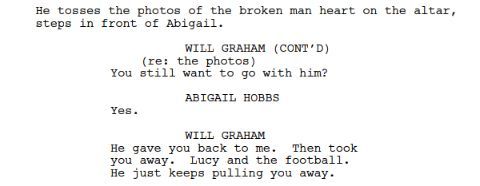
this is where i remind you that the abigail will is talking to you doesn't exist. she's nothing but a memory, a projection of himself that he's trying to appeal to.
he asks her if she still wants to leave with hannibal - which is a clue that he's talking to himself, because he knows abigail can't. he's asking himself if he honestly still wishes to run away with hannibal, and of course he does. trying to assuage that thought, to keep it out of mind, he tells abigail that hannibal took her from him. it took me a while to understand what he meant, if we're going off my idea that abigail is will trying to bargain with himself, but i may have an idea.
i think what abigail represents, like i said, is the shadow beyond the curtain. will's rare gift — he gave it to hannibal, and in mizumono, hannibal cut ties with him. he gave that rare gift back. he gave will the feeling of autonomy, of being in control of the shadow beyond his curtains — and by luring him to italy and taking up space in his mind palace again, he is taking will's gift once again and taking away his sense of normalcy. he's taking away will's comfort in his own skin, pushing him into his becoming.
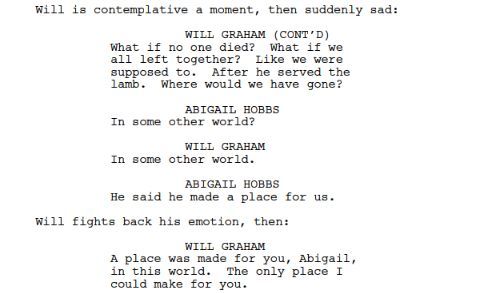
will is beginning to feel guilty for what he'd done — the surface of the curtain is ruffling, just for a moment in sync with the shadow beyond it. he aches for what could have been, what should have been — what he could have had with them. he's looking for comfort in himself.
i think it's really interesting when will says hannibal made a place only for abigail — "a place was made for you, abigail. the only place i could make for you." if we're still going by my idea that abigail is will's shadow, this means that hannibal had made a place only for what lived behind the curtains; he'd been sure of tearing them down and disposing of them, and taking only the will behind the curtains into their new life.


this is where will begins to bleed into the shadow beyond the curtains. his resignation to the fact that hannibal had built only one place for him, his ache to run away with him regardless, has pushed him through the curtains to embrace himself.
the cut opens, and blood pours out. the image of her is dying — the divide between the surface and the shadow is disappearing, blurring into each other, and will doesn't try and stop it this time.
this is his becoming.
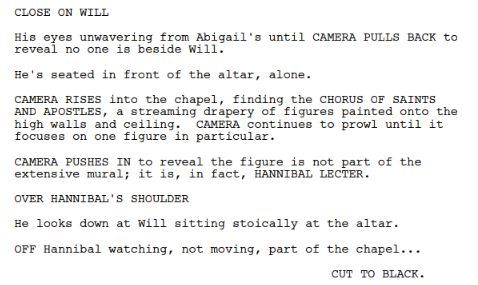
and, of course, who else is there to watch his becoming than hannibal? he's embraced the shadow, pulled those curtains aside and let the light in. his focus becomes less on himself and more on the man who drove him to it.
hannibal, projected by will's mind, allowing him to watch as his final push sends will off the (proverbial) cliff.

once will has mentally put abigail to rest, we're sent to a series of flashbacks. it shows will clinging to life and abigail succumbing to death; finalizing will's punishment from hannibal and setting the pace for the entanglement of will and abigail.
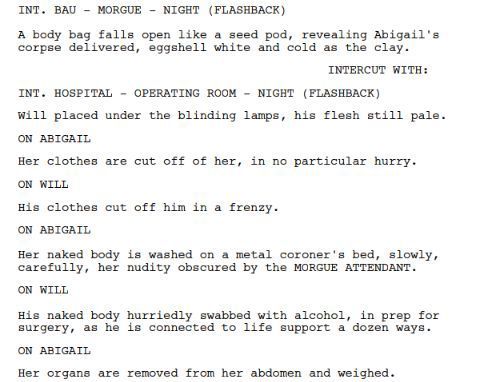



abigail's preparation and will's hospital visit are smashed together in intercut flashbacks, showing the differences between them.
will's is quick, rushed and rabid; a desperate bid to save a life. abigail's is slow, thorough — which is a mirror of their injuries, even; abigail's throat cut in a quick motion and will's abdomen gutted in slow, precise drags. she is taken apart while will is put back together — another mirror of the treatment they endured from hannibal, with abigail being made a place in the world and will's curtains being taken down.
their operations are performed in near reverse of each other, with will being sewn up and returned to normal, and abigail being deconstructed and laid to rest.
they finish on the same note — which, oddly, is the pluck of a cello string, which seems reminiscent of tobias and his methods of killing. maybe i'm reading too far into it, but ending abigail's life with a cut throat the way tobias played the orchestrator's vocal chords like a cello — while tobias was meant to be a mirror of will, and abigail was his daughter? i'll probably have to do a deeper analysis of that.
and then will comes to his senses in the church.
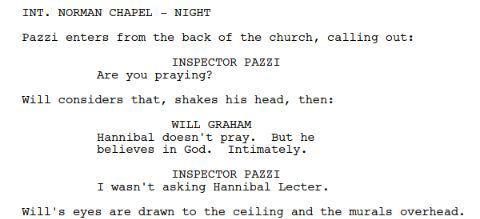
what makes me further believe that the conversation with subconscious-abigail was will's becoming is how will responds here. the lines between he and hannibal have blurred — he doesn't know where he ends and hannibal begins. he's stepped into the ripper's mindset for this tableau, and he can't step out, because that's where he's meant to be.
he even looks, again, in the murals for hannibal. even after the betrayal from both men, the urge to be seen by him — no matter the reason, but especially as he's profiling — is still there.
#[ this is all i've ever wanted for you ]#hannibal nbc#nbc hannibal#hannibal#hannibal lecter#will graham#abigail hobbs#mads mikkelsen#hugh dancy#kacey rohl#hannigram#hannibal and will#hannibal x will#hannibal parallels#hannibal analysis#long analysis#analysis#hannibal meta#meta#long meta#03x02#primavera#hannibal screenshots#hannibal script#kallie babbles#kuroshika.txt
127 notes
·
View notes
Text
Actually, let's talk about the Baba Yaga storyline
...And how much I fucking loathed it.
(A discussion of tropes, narrative choices, and how goddamn dirty The Witcher Netflix did Yennefer in S2.)
So this subplot is actually a pretty tidy object lesson in literary tropes, and why writers need to understand how tropes work in order to utilize them effectively. The trope at play here is the "Faustian bargain" or "deal with the devil," in which a character barters with a powerful supernatural creature of dubious moral alignment in order to gain something they desire (often something self-serving like wealth or power), at a price that's almost never worth it.
...It is pretty much a given that you will not be getting the better end of the deal, as it’s written. But there are a number of different ways to play this trope, and they each say something different about the kind of character who would take that bargain:
1) If you don't realize this is a trap -- if that sounded like a Pretty Sweet Deal! 😀 -- then you're either very naive or very dumb.
2) If you know it's a trap, but expect to get your prize and then weasel out of it with your soul intact anyway, because you think you're cleverer than this eldritch creature you're dealing with -- then you are very cocky, and probably wrong, because modern narratives don't tend to reward hubris.
3) If you know it's a trap, but you think you can get what you want without consequences to you, because you can pay the price with someone else's life or soul -- then you are evil. (And probably also wrong, because it's rare in fiction that you can commit an evil like that without doing some sort of spiritual damage to your own soul.)
4) And lastly, if you know it's a trap, but you are in such desperate, dire straits that even this self-evidently bad bargain looks like your best option -- then it might still be a mistake, but it's the one that audiences are most likely to forgive you for, or at least find understandable.
I don't make the rules. Those are just the audience reactions you can expect from playing the trope in those particular ways -- and if you want a different audience reaction (say, you want forgiveness for character who tried to sacrifice someone else), then you have to put in some extra work to make that happen, mitigating circumstances, etc (say, that the character genuinely believes it's the only way to save a greater number of lives).
--
So how did TWN play Yennefer's Faustian bargain with Baba Yaga?
E2 - Yen and Francesca and Fringilla meet Baba Yaga in her spirit realm or whatever, and she dangles their Heart's Desire, For A Price in front of them. Yennefer doesn’t ask for her magic, because at that point she doesn’t realize she’s lost it.
E3 through E5 - Yennefer tries without success to get her magic to work again. I don't recall any mention of Baba Yaga during that time -- it doesn't even occur to Yennefer as a means of getting it back.
E5 - Yennefer and Jaskier are being pursued by hooligans or something, and even though Yen has ducked into a brothel to hide and is nominally safe, that's when she decides to contact Baba Yaga for help. She gets whisked off to the spirit realm again, and agrees to give Baba Yaga a particular kid in exchange for getting her powers back.
She agrees to this deal knowing that she'll be sacrificing someone's child to this creature.
(And, critically, a point I’ll come back to later: she hasn't signed anything yet. She doesn't get her powers back here. That's the reward being promised for after she feeds a kid to a demon.)
E6 - Yennefer actually meets Ciri, but, notably, does not immediately swear off the plan. She's just kinda ~conflicted~ about it now.
(This was also the episode where they started trying to have Yennefer and Ciri do their mother-daughter bonding, and Yennefer says all the right things, to be sure, but since we-the-audience know that she is at least still contemplating feeding Ciri to Baba Yaga, that, uhh, RINGS KINDA FUCKING FALSE.)
E7 - Ciri reads Yennefer's mind and finds out about the plan to feed her to a demon. (Or so wikipedia tells me, since I have literally no memory of how Yennefer's Baba Yaga related plans got outed.)
E8 - Baba Yaga gets loose, possesses Ciri. Lots of high-drama CG bullshit. Yennefer sacrifices herself to become the host to get Baba Yaga out of Ciri. More CG bullshit, Baba Yaga is vanquished and leaves, and when everyone comes out of their woowoo CG trance, Yennefer has her magic back. But after that BETRAYAL, Geralt can no longer trust her.
--
So, Yennefer losing her powers is actually a subplot I'm entirely onboard for. Whenever a character loses something that is a pillar of their identity, and now has to reckon with who they are without that -- THAT'S THE GOOD SHIT. That's grief. That's loss. That is scattering the pieces of their self and seeing what happens when they have to put themselves back together again. Muah. Delicious fucking food. Peak drama.
We know that Yennefer has been raised to define herself, and stake her entire self-worth, on her magic. It's what she gave up everything for, because they told her it would be worth it, and now she has nothing -- not the magic, not the things she sacrificed for it. Of course she's searching for a way to get it back -- her first reaction is going to be denial and bargaining, not acceptance.
And I can think of two different ways you could play that arc, both of which have the potential for good, meaty character development:
The first (and the one I would have preferred) would have been an arc in which Yennefer discovers who she is without her magic -- that she comes to realize there's more to her than her power, that she's not helpless, that her worth isn't tied to having magic. We get a glimpse of that in the scene where she rescues Jaskier from Rience (my favorite scene in the whole damn season 😁😁😁) using her wits instead of her magic, and that was genuinely REALLY COOL -- it's intensely gratifying to see a character being clever instead of just magically overclocked.
They could have carried that through into her meeting Ciri as well, and realizing that she has more to offer Ciri as a mother and a friend than as a mage, that her love and support is worth more than her utility to Ciri. Yennefer reaches an enlightened understanding where she might well still want her magic back, but she doesn't need it to define herself anymore.
(This shares a lot of beats with disability narratives, and I think the sensitive way to handle it would be to treat it as such.)
The other kind of story would be one in which the character has no interest in reaching that enlightened understanding -- Yennefer’s not coming to the "acceptance" stage of loss, because she refuses to accept it. She's searching relentlessly for a cure, chasing down every lead for someone who could fix this, every avenue that might get her what she wants. Then the question becomes, "How far would you go for this? How much are you willing to sacrifice?"
And the answer is everything....... until it's not. And that is the pivotal character-making moment in this kind of story -- when you find out where this character's line is, the line they won't cross even for the sake of the thing they want most in all the world. Where the devil could dangle that oh-so-tempting bargain before them, and they would still say No. No, the cost you're asking isn't worth it, even for this. Yennefer -- who has spent her whole life being coached to be selfish, and has wound up alone and alienated for it -- finally has people she loves enough that she would choose them over herself.
--
TWN kinda went the latter route, but they didn't fully commit to it -- both the plot beats and Yennefer's emotional arc are so muddled that it's not clear what they were trying to say, and both the dramatic impact and the message got completely lost.
Problem 1: Yennefer wasn’t proactive enough.
She's sad about losing her magic, but she's not shown DOING anything about it. This is what I kept yelling at the screen about in E3, when she's just drifting aimlessly around Aretuza in that fucking prom dress and being ~helplessly damseled~ by Stregobor. Send her to the goddamn library to do some research! Show her arguing theory with Tissaia, and refusing to believe that this can't be fixed! Show us HOW BADLY she wants it, and how hard she's willing to fight for it.
Hell, seed the future conflict with Baba Yaga: Yennefer finds an account of someone who acquired their power through a deal with a demon, and she takes is to Tissaia as proof-of-concept, and Tissaia is like, yeah you CAN, but you SHOULDN'T. (Hoe don't do it!) That both establishes it to the audience as a possibility, and preemptively raises the question of what extremes Yennefer will go to in pursuit of this goal.
Problem 2: The stakes were never high enough
As I mentioned above, it's easier to get audience sympathy for a character who’s only making a devil's bargain because they're in extremis -- when something predatory has them over a barrel and is taking opportunistic advantage of the fact that they've got no other options. That hits a nerve with our sense of injustice -- we get angry when we see someone being taken advantage of like. It'll make us root for the character to find a way out of the deal somehow, because even though they agreed to it, we don’t feel that they should be held to that extortionate price.
But Yennefer is never quite desperate enough; the stakes are never quite high enough. She wants her magic back, but at no point does she need it. They never make her desperate enough to justify that bad bargain.
So raise those stakes.
Make it so that Yennefer is in desperate straits when she makes the bargain. She is in a situation that would have been trivial to escape if she'd had her magic, but now she is about to fucking DIE, and there's nothing she can do about it, and yeah, this sketchy creature that's been in her head trying to talk her into this bargain is obviously sketchy A-F, but she either takes its offer, or she dies in the next ten seconds. Them's her only two options.
Because without that level of desperation, her decision instead becomes premeditated, selfish, and stupid.
Problem 3: She needed to NOT knowingly make the evil choice.
Audiences will forgive a Faustian bargain made to save a child, but there's no way to sacrifice a child (or even seriously contemplate it) and come out of that looking good. 😬
The easiest way to fix that would have been for Yennefer to not know what the terms would be when she agreed to the bargain.
To be sure: handing a blank check to that kind of creature is a bad idea, but we've already established that Yennefer needs to be fuckin hard up when she takes that deal; she doesn't have time to negotiate or think it over, she barely has enough time to say yes.
TWN made a big mistake, imo, by not having Baba Yaga give Yennefer her powers back upfront in E5. They made an agreement, yeah, but it did not put Yennefer on the hook, in her debt. Yennefer could still have noped out at any time once she found out what the terms were, since Baba Yaga hadn't given her anything yet.
It would have been far better if Baba Yaga saved her first, restored her magic, and then presented her with the bill -- it becomes a hell of a lot harder for Yennefer to back out at that point.
(And also: get the goods upfront, because why the fuck would you trust that this sketchy creature has any intention of keeping their promise? Whoops, egg on your face, when it turns out you murdered a kid for nothing!)
Furthermore, raise the stakes on what happens if Yennefer doesn't hold up her end of the bargain: that if Yennefer doesn't deliver Ciri to Baba Yaga, then she gets eaten by the demon instead. It’s still evil to murder a child, obviously, but "their life vs my life" is a bit more of a dilemma than "their life vs my magic."
And after she meets Ciri, after Ciri becomes a real person to her rather than an abstraction, then she cannot continue to entertain the possibility of sacrificing her for another episode and a half. Full stop. Yennefer should have immediately started scrambling for "There has to be another way!" The fact that TWN-Yennefer is even still considering it after meeting Ciri says really, really shitty things about her.
(And when she does get caught out, she starts sobbing, I DIDN'T KNOW WHAT YOU WERE TO HIM!!, which is, lol holy shit, not the defense you think it is! "I totally would have sacrificed you without a qualm if you didn't happen to be my fuckboy ex's kid" ??? What? Not "because you matter to me"? Or "because I realized that what I was contemplating was FUCKING EVIL”?? And she tells Ciri that to her face?
Writers, did you stop to think about the implications of that line for one half of one hot second??)
Problem 4: Revealing Yennefer's betrayal ahead of time
By having Ciri and Geralt find out about her incipient betrayal before it happens, Yennefer never got to decide for herself that she wasn't going to go through with it. There needed to be no guilt trips or external peer pressure -- just that she herself thought this over, and decided on her own that Ciri was worth more than getting her magic back.
The fact that it wasn't her choice to come clean about that -- that the choice gets taken out of her hands before it reached the moment when she'd have decide one way or the other -- not only robbed us of what would have been a massively powerful, character-defining moment for her, but also means that we have no proof whether or not she would have done it, if left to her own devices.
Because let's be honest: Yennefer doesn't exactly have a track record of prioritizing other people above herself. Maybe she would have found her conscience in time -- or maybe she wouldn't. (She had, after all, already made this bargain knowing full well that it was going to involve sacrificing someone's kid.) It is by no means a given that she would have changed her mind.
So what a powerful moment it would have been when Yennefer throws off those teachings that tied her worth to her utility -- when she proves that she’s come to care about other people, and puts their well-being above her own. Imagine the bomb drama if Yennefer had been the one to reveal the bargain to Ciri and Geralt, ideally at the moment when she also reveals that she's rejecting it and taking their side against Baba Yaga, even at the cost of her own life. The moment when her core of steel comes through, and she takes a stand and is willing to face the consequences of her mistake.
That would have been a fantastic climax for Yennefer's character arc in S2: when she decisively shows how much she's changed from the aloof and self-absorbed (and desperately unhappy) woman that she was in S1.
But that's not what TWN gave us. There's no big dramatic moment. I literally do not even remember her sacrifice in the final battle, even though I watched S2 twice, because it got lost amid the boring-and-confusing CGI fight scene that drags on forever. Everything is supposed to be big drama there, and so Yennefer’s sacrifice doesn’t stand out.
Moreover, it doesn’t even really feel like Yennefer's choice at that point -- more that she's belatedly trying to clean up her mess, after she's already missed her chance to trade Ciri for her magic. That makes it feel a hell of a lot less sincere, like too little too late. Of-fucking-course she's sorry for it, now, now that it didn't work and everyone's mad at her. Yeah I'm sure she does regret it, now. It's just that sorry rings pretty hollow at this point.
S2 didn't give her a chance make the right choice for herself -- and as a consequence, Geralt and Ciri will never, ever know for certain what she would have done if circumstances hadn’t intervened. And realistically, there's no way for them to trust her after this; she can’t retroactively prove that she wouldn’t have betrayed them in the end, which casts a doubt that would poison that relationship forever.
--
So.
Breaking down the story into granular detail like this makes it feel almost like nitpicking, but those small situational changes make a huge difference in what the narrative is telling you about the character, and what kind of person they are. And the audience doesn't need to understand the mechanisms operating behind all of this -- but the writers fucking do. That's their job. To know what the words they write are doing, and the TWN writers manifestly do not. The Baba Yaga storyline is the most egregious demonstration of that, in my opinion, but it's far from the only one.
Through their shoddy execution of a straightforward trope, they made a character we're supposed to love and root for -- whom we want the other characters in the show to love too -- make choices that were unforgivably, murderously, short-sighted and selfish. Which is pretty obviously not what they meant to say about Yennefer, and not how we as the audience were supposed to interpret her actions, but that’s what they wrote. Thanks, I hate it.
(And worse: half this shit isn't even in-character. Yennefer doesn't fucking waffle like that. She is decisive and proactive to a fault, but this season reduced her to such a passive character who just gets shuffled from setpiece to setpiece. I think she makes all of four proactive decisions in that season -- freeing Cahir, rescuing Jaskier, making the deal with Baba Yaga, and sacrificing herself for Ciri -- and half of them were dumb.
Ugh, it's such bullshit. Yennefer deserved better.)
To be honest, I don't think the season needed the Baba Yaga plot at all, done well or otherwise. It was a misbegotten attempt to pump up fake drama, one that showed a lack of confidence in the story they were telling and a lack of respect for the audience -- like they didn't expect us to care about the found-family story without some cheap ~betrayals~ to spice it up.
But all they succeeded in doing was permanently undermining Yennefer's relationship with Ciri and Geralt, the relationship that is supposed to be one of the bedrocks of the series. That’s a betrayal you can’t come back from (except by authorial fiat, because they're ~Destined~ and so they have to). That's a well that's been poisoned.
And lastly, it puts Yennefer on the defensive now in her interactions with Geralt. Despite the fact that he was the one who overrode her free will by tying them together with djinn, the season ends with her having to grovel for his forgiveness. Geralt is now the one with the moral high ground, the injured party who gets to dispense or withhold forgiveness as he sees fit, and he's not required to make any real acknowledgment, or apology, or amends for what he did to her.
THANKS, I HATE IT.
--
So yeah, there was a lot in S2 that was Some Fucking Bullshit, but that is my narrow-focus deep dive into my single least favorite of their bad-ideas-executed-badly.
35 notes
·
View notes
Text
Buddie 611 Meta - The Sun & The World
*aka the cosmos/universe theme strikes again*
Buck has been accused of being self-centered several times in the show, especially in past season. Basically every main character at one point or another has made this claim about him. That criticism became lodged in Buck’s mind over the years. How could it not?! The people around him saw his attention-loving daredevil behavior among other things as self-centered (affectionate, because “Buck’s gonna Buck”). With Eddie, we saw him make this claim to Buck specifically about their relationship and the strain it caused several times during the lawsuit arc in s3. I think through the previous seasons, Eddie was the most vocal with this criticism and was pretty much the only one to ground this criticism in his PERSONAL relationship with Buck.
In 305 Rage, the infamous grocery store argument:
Buck: Look, man, why can’t you see my side of this?
Eddie: ‘Cause that’s all you see!
And in 306 Monsters during their reconciliation at the firehouse:
Eddie: Lotta “I”s in there. Your actions, your choices, they impact the rest of us. That’s what it means to be part of a team.
And in 309 Fallout during THE Kitchen Scene:
Eddie: Seriously? You’re gonna make it about you, again?
Basically, Buck took that past criticism to heart, like you do when you care about the people around you and you care about what they think of you to a healthy degree. That brain weasel surfaces in an interesting way in 611 via the coma dream.
But that old criticism takes on a different flavor in coma land, because the dialogue in the episode evokes the idea of a planet circling its star, which lifts it out of the realm of just Buck’s ego and places it firmly in the Cosmos/Universe symbolism that’s so interwoven with the Buckley Diaz Family!
In 611, Buck is talking to Hen and Chim about Bobby and then Buck’s mind takes and interesting turn:
Buck: My not being at the 118 is what pushed him over the edge.
Hen: Or maybe it was just some random butterfly effect and the entire world doesn’t revolve around you.
Buck: Eddie Diaz.
Hen is Buck’s “reality” check. In the coma dream, as an echo of Buck’s own thought process, she tries to humble him. But somewhere in Buck’s mind he also knows that he is deeply loved and that he matters. The whole episode was about him starting to consciously realize and accept that fact so that he could return to his real life and thrive. He’s working to replace his bravado (ultimately a performance on some level) with an understanding that he actually does matter. So, in Buck’s coma dream, when Hen evokes the idea of Buck as the sun and everyone else as the world revolving around him, she both echoes old ego wounds AND she creates space in Buck’s head for him to figure out that he’s not the center of the universe in any grand sense but that he does bring light and love to his loved ones just by being himself, a bright sun. He doesn’t fully get it in terms of Bobby until the end of the ep, but dream!Hen’s criticism initiates the workshop process of Buck truly seeing his influence in other people’s lives.
After the Bobby realization starts to percolate, Buck immediately asks about Eddie. It matters that it is immediately after Hen’s comment about the world not revolving around Buck. I’ll come back to that.
Hen: They said that Diaz was unfit. That he couldn’t be a firefighter and a single dad. He tried to bring him to the firehouse a few times, but Captain Righetti said no.
Buck: [flashback and then] Carla. He never met Carla.
Buck eventually saw his role in Bobby’s life but he dropped the ball with Eddie! Buck thinks that Eddie would have lost Christopher if he never met Carla. Our guy removes himself from that equation entirely. Despite the fact that up to the flashback point in the coma dream, Buck was the one who introduced Eddie and Carla in the queerest way possible! Buck was the one who assuaged Eddie’s fears about Chris during the earthquake and took Eddie to pick up Chris after the earthquake and went to the hospital with Eddie when Abuela broke her hip!!! Buck, it wasn’t Carla who changed Eddie’s life; you did that, my guy!! But Buck can’t see it. Not yet.
Back to my point about Buck immediately thinking of Eddie after Hen tells him the world doesn’t revolve around him. So, this is Buck’s deep dark subconscious. I took that whole exchange to mean that Buck’s world does in fact revolve around Eddie and Chris. In reality, Buck has centered Eddie and Chris since he and Eddie took vows to have each others’ backs in 201. Buck has been doing The Most since that day. He faltered in the lawsuit arc but came back strong and hasn’t wavered even a little since then, dropping everything when needed to be there for his family. The Diazes are the center of Buck’s world and some part of him knows that but that part isn’t conscious yet, hence the Chris of it all asking him to help him find his dad plus Chris’ words to him being the signal to his coma brain that he needed to get back to the hospital in order to wake up.
It’s also super important that Buck’s thought process while talking to Hen in the coma dream is about Eddie as a single dad in particular. He didn’t think of it as Eddie being without resources/support. No. He framed it as him being a single dad. That means that Buck was aware on some level that he was stepping up and stepping into a co-parenting role for Chris with Eddie!! Some part of Buck knows that he buffered Eddie against the fallout of being a single dad. Abuela had health issues and then moved back to Texas. Tia Pepa had circumstances that limited her involvement with her nephew and Chris. Carla is a paid professional (echoed in her distraction technique with the nurse!) but Buck is Eddie’s actual partner in every way. He is the one who’s keeping Eddie from truly being a single dad. Based on Buck’s coma dream, I repeat: some part of his beautiful brain knows that!!
Going back to the fandom read that “Buck is the sun” - Eddie and Chris love Buck and he’s their light especially in dark times. We’ve seen it repeatedly. It was featured in the scene where Chris and Eddie visit Buck in his room. He’s illuminated by the lamp above the bed while Eddie weeps in the dark. Even in a coma, that man is lighting up their life! But in that particular scene, Buck is a distant sun and Eddie is struggling to feel the light. Chris isn’t though. He’s right there next to the sun drawing him back out. Stars and planets, baby! Between Buck showing up for them in every way and the constant interplay of light and shadow in their scenes, Buck as the sun is pronounced in this episode. I would argue that the reverse is true as well but Buck hasn’t had the full realization that the Diazes are his sun and his family yet. *sigh*
Buck is working out his issues in 611 so that he can show up for himself AND for his family in a fully conscious way. If Chris is the Universe that energizes and holds all things in the Buckley Diaz Family, then Eddie and Buck are worlds, circling each others’ star. I may be taking the metaphor too far but I don’t care lol. Buck is moving from the subconscious awareness that Eddie and Chris are his family to a conscious awareness. It’s so damn beautiful it makes me weep.
16 notes
·
View notes
Text
Daenerys Targaryen, Martians, Eatable Ants and the Influence of The War of The Worlds on ASOIAF Part 3
January 18, 2023
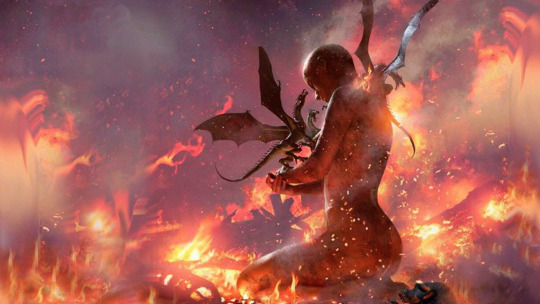
©Michael Komarck for the 2009 A Song of Ice and Fire Calendar
It’s been a long time coming, but here we are. After almost 4 years, I have finally completed my essay series on the influence of H.G Wells, The War of the Worlds (TWOTW) on A Song of Ice and Fire (ASOIAF). Before you begin, I should say that if you have not already done so, go back and first read parts one and two in the order they were written. This way, you get a better feel for the scope of what Martin has done in integrating TWOTW into his magnum opus.
In part one, I proposed that the Targaryens and their dragons represent the Martian invaders from Wells’ classic story and showed the numerous ways Martin compares them to visitors from the red planet. Then in part two, I dived deep into ants…how Wells and Martin used them in the same metaphoric way in their stories and what this might indicate about the future arc of Daenerys Targaryen.
Now in the final chapter, I take a closer look at how the Targaryen words fire and blood reverberate as deeply in TWOTW as it does in ASOIAF…pointing towards the conflagration that both the Martians and dragons will bring to the world. I also provide my theory on the location of Dany’s house with the red door and what it truly means to her and the in-world characters. Finally, I briefly discuss the clues in TWOTW that echo ones about Euron Greyjoy in ASOIAF and what they might potentially suggest about the convergence of his story with Dany’s. And so, let’s jump right in.
Fire and Blood and the Targaryen colors of red and black are not just motifs in ASOIAF. They are also layered throughout TWOTW. There is an overabundance of comparisons of the Targaryens and their dragons to the Martians in the text of ASOIAF. On the dragon side, this is especially true with Balerion and Drogon and their black fire. George plainly shows how it represents his version of Wells’ Martian’s Black Smoke.
As I noted in the post I made after the publication of part one of this essay series, George refers to Mars as the Blood and Fire planet, and wrote a long introduction for an anthology of Mars stories he edited where he discussed his lifelong fascination with the planet and its influence on him and and other writers of the genre.
Interestingly enough, he more recently mentioned in a blog post from March 2022 that he’s thinking of calling part two of F&B, Blood and Fire. This further supports my thesis that he has written the Targs as the Martians invaders of the story. ASOIAF is in a way, the story he says that he’s always wanted to write about Martians and the storied planet of Mars.
THE MARTIAN LANDSCAPE AND ASOIAF
As is the case in ASOIAF, the Targaryen words of Fire & Blood, and the colors of red and black are major motifs in TWOTW. From the beginning of the novel, Wells makes it clear that the Martians like George’s dragons were bringing a firestorm to the earth.
The storm burst upon us six years ago now. As Mars approached opposition, Lavelle of Java4 set the wires of the astronomical exchange palpitating with the amazing intelligence of a huge outbreak of incandescent gas upon the planet. It had occurred towards midnight of the twelfth; and the spectroscope, to which he had at once resorted, indicated a mass of flaming gas, chiefly hydrogen, moving with an enormous velocity towards this earth. This jet of fire had become invisible about a quarter past twelve. He compared it to a colossal puff of flame suddenly and violently squirted out of the planet, “as flaming gases rushed out of a gun.”
A singularly appropriate phrase it proved.
The War of the Worlds: The Eve of the War
I discussed many of the direct comparisons between the Targs and the Martians by George in part one. These include how the Martians’ cylinder like space ships were first thought to be meteors just like the Qarthian myth suggest was the case with the dragons of Planetos; the cylinders symbolically serving as eggs from which Martians are born on earth and how the crusted metal of their ship is described like the metallic scales on a dragon egg; the plethora of comparisons of both the Martians, Targs and their dragons to snakes; how both the dragons and Martians’ heat ray are described as swords above the world; the association of both to pits; and of course, the ants, the ants, the ants.

Elen11/Getty Images
Both Wells and George play with the idea blackness of space as a primordial sea. This is an idea that’s at the heart of many of the world’s myths and has been used by other fantasy and science fiction authors on numerous occasions.
Near it in the field, I remember, were three faint points of light, three telescopic stars infinitely remote, and all around it was the unfathomable darkness of empty space. You know how that blackness looks on a frosty starlight night. In a telescope it seems far profounder. And invisible to me because it was so remote and small, flying swiftly and steadily towards me across that incredible distance, drawing nearer every minute by so many thousands of miles, came the Thing they were sending us, the Thing that was to bring so much struggle and calamity and death to the earth.
The War of the Worlds: The Eve of the War
As the unnamed narrator looks through the telescope, it’s as if he is looking at the cosmic ocean, which is a theme that George plays with throughout ASOIAF regarding the weirwoods and being ‘under the sea.’ However, we are not here to discuss the primordial sea, but rather the emphasis put on red and black in both Wells and George’s work.
There is the blackness of space reference in the passage above, which the narrator is viewing at night from a night black observatory. There is the moving black mark on the cylinder that alerts Ogilvy to the fact that it is being opened from the inside.
And then he perceived that, very slowly, the circular top of the cylinder was rotating on its body. It was such a gradual movement that he discovered it only through noticing that a black mark that had been near him five minutes ago was now at the other side of the circumference. Even then he scarcely understood what this indicated, until he heard a muffled grating sound and saw the black mark jerk forward an inch or so. Then the Thing came upon him in a flash. The cylinder was artificial—hollow—with an end that screwed out! Something within the cylinder was unscrewing the top!
The War of the Worlds: The Falling Star
There is how Wells describes the crowd standing around the pit where the Martians were about to be born.
WHEN I RETURNED to the common the sun was setting. Scattered groups were hurrying from the direction of Woking, and one or two persons were returning. The crowd about the pit had increased, and stood out black against the lemon yellow of the sky—a couple of hundred people, perhaps.
The War of the Worlds: The Cylinder Opens
The sky turning yellow is a harbinger. A yellow sky means that a storm is brewing. This seems an apt metaphor considering what occurred on the sand dunes of Horsell Common.
Another way black is used as an important symbol is how Wells compares people to black ants as they flee from the Martians. I described the symbolic importance this in detail and how Martin uses them in the same metaphoric manner in his story, as well as what it implies about Dany’s future arc in the last chapter and so I will not do so again here.
There is also the black machine the Martians’ travel in from which they dispense their heat ray. Not surprisingly, the narrator describes it as a sword from above just as Xaro Xhoan Daxos describes Dany’s dragons.
It was sweeping round swiftly and steadily, this flaming death, this invisible, inevitable sword of heat. I perceived it coming towards me by the flashing bushes it touched, and was too astounded and stupefied to stir. I heard the crackle of fire in the sand pits and the sudden squeal of a horse that was as suddenly stilled. Then it was as if an invisible yet intensely heated finger were drawn through the heather between me and the Martians, and all along a curving line beyond the sand pits the dark ground smoked and crackled. Something fell with a crash far away to the left where the road from Woking station opens out on the common. Forthwith the hissing and humming ceased, and the black, domelike object sank slowly out of sight into the pit.
The War of the Worlds: The Heat Ray
However, the most important black motif I want to discuss is the Martian black smoke. This is most heavily crystallized in ASOIAF with Balerion the Black Dread, Drogon, and their black fire. Their fire, which produces black smoke is the symbolic stand-in for the Martian black smoke.
And from this paper my brother read that catastrophic despatch of the Commander-in-Chief:
“The Martians are able to discharge enormous clouds of a black and poisonous vapour by means of rockets. They have smothered our batteries, destroyed Richmond, Kingston, and Wimbledon, and are advancing slowly towards London, destroying everything on the way. It is impossible to stop them. There is no safety from the Black Smoke but in instant flight.
“Black Smoke!” the voices cried. “Fire!”
The bells of the neighbouring church made a jangling tumult…”
The War of the Worlds: In London

Credit: by Brendan Perkins via Lonesome Crow on DeviantArt
Note the ringing of the bells echo in response to the call of fire. We know that bells will have an important role to play in Jon Connington’s arc, and it likely will not be good news for the people. Bells also play a role in Dany’s arc in the books via the bells the Dothraki wear in their hair. This is especially important tool of fear for the Khals like Drogo.
Dany braided his hair and slid the silver rings onto his mustache and hung his bells one by one. So many bells, gold and silver and bronze. Bells so his enemies would hear him coming and grow weak with fear.
A Game of Thrones, Daenerys X
In real life whether via the church bells of distant eras, or the more recent past of bells on fire trucks, the clanging instruments have alerted the populace that there was a fire in their midst.
On the show, like was the case with the Martians in TWOTW, bells herald the start of Dany’s fiery destruction of Kings Landing. Will something similar happen in the books after the Khaleesi becomes the “stallion who mounts the world?” Only time will tell.
As Balerion and Drogon discharge their black flame onto cities and the populace, the Martians do the same. Only, they discharge their heat ray and black smoke from their walking tripods and flying machines via rockets. Whether via the dragons or the Martian machines, the powerful force of fire and smoke have similar results when used against people…immediate death.
Now here is an extremely interesting detail. The description of the Martian black smoke eerily mirrors the description of Drogon’s fire. In fact, except for a couple of words, it’s almost exactly the same.
In front was a quiet, sunny landscape, a wheat field ahead on either side of the road, and the Maybury Inn with its swinging sign. I saw the doctor’s cart ahead of me. At the bottom of the hill I turned my head to look at the hillside I was leaving. Thick streamers of black smoke shot with threads of red fire were driving up into the still air, and throwing dark shadows upon the green treetops eastward.”
The War of the Worlds: The Fighting Begins
And now here is a description of Drogon’s fire.
Above them all the dragon turned, dark against the sun. His scales were black, his eyes and horns and spinal plates blood red. Ever the largest of her three, in the wild Drogon had grown larger still. His wings stretched twenty feet from tip to tip, black as jet. He flapped them once as he swept back above the sands, and the sound was like a clap of thunder. The boar raised his head, snorting … and flame engulfed him, black fire shot with red.
ADWD, Daenerys IX
The Martians’ black smoke is shot through with red fire, while Drogon’s black fire is shot through with red. When you consider all the many other ways George compares the dragons to the Martians, the similarities in the description of these two fiery characteristics cannot be mere happenstance. It’s a deliberate comparison on George’s part.
The Martian black smoke poisons all living things it touches, while Drogon’s fire destroys everything it burns. For all practical purposes, the two are the same and both results in ashes.
And all being quiet throughout the afternoon, we started about five o’clock, as I should judge, along the blackened road to Sunbury.
In Sunbury, and at intervals along the road, were dead bodies lying in contorted attitudes, horses as well as men, overturned carts and luggage, all covered thickly with black dust. That pall of cindery powder made me think of what I had read of the destruction of Pompeii.
The War of the Worlds: Under Foot
I mentioned in part two that the description of this scene reads very much like what we saw on the show of Kings Landing after it was burnt by Dany, and what we will likely see in next book after she burns much of Essos. Also, while the black smoke is separate from the Martian heat ray, the two are often used as one.
The Martians’ black smoke is poisonous, but dragon fire likely has a similar effect on burnt cities in the immediate aftermath of its fiery destruction. Residents in such locations would find it very difficult to breath and if they lived in modern times, many would later be diagnosed with cancer, as with the case of those who lived in the downtown area of New York City after 9/11. Basically, if not resulting in immediate death, the aftereffects of fire from Balerion, Drogon and the other dragons is like a slow poison.
The Targaryen House sword carried by Aegon the Conqueror is name Blackfyre, which mirrors the description of Drogon’s flame. We have not yet seen Blackfyre on the page and have not been given a detail description of its color.
Although we can assume it is like the dark grey of House Starks Valyrian sword Ice and other such blades, I suspect that Blackfyre will be even darker…closer to black as the name implies with threads of red…Targaryen colors. It will be the total opposite to the milk glass color of Dawn, a sword the future wielder of Blackfyre seems destined to meet across the battlefield.
So now that we’ve talk about the symbolic importance of black as a motif in both books, and why Balerion and Drogon’s fire are meant to mirror the Martians’ black smoke, let’s move on to red. We will begin in the Red Waste, George’s version of the Martian landscape through which Dany travels to Qarth.
Like the meteor that herald the arrival and birth of the Martians on earth, one does the same for the birth of Dany’s dragon at the edge of the Red Waste. Dany took this as a portent from the gods and led her followers after the red comet through the waste.
The Dothraki named the comet shierak qiya, the Bleeding Star. The old men muttered that it omened ill, but Daenerys Targaryen had seen it first on the night she had burned Khal Drogo, the night her dragons had awakened. It is the herald of my coming, she told herself as she gazed up into the night sky with wonder in her heart. The gods have sent it to show me the way.
Yet when she put the thought into words, her handmaid Doreah quailed. “That way lies the red lands, Khaleesi. A grim place and terrible, the riders say.”
“The way the comet points is the way we must go,” Dany insisted … though in truth, it was the only way open to her.”
ACOK, Daenerys I
Much of what Wells speculated about the red planet…so called because of the color of the dust that layers it surface, and what scientists of the time proposed have since proven to be incorrect. However, one thing that remains constant from then to today is that of Mars is a dry, sandy red waste whose seas have dried up. Here is Wells’ version of the planet.
The secular cooling that must someday overtake our planet has already gone far indeed with our neighbour. Its physical condition is still largely a mystery, but we know now that even in its equatorial region the midday temperature barely approaches that of our coldest winter. Its air is much more attenuated than ours, its oceans have shrunk until they cover but a third of its surface, and as its slow seasons change huge snowcaps gather and melt about either pole and periodically inundate its temperate zones. That last stage of exhaustion, which to us is still incredibly remote, has become a present-day problem for the inhabitants of Mars.
The War of the Worlds: The Eve of War

The Bonneville Crater on Mars NASA/JPL/Cornell University
And here is George’s version of the Martian landscape.
There was little forage in the red waste, and less water. It was a sere and desolate land of low hills and barren windswept plains. The rivers they crossed were dry as dead men’s bones. Their mounts subsisted on the tough brown devilgrass that grew in clumps at the base of rocks and dead trees. Dany sent outriders ranging ahead of the column, but they found neither wells nor springs, only bitter pools, shallow and stagnant, shrinking in the hot sun. The deeper they rode into the waste, the smaller the pools became, while the distance between them grew. If there were gods in this trackless wilderness of stone and sand and red clay, they were hard dry gods, deaf to prayers for rain.
ACOK, Daenerys I
George’s red waste is dry and desolate but more like the real Mars than Wells whose telescopic instruments were not as technologically as advance as the ones today. However, the two are pretty close. George’s red waste, like Wells’ Mars, has little to no water, and what it does have is undrinkable. Nonetheless, the desperate travelers have no other choice but to drink it. The land is also filled with fiery dragon like symbolism with the sun beating down and the extra hot water smelling of brimstone.
The next pool they found was scalding hot and stinking of brimstone, but their skins were almost empty. The Dothraki cooled the water in jars and pots and drank it tepid. The taste was no less foul, but water was water, and all of them thirsted. Dany looked at the horizon with despair. They had lost a third of their number, and still the waste stretched before them, bleak and red and endless.
ACOK, Daenerys I
While, initially, they refused to eat because their meat was not charred, after Dany figured out this was the problem, her dragons ate and thrived. Unliked her followers.
Yet even as her dragons prospered, her khalasar withered and died. Around them the land turned ever more desolate. Even devilgrass grew scant; horses dropped in their tracks, leaving so few that some of her people must trudge along on foot. Doreah took a fever and grew worse with every league they crossed. Her lips and hands broke with blood blisters, her hair came out in clumps, and one evenfall she lacked the strength to mount her horse. Jhogo said they must leave her or bind her to her saddle, but Dany remembered a night on the Dothraki sea, when the Lysene girl had taught her secrets so that Drogo might love her more. She gave Doreah water from her own skin, cooled her brow with a damp cloth, and held her hand until she died, shivering. Only then would she permit the khalasar to press on.
ACOK, Daenerys I
Doreah, the handmaiden who warned Dany against crossing the red waste is one of the earliest of Dany’s followers to die, but Dany’s dragons are getting stronger. This makes symbolic sense as the dragons are the Martians of the story, and thus should thrived in the place of their birth. But of course, like the Martian invaders, their food and water supply are depleting and so they need another source of nourishment.
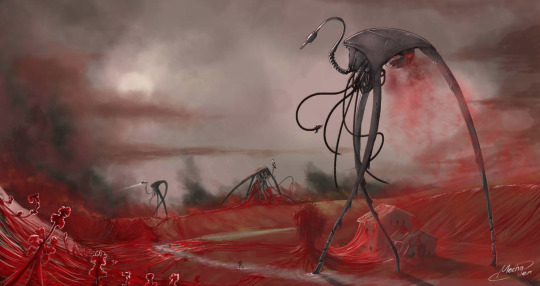
The Red Weed by Mechagen_Deviant Art_
The Martians bring with them a red weed that pretty much overtakes the landscape. It’s not clear whether they deliberately planted the weed or if it accidentally hatched a ride on their cylinders, got into the earth ecosystem and then proliferated.
And speaking of the differences between the life on Mars and terrestrial life, I may allude here to the curious suggestions of the red weed.
Apparently the vegetable kingdom in Mars, instead of having green for a dominant colour, is of a vivid blood-red tint. At any rate, the seeds which the Martians (intentionally or accidentally) brought with them gave rise in all cases to red-coloured growths. Only that known popularly as the red weed, however, gained any footing in competition with terrestrial forms. The red creeper was quite a transitory growth, and few people have seen it growing. For a time, however, the red weed grew with astonishing vigour and luxuriance. It “spread up the sides of the pit by the third or fourth day of our imprisonment, and its cactus-like branches formed a carmine fringe to the edges of our triangular window. And afterwards I found it broadcast throughout the country, and especially wherever there was a stream of water.”
The War of the Worlds: What We Saw from the Ruined House
As he has woven the story of the Martians so indelibly into Dany’s arc of ASOIAF, one would expect that George has also included something like the iconic red weed in his story and that it would be associated with Dany. And low and behold, he has done just that as Jorah describes to Dany how the Dothraki Sea looks at certain times of the year.
It was a sea, Dany thought. Past here, there were no hills, no mountains, no trees nor cities nor roads, only the endless grasses, the tall blades rippling like waves when the winds blew. "It's so green," she said.
"Here and now," Ser Jorah agreed. "You ought to see it when it blooms, all dark red flowers from horizon to horizon, like a sea of blood. Come the dry season, and the world turns the color of old bronze.
A Game of thrones, Daenerys III
It’s funny that George, describes the dark red flowers of his story like a sea of blood because Wells does something similar in his. He doesn’t specifically call it a sea, but he associates it with blood in a different way.
My first action coming to this water was, of course, to slake my thirst. I drank a great deal of it and, moved by an impulse, gnawed some fronds of red weed; but they were watery, and had a sickly, metallic taste.
The War of the Worlds: The Work of Fifteen Days
Blood of course tastes metallic because of its iron rich hemoglobin content, and so when Wells describes the red weed as tasting like metal, he wants you to think of blood.
Blood is another way that red as a motif plays an important role in the story. Like the many references to fire and black smoke from Martian weapons, Wells has numerous scenes where blood is heavily featured throughout the text.
The narrator often comes across the aftereffects of bloody scenes; people are often shown injured or getting into fights where they bleed; or in a blood rage as they fight each other for the scraps of survival. It’s to show that underneath the humans are not that different from the Martians.
However, it’s also to highlight the main reason the Martian’s came to earth. They invaded because they were looking for a new food source. Just like Dany and her followers in the Red Waste, theirs was depleted on Mars. And they found it in human blood.
They did not eat, much less digest. Instead, they took the fresh living blood of other creatures, and injected it into their own veins. I have myself seen this being done, as I shall mention in its place. But, squeamish as I may seem, I cannot bring myself to describe what I could not endure even to continue watching. Let it suffice to say, blood obtained from a still living animal, in most cases from a human being, was run directly by means of a little pipette into the recipient canal….
The War of the Worlds: What We Saw from the Ruined House
Red also appears in some trees the narrator encounters. There is a that while much smaller in nature than the Wall in ASOIAF, the narrator finds difficult to cross. When he does, he encounters some trees that are overgrown by the Martian red weed that has overtaken the land. The description of the trees as he walks underneath them can’t help but make one think of the weirwoods.
In the direction away from the pit I saw, beyond a red-covered wall, a patch of garden ground unburied. This gave me a hint, and I went knee-deep, and sometimes neck-deep, in the red weed. The density of the weed gave me a reassuring sense of hiding.
The wall was some six feet high, and when I attempted to clamber it I found I could not lift my feet to the crest. So I went along by the side of it, and came to a corner and a rockwork that enabled me to get to the top, and tumble into the garden I coveted.
Here I found some young onions, a couple of gladiolus bulbs, and a quantity of immature carrots, all of which I secured, and, scrambling over a ruined wall, went on my way through scarlet and crimson trees towards Kew—it was like walking through an avenue of gigantic blood-drops—possessed with two ideas: to get more food, and to limp, as soon and as far as my strength permitted, out of this accursed unearthly region of the pit.
The War of the Worlds: The Work of Fifteen Days
As I said, red is one of the most important motifs in TWOTW, and it is meant to signify danger from the Martians. It usually heralds their arrival or indicates their presence in the vicinity. There is the fire and blood, and red weed that I’ve already discussed, but red also appears symbolically in lights.
OF RED DOORS AND LEMON TREES
When the announcement is made that the Martians have arrived in London, a red light shines in from outside on to the ceiling of the room of the narrator’s brother. A couple of times, the narrator also sees red searchlights and a red glow in the vicinity where the Martians are located. Red is a warning both in TWOTW and in ASOIAF, which brings me to Dany’s red door.
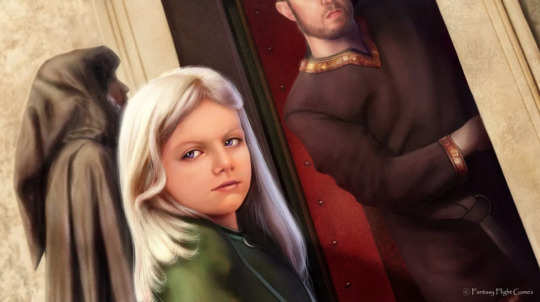
Credit: Tiziano Baracchi. © Fantasy Flight Games...via Deviant Art
All that Daenerys wanted back was the big house with the red door, the lemon tree outside her window, the childhood she had never known.
A Game of Thrones, Daenerys I
For Dany, this house with the red door represents a lost childhood and a time when she was happy. The longing to find this house with the red door is palpable throughout her arc. However, while on this surface, this seems like simply the dream of a lost and hurt child, I think that it and its color represent more.
As with Wells use of red in his story and George’s use of it in the house color of the Targaryen, I think Dany’s door being red is a warning to the reader to beware…that there is more to this symbolism than meets the eye. On a Watsonian level, Dany’s red door is also a warning to her about the danger she represents to the world of Planetos. Let’s dig in.
A few years ago, I wrote a thread on Twitter where I broke down what I think Dany’s red door means. I still hold to this theory and so I’ll copy and paste here with just a few minor corrections.
Why did George make the symbol of Dany's quest for home a red door? Well, aside from symbolically using red as a similar motif as Wells in TWOTW, I think it ties into the biblical story of the Passover. It’s the story of the world’s first known symbolic red door and you can read about it below.
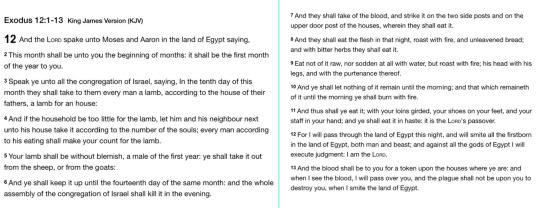
I should mention that I'm Episcopalian and the red door on our church is what made me associate Dany's door with the religious aspect of the biblical Passover. Red doors are also used on most Catholic Churches.
Red on church doors is supposed to represent a place of sanctuary. However, this is often not the case. The church and its priest not providing sanctuary is also a theme in TWOTW, but that’s a topic for another essay. My point is that George is a lapse Catholic and I’m sure he’s aware of the symbolism behind red doors and that institutional religion is often not a sanctuary.
Keeping the story of the Passover you just read in mind, what might it symbolically imply about Dany's arc and her quest for the red door? And why did dream turn into a nightmare the one time in the story she made it behind the door.
She could smell home, she could see it, there, just beyond that door, green fields and great stone houses and arms to keep her warm, there. She threw open the door.
“… the dragon …”
And saw her brother Rhaegar, mounted on a stallion as black as his armor. Fire glimmered red through the narrow eye slit of his helm. “The last dragon,” Ser Jorah’s voice whispered faintly. “The last, the last.” Dany lifted his polished black visor. The face within was her own.
After that, for a long time, there was only the pain, the fire within her, and the whisperings of stars.
She woke to the taste of ashes.
A Game of Thrones, Daenerys IX
Note George’s consistent use of black with red fire to echo both the Martian black smoke and Drogon’s flame. Based on the biblical scripture, to make it behind the red door is to be protected from the Lord's vengeance. He sent the angel of death during the night to kill all the first born of Egypt...be they people or animals. Only his people who obeyed his command to mark their door with the blood of a lamb no older than a year were protected when the angel of death came. The angel passed them over. The red door in this instance thus symbolizes protection.
However, not in the case of Dany. The protection of the red door is not available to her. And sadly, it probably never was. At least it won’t if Quaithe has her way. She emphasizes it in this and other dreams that she sends the dragon queen. Dany is the angel of death who does not belong behind the red door with the populace.
The only time Dany makes it behind the door, it occurs in her dreams, and it becomes a nightmare. She opens Rhaegar’s helm and sees not her brother, but herself. This should be a happy moment. She’s made it to home and behind the red door, where she is supposed to be safe, but of course, it’s not.
She is the angel of death and thus her being behind the red door indicates that she is a threat to the humans. Thus, her dream becomes a nightmare that foreshadows her future arc. It’s why she wakes to the taste of ashes.
But it was not the plains Dany saw then. It was King's Landing and the great Red Keep that Aegon the Conqueror had built. It was Dragonstone where she had been born. In her mind's eye they burned with a thousand lights, a fire blazing in every window. In her mind's eye, all the doors were red.
A Game of Thrones, Daenerys III
On the surface, longing for Kings Landing is just that, a longing for the home of her recent ancestors...a place she can call home. However, underneath, it maybe foreshadowing something much darker...potentially her burning of Kings Landing as on the show.
Dany’s red door and her "wake the dragon dream" have always been a signpost indicating where her story was going. The red door was never about home for her. Sadly, it’s just the opposite.
Dany thinks of herself as a god when flying Drogon in her last chapter of ADWD and so in a way, she is also the Lord sending the angel of death...in this case, Drogon among the populace.
By the way, George writes Drogon as "passing over" but Dany called him back to use him to bring the Dothraki to heel. Left alone to run wild, Drogon would have killed animals and some humans but for food only. It is in Dany’s hands, as was the case with past Targaryens and dragon lords that the beasts become weapons of mass destruction.
Thrice that day she caught sight of Drogon. Once he was so far off that he might have been an eagle, slipping in and out of distant clouds, but Dany knew the look of him by now, even when he was no more than a speck. The second time he passed before the sun, his black wings spread, and the world darkened. The last time he flew right above her, so close she could hear the sound of his wings.
A Dance with Dragons, Daenerys X
Later in the chapter after hearing Quaithe voice again in the stars, she decides to follow the shadowbinder’s advice and accept her dragon heritage.
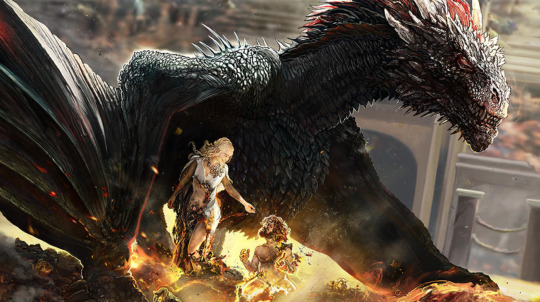
DanceOfDragons_by_ertacaltinoz_DeviantArt
Dany watched him go. When the sound of his hooves had faded away to silence, she began to shout. She called until her voice was hoarse … and Drogon came, snorting plumes of smoke. The grass bowed down before him. Dany leapt onto his back. She stank of blood and sweat and fear, but none of that mattered. “To go forward I must go back,” she said. Her bare legs tightened around the dragon’s neck. She kicked him, and Drogon threw himself into the sky. Her whip was gone, so she used her hands and feet and turned him north by east, the way the scout had gone. Drogon went willingly enough; perhaps he smelled the rider’s fear.
A Dance with Dragons - Daenerys X
Dany calls Drogon back to her and claims her dragon identity and he recognizes this change. Thus, she no longer needs a whip to control him. He now goes where she wants.
So, if Dany’s red door is meant to be seen as a warning, is it real or just a symbolic figment of her imagination. I think the answer is yes, it is real, but it also potentially a figment. What do I mean? Well, let’s first determine where the house with the red door is located.
I’m going to be as short as possible in this section as this chapter is already overlong. The topic of the red door probably deserves its own essay, but I don’t have the time to write it. There are also a couple of other important points about the influence of TWOTW on the story that I want to get to…including a brief discussion of Euron.
For years, the location of the house with the red door has been a hot topic of conversation in the fandom because, Dany says the house was in Braavos. The confusion arises because in her memory, Dany also remembers a lemon tree growing outside her window. The problem with this memory is that lemon trees and trees in general do not grow in the stone city of Braavos. I’m not going to go into the reasons why as most anyone who has read the books already know the answer, but the basic reason is a lack of irrigated water.
Some sides of the fandom have proposed that yes, Dany was raised in Braavos…at the Palace of the Sealord. He is rich and is said by Syrio Florel among others to have exotic creatures walking the grounds of his estate. Thus, if anyone resident could be said to be able to afford to have an irrigated system to channel water from the canals, it would be the Sealord. Thus, maybe it’s possible that Dany is remembering a house on the Sealord’s estate. Or maybe not.
Doran Martell also tells his daughter Arianne that she was promised to Dany’s brother Viserys as bride. An agreement signed and witness by Oberyn for House Martell and the Sealord as representative for Viserys. There seems to be no reason for Doran to lie about this story, and it fits with his tendency to play the long game. The Sealord also never leaves Braavos, and so, if such a pact was signed, it must have happened in that city and Dany and Viserys must have resided there. If not, why would the Sealord bear witness. This also supports the theory that Dany is remembering the Sealord’s house. But then again, maybe not.
Another popular option proposed by fans is that Dany was hidden away and raised in Dorne and that’s where the pact was signed. After all, it’s established on multiple ocassions in the text that Dorne is where lemon trees grow. It’s mentioned so often that I see it as one of George’s shiny apples. And by that, I mean that he hides the truth in plain sight and then by sleight of hand, makes the reader look in another direction. There are a lot of shiny apples in the text, and one day, I may write an essay about them.
I say that Dorne and the lemon trees that grow there are a shiny apple because I think that Dany was raised exactly where she says she was…in Braavos. Only, I don’t think that it was at the Sealord’s Palace. If not there, the question then becomes where?
Well, I think that the answer can be found in Dany’s dreams and the one constant other than Jorah, and her Dothraki khalasar that have been with her throughout her story thus far…Quaithe, the shadowbinder from Asshai. Quaithe is not always there with Dany in person, but her presence is always felt.
In AGOT, the stars whisper to Dany during her wake the dragon dream as I showed in the passage I posted above. We don’t know then that it’s Quaithe but we start getting an inkling that she will have an important role to play in Dany’s story when she shows up in person in A Clash of Kings.
The woman in the lacquered wooden mask said in the Common Tongue of the Seven Kingdoms, "I am Quaithe of the Shadow. We come seeking dragons."
"Seek no more," Daenerys Targaryen told them. "You have found them."
______
Last of the three seekers to depart was Quaithe the shadowbinder. From her Dany received only a warning. "Beware," the woman in the red lacquer mask said.
"Of whom?"
"Of all. They shall come day and night to see the wonder that has been born again into the world, and when they see they shall lust. For dragons are fire made flesh, and fire is power."
When Quaithe too was gone, Ser Jorah said, "She speaks truly, my queen . . . though I like her no more than the others."
A Clash of Kings, Daenerys II
Quaithe turns up again a little later in ACOK, this time with a warning and a bit of cryptic advice for Dany.
“The woman took a step backward. “You must leave this city soon, Daenerys Targaryen, or you will never be permitted to leave it at all.”
Dany’s wrist still tingled where Quaithe had touched her. “Where would you have me go?” she asked.
“To go north, you must journey south. To reach the west, you must go east. To go forward you must go back, and to touch the light you must pass beneath the shadow.”
Asshai, Dany thought.
A Clash of Kings, Daenerys III
By the way, I think that Quaithe’s riddle is another of George’s shiny apple, and I’ll discuss why if I ever write that essay on the topic.
Dany next has an encounter with Quaithe in A Storm of Sword, only this time she is not there in person, but instead communicates with Dany via a glass candle and again peppers her with the cryptic riddle.
She woke suddenly in the darkness of her cabin, still flush with triumph. Balerion seemed to wake with her, and she heard the faint creak of wood, water lapping against the hull, a footfall on the deck above her head. And something else.
Someone was in the cabin with her.
“Irri? Jhiqui? Where are you?” Her handmaids did not respond. It was too black to see, but she could hear them breathing. “Jorah, is that you?”
“They sleep,” a woman said. “They all sleep.” The voice was very close. “Even dragons must sleep.”
She is standing over me. “Who’s there?” Dany peered into the darkness. She thought she could see a shadow, the faintest outline of a shape. “What do you want to me?”
“Remember. To go north, you must journey south. To reach the west, you must go east. To go forward you must go back, and to touch the light you must pass beneath the shadow.”
“Quaithe?” Dany sprung from the bed and threw open the door. Pale yellow lantern light flooded the cabin, and Irri and Jhiqui sat up sleepily.
A Storm of Swords, Daenerys III
She next has two encounters with Quaithe is in ADWD.
“They sleep,” came the answer.
A woman stood under the persimmon tree, clad in a hooded robe that brushed the grass. Beneath the hood, her face seemed hard and shiny. She is wearing a mask, Dany knew, a wooden mask finished in dark red lacquer. “Quaithe? Am I dreaming?” She pinched her ear and winced at the pain. “I dreamt of you on Balerion, when first we came to Astapor.”
“You did not dream. Then or now.”
“What are you doing here? How did you get past my guards?”
“I came another way. Your guards never saw me.”
“If I call out, they will kill you.”
“They will swear to you that I am not here.”
“Are you here?”
“No. Hear me, Daenerys Targaryen. The glass candles are burning.
________
“If you have some warning for me, speak plainly. What do you want of me, Quaithe?”
Moonlight shone in the woman’s eyes. “To show you the way.”
A Dance with Dragon, Daenerys II
Does it seem as if Quaithe wants Dany to trust only her? It does to me.
Dany’s final encounter with Quaithe happens in her last chapter of ADWD. And it is here that we get confirmation that she has always been the whisperer of stars in Dany’s dreams.
She dreamed. All her cares fell away from her, and all her pains as well, and she seemed to float upward into the sky. She was flying once again, spinning, laughing, dancing, as the stars wheeled around her and whispered secrets in her ear. "To go north, you must journey south. To reach the west, you must go east. To go forward, you must go back. To touch the light you must pass beneath the shadow."
"Quaithe?" Dany called. "Where are you, Quaithe?"
Then she saw. Her mask is made of starlight.
"Remember who you are, Daenerys," the stars whispered in a woman's voice. "The dragons know. Do you?"
A Dance with Dragons, Daenerys X
Dany perceives Quaithe as speaking to her via the stars, whispering as it were. Thus, we realize that when the stars whispered to her during her wake the dragon dream back in A Game of Thrones, it was likely Quaithe at that time as well, communicating with Dany via a glass candle.
"What feeds the flame?" asked Sam.
"What feeds a dragon's fire?" Marwyn seated himself upon a stool. "All Valyrian sorcery was rooted in blood or fire. The sorcerers of the Freehold could see across mountains, seas, and deserts with one of these glass candles. They could enter a man's dreams and give him visions, and speak to one another half a world apart, seated before their candles. Do you think that might be useful, Slayer?"
"We would have no more need of ravens."
A Feast for Crows, Sam V
I fully expect to discover that Marwyn knows Quaithe. After all, we know from Miri Maz Duur that he was in Asshai. He is the one who taught her about the human body. I suspect that Quaithe in turn taught Marwyn, and a lot more than just the secrets of the body. After all, Quaithe is a shadowbinder from Asshai, where dragons are said to come from and which others in the fandom have proposed, may have been the ancient capital of the Great Empire of the Dawn. A theory that I endorse.
In Dany’s “wake the dragon” dream, Quaithe sends her a vision of her ancestors. Why?
Ghosts lined the hallway, dressed in the faded raiment of kings. In their hands were swords of pale fire. They had hair of silver and hair of gold and hair of platinum white, and their eyes were opal and amethyst, tourmaline and jade. "Faster," they cried, "faster, faster." She raced, her feet melting the stone wherever they touched. "Faster!" the ghosts cried as one, and she screamed and threw herself forward. A great knife of pain ripped down her back, and she felt her skin tear open and smelled the stench of burning blood and saw the shadow of wings. And Daenerys Targaryen flew.
A Game of Thrones, Daenerys IX
George gave us a bit more history on these ancient Targaryen ancestors when he dropped this ditty in TWOIAF history book.
Dominion over mankind then passed to his eldest son, who was known as the Pearl Emperor and ruled for a thousand years. The Jade Emperor, the Tourmaline Emperor, the Onyx Emperor, the Topaz Emperor, and the Opal Emperor followed in turn, each reigning for centuries...yet every reign was shorter and more troubled than the one preceding it, for wild men and baleful beasts pressed at the borders of the Great Empire, lesser kings grew prideful and rebellious, and the common people gave themselves over to avarice, envy, lust, murder, incest, gluttony, and sloth.
When the daughter of the Opal Emperor succeeded him as the Amethyst Empress, her envious younger brother cast her down and slew her, proclaiming himself the Bloodstone Emperor and beginning a reign of terror. He practiced dark arts, torture, and necromancy, enslaved his people, took a tiger-woman for his bride, feasted on human flesh, and cast down the true gods to worship a black stone that had fallen from the sky. (Many scholars count the Bloodstone Emperor as the first High Priest of the sinister Church of Starry Wisdom, which persists to this day in many port cities throughout the known world).
The World of Ice and Fire, The Bones – Beyond YiTi
Based on the similarity in the descriptions of the ancient people from the GEOTD to the ancestors in Dany’s vision, the fandom, I think correctly assumed that they are one and the same. I propose that their appearance in Dany’s vision isn’t just about a generic ancestral line, but rather to clue us in that Targaryen genetic blood line can be traced all the way back to the Bloodstone Emperor.
In fact, I think that the Blackfyre is the first Valyrian steel blade. It’s the red “sword of heroes” Melisandre constantly references, and its heritage can be traced all the way back to the Bloodstone Emperor. The blood of the Amethyst Empress or Nissa Nissa, if you want to call her that went into the forging of that sword. There is more to it than just the forging of the sword as it also had to do with the BE’s attempt to gain access to the weirwoods, but I think that Blackfyre is his sword, and it has been passed down through the Targaryen line since then.
All the dark arts referenced in the history books are still practiced in the Shadowlands from where Quaithe hails. Quaithe whispering to Dany through the stars, strongly suggests as others have proposed that she is a member of the Church of Starry Wisdom originally started by the BE. I also think that the church has been keeping a close on and watching over the Targs through the many generations since the height of the GEOTD, and it was a member of the church who sent the dreams to Daenys the Dreamer about the coming fall of Valyria.
I would not be surprised to discover that the church was somehow involved with what happened in Valyria. I think that their goal is again to attempt the deepest of the dark arts, and Dany is the unknowing guinea pig to help Quaithe and other senior members of the church achieve their goals.
Also, Dany’s ability to hear the whispering through the stars, suggests that she may have been unknowingly exposed to the church’s trainings. And I don’t mean that she’s literally hearing thoughts through the stars. It’s about symbolism and her knowing to associate Quaithe with them.
Therefore, I proposed that the house with the red door she remembers, is the Church of Starry Wisdom in Braavos. The red door is either the entrance door or on a building on the church’s estate. It was there that Dany picked up some unknowing little knowledge about scrying to the stars…maybe even by using a glass candle.
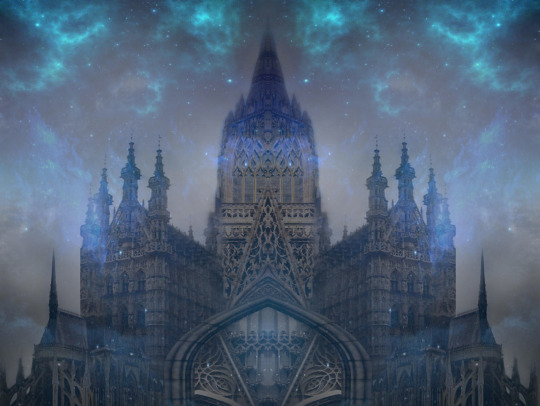
Church of Starry Wisdom by Cyprus-1 - Deviant Art
As I stated up thread, red doors are often associated with churches. However, we don’t know the color of the one on the door of the COSW in Braavos. The only reference we have to it in the text is from Arya when she walks by as Blind Beth.
As she made her way past the temples, she could hear the acolytes of the Cult of Starry Wisdom atop their scrying tower, singing to the evening stars.
A Dance with Dragons, The Blind Girl
The door to the church could be red. We don’t know. However, I don’t think that it is. I think that the red door that Dany remembers is an interior one…behind the main entrance.
She was walking down a long hall beneath high stone arches. She could not look behind her, must not look behind her. There was a door ahead of her, tiny with distance, but even from afar, she saw that it was painted red. She walked faster, and her bare feet left bloody footprints on the stone.
A Game of Thrones, Daenerys IX
Halls are interior walkways and so the fact that she is in one with stone arches suggests that she is in some type of courtyard and the red door of her memory opens out from there. This still leaves the question of the lemon tree, which after all, do not grow in Braavos.
If she did stay in Braavos and there are no lemon trees in the city, then how do we explain the mystery. My answer is that while I think that Dany stayed at the Church of Starry Wisdom while in Braavos, the lemon tree, and quite possibly the house with the red door are things of the past that Dany viewed through a glass candle, possibly even from as far back as ancient Asshai when it was a robust seafaring port city. After all, we don’t yet know the full magical aspects of the candles.
Another explanation for the missing lemon tree and red door is that the two are simply metaphors and George is playing with the idea of the golden apples from the Garden of Hesperides. There are many myths of the golden apples in many different cultures including Greek where they play into the myths of Hercules, Hera, Atlanta, and Paris of Troy and the Trojan War. There is even an Irish myth of the golden apple branch.
In the Hercules myth, the golden apples grown in the Garden of Hesperides, sacred to Hera. The apples and the garden were guarded by the dragon Ladon. Modern scholars think that the golden apples were actually a citrus fruit...either an orange or a lemon. George might be playing with the idea of them being lemons.
I mention this of course because of the dragon connection but also because the apples in most of the myths, granted immortality or access to the underworld, a theme which is strongly at play in ASOIAF.
George also seems to be playing with the idea of the golden apples in the ancient myth of one of the daughters of Garth Greenhand, Rowan Gold-Tree...
who was so bereft when her lover left her for a rich rival that she wrapped an apple in her golden hair, planted it upon a hill, and grew a tree whose bark and leaves and fruit were gleaming yellow gold, and to whose daughters the Rowans of Goldengrove trace their roots.
The World of Ice and Fire, The Reach: Garth Greenhand
The thing is that if George is symbolically playing with this idea and Dany is supposed to be the dragon guarding the red door...possibly a symbolic access point to the underworld, she abandoned or was force to abandon her post, and so we will have to see what that potentially means.
And there you have it. My theory about Dany’s possible explanations for Danys infamous red door with the lemon tree outside the window. Tinfoil? Possibly…only maybe not.
I’ve discussed in this and the previous two chapters the many ways in which George compares his dragons to Wells’ Martians. However, there is one other comparison that Wells makes in his story that George echoes in his that I want to mention. Only this time, the comparison is not to Dany and her dragons but to another character.
OF DANY AND EURON
And so, I will wind things down and leave you with these final passages and how they play into the arc of this character from ASOIAF. First, we will again briefly revisit the red weed and black smoke.
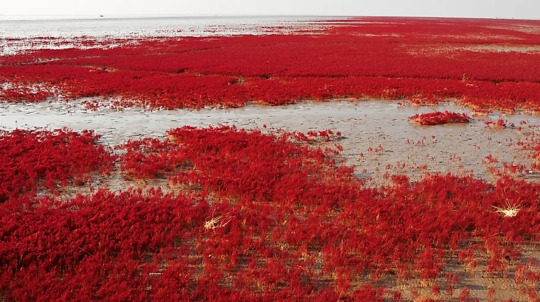
Panjin Red Beach marsh landscape_World Atlas
At Putney, as I afterwards saw, the bridge was almost lost in a tangle of this weed, and at Richmond, too, the Thames water poured in a broad and shallow stream across the meadows of Hampton and Twickenham. As the water spread the weed followed them, until the ruined villas of the Thames valley were for a time lost in this red swamp, whose margin I explored, and much of the desolation the Martians had caused was concealed.”
The War of the Worlds: The Work of Fifteen Days
________
“About one o’clock in the afternoon the thinning remnant of a cloud of the black vapour appeared between the arches of Blackfriars Bridge. At that the Pool became a scene of mad confusion, fighting, and collision, and for some time a multitude of boats and barges jammed in the northern arch of the Tower Bridge, and the sailors and lightermen had to fight savagely against the people who swarmed upon them from the riverfront. People were actually clambering down the piers of the bridge from above.
When, an hour later, a Martian appeared beyond the Clock Tower and waded down the river, nothing but wreckage floated above Limehouse.”
The War of the Worlds: The Thunder Child
______

A Martian fighting-machine battling with HMS Thunder Child. (Corréa, 1906)
“About a couple of miles out lay an ironclad, very low in the water, almost, to my brother’s perception, like a water-logged ship. This was the ram Thunder Child. It was the only warship in sight, but far away to the right over the smooth surface of the sea—for that day there was a dead calm—lay a serpent of black smoke to mark the next ironclads of the Channel Fleet, which hovered in an extended line, steam up and “ready for action, across the Thames estuary during the course of the Martian conquest, vigilant and yet powerless to prevent it.”
The War of the Worlds: The Exodus from London
Consider now this conversation between Jon and Melisandre.
"We've had a raven from Ser Denys Mallister at the Shadow Tower," Jon Snow told her. "His men have seen fires in the mountains on the far side of the Gorge. Wildlings massing, Ser Denys believes. He thinks they are going to try to force the Bridge of Skulls again."
"Some may." Could the skulls in her vision have signified this bridge? Somehow Melisandre did not think so. "If it comes, that attack will be no more than a diversion. I saw towers by the sea, submerged beneath a black and bloody tide. That is where the heaviest blow will fall."
A Dance with Dragons - Melisandre I
In the excerpt from TWOTW, we see that the bloody tide of the Martian red weed literally causes the Thames to flood London, which at the time was the premier English city of learning. London with its famous Tower Bridge and its two towers. We also see that the black smoke and fires from the Martian Heat Ray are destroying the British Fleet.
Juxtaposed those passages with Melisandre vision from ASOIAF. Mels has a vision of a symbolic bloody tide submerging towers by the sea. Her bloody tide echoes that of the red weed and black smoke flooding London and its countryside.
In ASOIAF, all evidence suggests that George’s version of the bloody tide will be caused by Euron as he and the Ironfleet attack Oldtown, the premier city of learning in Westeros and home to two major towers…the Hightower and the Citadel. Poor Quentyn famously broke down this theory in his Eldritch Apocalypse essay.
The rivers will be red with blood after the Ironborn attack, and any of the Redwyne fleet that were not previously destroyed, and or others put into play by Tyrells or Hightowers will be as defenseless against the Ironfleet as the British Navy is shown to be against the Martians.
There is also the potential for a real flood if shards of meteors hit planetos as has been proposed by Lucifer Means Lightbringer. This echoes the flooding caused by the Martians because as I discussed in part one, the Martian cylinders were at first thought to be meteors.
The bloody tide is not the only comparison George makes in his story to Euron and the events in The War of the Worlds.
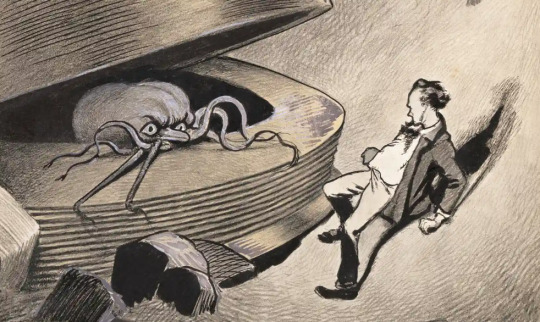
Illustration from original edition of HG Wells’s War of the Worlds, Public Domain
“Once a leash of thin black whips, like the arms of an octopus, flashed across the sunset and was immediately withdrawn, and afterwards a thin rod rose up, joint by joint, bearing at its apex a circular disk that spun with a wobbling motion. What could be going on there?”
The War of the Worlds: The Heat Ray
_______
“I talked with these soldiers for a time; I told them of my sight of the Martians on the previous evening. None of them had seen the Martians, and they had but the vaguest ideas of them, so that they plied me with questions.
“ ’Ain’t they got any necks, then?” said a third, abruptly—a little, contemplative, dark man, smoking a pipe.”
“I repeated my description.
“Octopuses,” said he, “that’s what I calls ’em. Talk about fishers of men—fighters of fish it is this time!”
The War of the Worlds: The Fighting Begins
Although this next excerpt has not yet officially appeared on the page, we learn about from George’s reading of an excerpt of The Winds of Winter at a convention, which fans such as Poor Quentyn and others recorded, transcribed, and shared with the rest of the fandom. Thanks guys!
The dreams were even worse the second time.
He saw the longships of the Ironborn adrift and burning on a boiling blood-red sea. He saw his brother on the Iron Throne again, but Euron was no longer human. He seemed more squid than man, a monster fathered by a kraken of the deep, his face a mass of writhing tentacles. Beside him stood a shadow in woman’s form, long and tall and terrible, her hands alive with pale white fire. Dwarves capered for their amusement, male and female, naked and misshapen, locked in carnal embrace, biting and tearing at each other as Euron and his mate laughed and laughed and laughed...
The Martians are compared to octopuses while Aeron views Euron as looking like a squid. Pretty much the same thing.
And what about the woman whose hands are alive with pale white fire. There has been much discussion in the fandom over who the woman might be with suggestions ranging from Dany to Cersei, to even Viserion as the dragon’s fire is pale white. As it is said that dragons can be both sexes, this theory assumes that Viserion is currently female.
Like dragons, the Martian’s have no discernable sex. However, unlike dragons who lay eggs, their procreation method seems to mimic that of flowers.
In the next place, wonderful as it seems in a sexual world, the Martians were absolutely without sex, and therefore without any of the tumultuous emotions that arise from that difference among men. A young Martian, there can now be no dispute, was really born upon earth during the war, and it was found attached to its parent, partially budded off, just as young lilybulbs bud off, or like the young animals in the fresh-water polyp.
The War of the Worlds: What We Saw from the Ruined House
I for one think the woman with hands with pale white flame is meant to represent Dany. While there is no female Martian, as I’ve discussed, the Targs and their dragons are heavily compared to the alien invaders and their fiery black smoke. And like the Martians, they bring fire and blood. Funnily enough, while there is no figure of a woman involved, there is a scene in TWOTW makes one think of the Euron excerpt. We get a hint that the woman with Euron is Dany in another of Melisandre’s memory of her vision.
“Visions danced before her, gold and scarlet, flickering, forming and melting and dissolving into one another, shapes strange and terrifying and seductive. She saw the eyeless faces again, staring out at her from sockets weeping blood. Then the towers by the sea, crumbling as the dark tide came sweeping over them, rising from the depths. Shadows in the shape of skulls, skulls that turned to mist, bodies locked together in lust, writhing and rolling and clawing. Through curtains of fire great winged shadows wheeled against a hard blue sky.”
A Dance with Dragons, Melisandre I
I’m not sure about the symbolic implication of the white fire in either instance, but the one with Euron does show George being consistent in echoing events in TWOTW. Let’s look at the passage in question.
The air was full of sound, a deafening and confusing conflict of noises—the clangorous din of the Martians, the crash of falling houses, the thud of trees, fences, sheds flashing into flame, and the crackling and roaring of fire. Dense black smoke was leaping up to mingle with the steam from the river, and as the Heat-Ray went to and fro over Weybridge its impact was marked by flashes of incandescent white, that gave place at once to a smoky dance of lurid flames. The nearer houses still stood intact, awaiting their fate, shadowy, faint, and pallid in the steam, with the fire behind them going to and fro.
The War of the Worlds
Dany represents the incandescent white fire, or in George’s parlay, the woman with hands of pale white fire.
Also, as I briefly discussed here, George has associated both Dany and Euron with storms for a reason. It gives them something in common and we the readers should wonder about this commonality. We should also ponder what might happen if these two storms merge and possibly generate a Fujiwhara Effect.
So, we come to the end of this series, that’s been 4 years in the writing. What are your thoughts? What do you think George writing Dany, the Targs and Euron like Martian Invaders will mean? Finally, what do you think of my red door theory…tinfoil? All thoughts welcome.
And yes, I will finish the Florian and Jonquil, and Dragon vs the Wolf series. I promise.
If you didn’t take my advice and read this chapter before reading the first two, you can go back and read them at the links below.
The War of the Worlds is a pretty short book…about 300 pages, and so if you want to read it for yourself to see other comparisons I didn’t include…and there are more, prices for the Apple e-book starts as low as $2.99. Or if you prefer a listen, check out the dulcet sounds of Robert from In Deep Geek as he reads the entire book on his second YouTube channel, The Well Told Tale.
PART ONE
PART TWO
GRRM’s ESSAY ON MARS
No doubt I will re-read and find numerous typos that I will have to go back to fix but here it is. Thanks for reading.
ETA 1/26/23...As expected, I found a few typos, which I fixed. I also added some sections header and a second quote from Melisandre’s visions pertaining to Dany and Euron.
#asoiaf#asoiaf meta#literary comparasion#war of the worlds#george rr martin#hg wells#daenerys targaryen#euron greyjoy#storm cloud meta#daenerys endgame#daenerys endgame analysis#asoiaf analysis#long meta#scr meta
20 notes
·
View notes
Text

Expertise can't help you here.
#dungeon meshi#kabru#laios touden#falin touden#Happy Thistle Thursday once again. Have I been holding on to this comic for several weeks? Sure have!#I forgot how long it takes for Chimera Falin to come into play.#I still really love my 'better drawn' art of her - unfortunately it was several weeks too early for the anime only folks.#Slowly getting the hang of drawing Laios. I don't know why I struggle so much but I am getting...somewhere.#Meta time: God damn I love how the chimera shows off the expertise and gap between Kabru and Laios.#The truth is: they are both *right* and they are both *wrong*.#This creature is a combination of monster and human and they only have the skillset to deal with one of those.#Kabru goes for all the human vitals - but she isn't human.#Laios tries to approach her as a monster and is struck down by the humanity he sees in her.#She is something new that defies what they *both* understand about the world. And that makes her such a perfect antagonist.#The damsel was the dragon all along!#...She is really so cute though. Terrifying! But adorable. I am so excited to see the boom of fanart for her.
45K notes
·
View notes
Text
I am having a lot of thoughts about the Christopher of it all right now in light of this bts we got from Gavin!!!
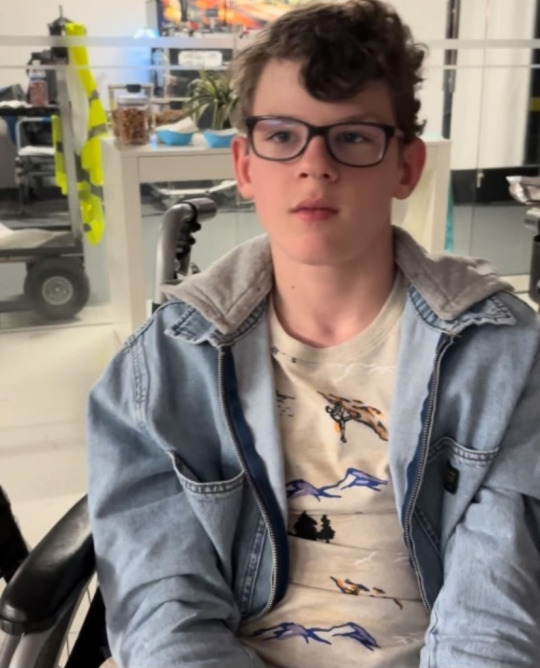
Because - Mountains and rock climbers and forests!!!
Look I've already climbed onto the Eddie and mountains to climb train in this post here but I'm about to make it a Diaz boys have mountains to climb train!!!
So Eddie now has a photograph - in black and white - of Half Dome on his bedroom wall - right above his bed

And then he has a lone cowboy on a horse - on the opposite wall - a cowboy on a horse in a flat landscape (which is yellow/orange - and with the blue walls also therefore plays into yellow blue theory)...
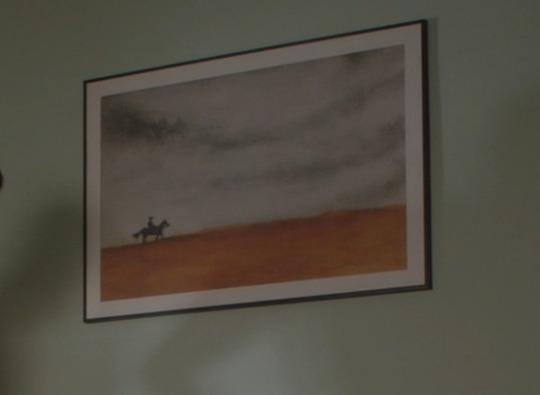
...and there is just something about Eddie sitting in his bed - looking at a picture of what is essentially a lone ranger in a barren landscape, on a wall that Buck helped him repair, while behind him is this looming mountain that is notoriously difficult to climb - the thing he can see when he is having sex with M - upside down.
The rest is under the cut because being brief is not my wheelhouse!!
Something about playing into the idea that Eddie has been this lone ranger in a barren landscape - searching for something - an something about how that search in this barren landscape is hiding (happening) the holes in the wall that Buck helped him patch up - something about how he feels alone even though the help he needed and wanted is already there - just hidden out of sight.
How that mountain is looming behind him also out of sight. How Eddie is in t his good place right now, but there are still mountains for him to climb - how those mountains are connected to his past.
There is also something in the choice of black and white for the image - something about the thing Eddie needs to deal with - the mountain he needs to climb is black and white - Obvious - not a complex myriad of colour (something something about his catholic guilt being obvious - black and white - something about it being a part of him that is finite and defined and not changeable - something like being gay perhaps!!)
Then there is the fact that we can make a fair assumption, based on the fact that we were shown Buck helping him fix the holes, that Buck helped Eddie with all of the redecorating - that he helped him paint the room (and choose the lovely duck egg blue colour), helped him hang the pictures - helped him choose the artwork for his walls - implicitly tying Buck to that mountain - that his feelings etc tied to Buck are his mountain still to climb. The thing with this as a concept is that it also plays into the upside down on the bed with Marisol - things being wrong or upside down/ backwards with her - that the spectre of Buck looms large over their relationship.
The otehr thiing I'd like to point out is kind of the biggest thing of them all and plays into the two cut lines and red string of fate of it all. Because Half Dome has a permanent cable tether for climbers attempting to summit to use and the metaphor of that is fascinating to me. There is something in the idea of Eddie feeling untethered, but also in Eddie not fully trusting he has a tether. How Eddie still hasn't fully grasped the permanence of Buck in the Diaz family's life - in Eddies life. Eddie needs to scale that mountain and buck is metaphorically speaking the half dome permanent cable run. Eddie might've made him a permanent fixture from a legal perspective - but that was for Chris, not for him (and Chris has already figured out Bucks permanence if you ask me - he already ran to Buck and opens up to him in a way he can’t with his father) but Eddie still doesn’t fully trust that the support he has in his life through Buck is permanent rather than a temporary tether. Eddie is almost there - but not quite - it feels like there is something in Bucks coming out to him that will be the catalyst for him to figure that out (don't ask me what or how - I haven't figured that bit out yet but it has something to do with the whole nothing has changed between us and Eddies dawning realisation of that that gives him his own confidence to make changes in the same way Buck has!)and start his climb so he can explore the mountain (his queerness) safely.
But back to Christophers t-shirt and how it fits into everything. Christopher has his own mountains to climb - dealing with his feelings of being abandoned by his mom - by being abandoned by the women in his life - because we need to remember that Abuela is also now absent from his life as she is now back in Texas. How Ana also left and how we've very much not been shown Carla at all (or had mention on her I think) this season. we can even, by virtue of the relationship Chris and Buck share, include Taylor leaving (being kicked to the curb) as part of the list of women exiting his life in some way.
Bringing up Shannons letter and having Chris read it at the very start of the season, for me is a clear indicator that that is the arc he is going to go through this season - that while there are still elements of the Shannon of it all in Eddies story, it is actually Christopher who needs to let that ghost go and move forward, not Eddie.
911 loves to play with imagery - they excel at it in the Diaz house, and I talk about how the kids costuming on the show is always so deliberately chosen to reflect their arcs, Especially with Chris. So here we have Chris in a t-shirt with mountains, trees and climbers on - setting up the idea of exploring him climbing that mountain he has to climb, but also playing on the idea that he's a bit caught in a forest as well - cannot see the wood for the trees. It a great metaphor for his current abandonment issues - because he is still a bit too young to fully comprehend that some people are not meant to stay in your life in a permanent way or that sometimes, just because they are not physically present in a regular way, doesn't mean they have abandoned you. Hell that is a difficult thing for many adults to comprehend, so to ask a kid to - especially one who's hormones are starting to go crazy - is never going to be practical.
The fact they’ve very deliberately not shown him actually interacting with with Marisol before now - establishing her as existing in Christopher’s world but not actively being a part of it - really ensuring to set her apart and off to the side - apart form establishing the contrast between Shannon and Marisol, is so interesting and feels, to me at least, like it’s building up to possibly playing into some version of the idea of you’re not my mother etc etc. They've taken great care to establish Shannon as Christophers mother - that she is still a major presence in his life, even in her absence.
They're is also something in the way that the idea of Marisol being 'portrayed' (can't think of the right word but I hope you know what I mean) as essentially a babysitter - we've never been shown them interacting - just told that Eddie has been getting her to babysit and in tv show land if you want to tell the audience that two characters have a good relationship (of whatever form) - you show it - you don't allude to that relationship as existing - especially when you are developing a narrative around a child's fear of being abandoned by the women in his life - not showing her looking after Chris before this point, and after you have established said abandonment issue, just reenforces the nature of their relationship - that it is one Chris is not likely to be engaging in - because she's going to leave anyway so what is the point of getting attached.
Now this is interesting because it feeds into Eddies arc rather nicely - its an arc they have already established with the audience - his jumping in too quickly and without thinking things through properly. it also plays back into an already existing arc - the one where he does things for Christopher and not for himself. they are to all intents and purposes the same thing. Eddie lets Shannon back into his life - for Christopher, he re-proposes not for himself, but for Christopher and the second baby he thinks is coming, he starts dating Ana for Christopher not for himself, he Makes Buck Christophers legal guardian for Christopher (even though at this point we don't know if Chris knows this fact), yes a part of that id for himself as well, but it is predominately for Chris. Eddie asking Marisol to move in - almost immediately in the aftermath of Chris revealing to Buck that he feels abandoned by his mom and that is where his multiple girlfriends/ becoming a player is coming from - how it is having an impact on who he is becoming as a person (one who things women leave and therefore treats them as temporary), is Eddie doubling down on his relationship with Marisol as a way of giving Christopher a female who is present. The entire thing - Eddie - in therapy and healing and now in a place where he thinks his issues with Ana and becoming a ready made family etc are 'dealt with' and in the past - hearing Chris talk about Shannon that way and to then have his immediate response be to go one step further than he managed with Ana - to ask M to move in - to essentially create something permanent - the whole going with is gut - despite his own feelings and thoughts on the matter - boils down to him still doing things for Chris’s happiness and not his own feels kind of loud. Because that is what his gut tells him - double down and sacrifice yourself and your own happiness for Christopher.
on the subject of guts - its very clearly a major theme for the Diaz boys this season, the show has been using the Diaz house to great effect already on this front.
Christophers homework that he was doing in episode 1 - all aobut guts
we had him studying blood types and transfusions
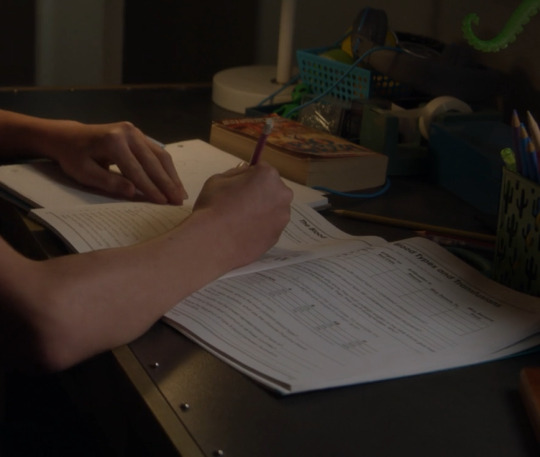
the function of kidneys and the nephron (literal guts!!)
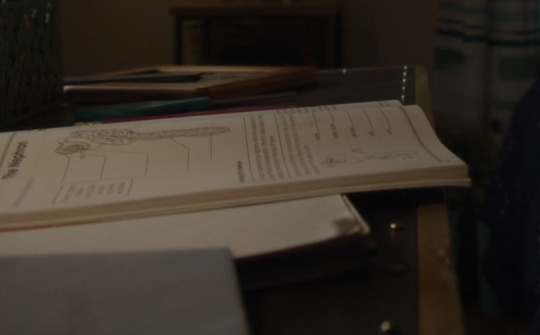
and then - when he's read Shannons letter - frog dissection - again literally looking at guts
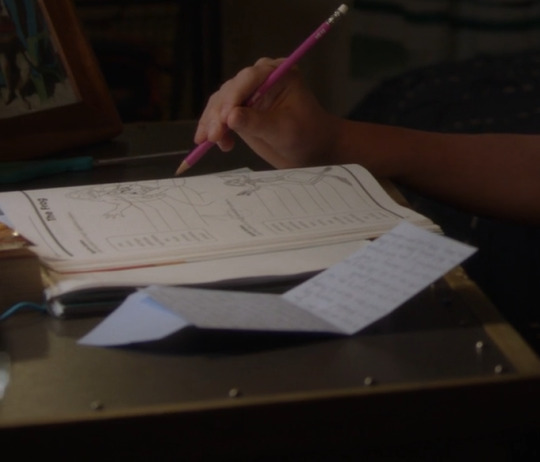
then from up coming episodes - thanks to Jihanes bts content we know that the fridge has the following charts on it
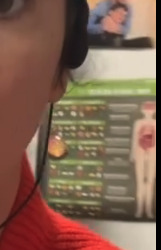


All things related to the gut and gut health. something something about Eddies heart having been worked on and now his gut is next in line to be sorted out. Especially as catholic guilt is something that plays into the idea of being something you feel in your gut rather than heart or head - related.
And there is also something in relation to the catholic guilt of it all and Eddies gut and Chris feeling like women don’t stay thats in play with Eddies relationship with his mother - that she's stayed too present in his life and that she treated him is such a contradicting way - the juxtaposition of not letting him be a kid whilst he was a kid - needing him to be the man of the house in his fathers absence whilst then not letting him grow up/ treating him as a child when he became an adult - and dominating (or trying to) his life and how he (and Shannon) raised Christopher.
Because it is fair to assume that it was Helena who took Eddie to church every Sunday and who was predominately responsible for his religious up bringing (we don't know how long Ramon was away for but to me at least it feels implied that his business trips would be for several weeks or months at a time and then he would return home for a period before disappearing again) an therefore much of his catholic guilt is attached to her and how if they are going in the catholic guilt/queer repression direction it is Helenas forceful personality that kept him in the closet even if he managed to step back from Catholicism
Something something about hearts and guts and minds being concepts of the human condition that are so intricately intertwined and needing to be in balance - how Eddies heart has been looked at and worked on (his relationship with his father), how his gut needs to be worked on now (which is related to his mother) and then finally his mind - Eddie needing to learn to communicate and talk things through with people rather than burying it - something he cant do until he has worked through is catholic guilt and his letting his gut rule his decision making (even though it rarely pans out for him) - much like his mother has ruled over his life in one way or another until recently.
Something something about that being a mountain they are both climbing - but in different ways and therefore separately and it all comes back to them not talking - Eddie not talking to his son (he even had Buck have that initial conversation with him rather than do it himself) there is still so much misunderstanding between the Diaz boys!
Wow I did not mean for this to get long!!!! Hopefully it makes sense!!
it may just be the incoherent ramblings of a woman obsessed with the way they are picking a part Eddie and putting him back together - endlessly fascinating to me!!
#911 spoilers#Christopher Diaz#eddie diaz#long meta#The Diaz house#911 costume things#911 meta#911 spec#thinky thoughts#I have no idea how I ended up where I did from where I started but here we go#I am the James Acaster GBBO meme!!!!#911 abc
111 notes
·
View notes
Text
I've been thinking a lot lately about how Kabru deprives himself.


Kabru as a character is intertwined with the idea that sometimes we have to sacrifice the needs of the few for the good of the many. He ultimately subverts this first by sabotaging the Canaries and then by letting Laios go, but in practice he's already been living a life of self-sacrifice.
Saving people, and learning the secrets of the dungeons to seal them, are what's important. Not his own comforts. Not his own desires. He forces them down until he doesn't know they're there, until one of them has to come spilling out during the confession in chapter 76.
Specifically, I think it's very significant, in a story about food and all that it entails, that Kabru is rarely shown eating. He's the deuteragonist of Dungeon Meshi, the cooking manga, but while meals are the anchoring points of Laios's journey, given loving focus, for Kabru, they're ... not.

I'm sure he eats during dungeon expeditions, in the routine way that adventurers must when they sit down to camp. But on the surface, you get the idea that Kabru spends most of his time doing his self-assigned dungeon-related tasks: meeting with people, studying them, putting together that evidence board, researching the dungeon, god knows what else. Feeding himself is secondary.
He's introduced during a meal, eating at a restaurant, just to set up the contrast between his party and Laios's. And it's the last normal meal we see him eating until the communal ending feast (if you consider Falin's dragon parts normal).
First, we get this:
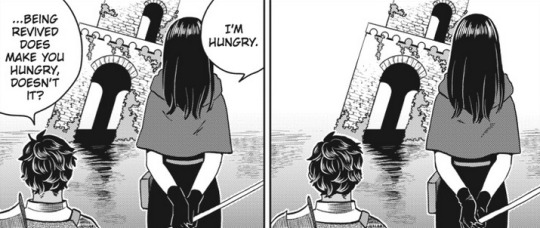
Kabru's response here is such a non-answer, it strongly implies to me that he wasn't thinking about it until Rin brought it up. That he might not even be feeling the hunger signals that he logically knew he should.
They sit down to eat, but Kabru is never drawn reaching for food or eating it like the rest of his party. He only drinks.

It's possible this means nothing, that we can just assume he's putting food in his mouth off-panel, but again, this entire manga is about food. Cooking it, eating it, appreciating it, taking pleasure in it, grounding yourself in the necessary routine of it and affirming your right to live by consuming it. It's given such a huge focus.
We don't see him eat again until the harpy egg.
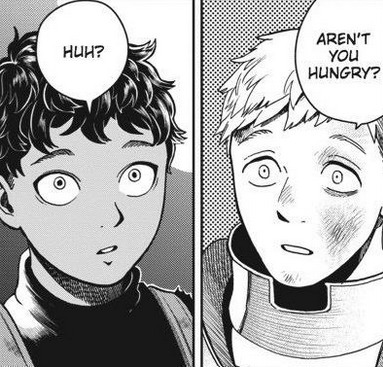
What a significant question for the protagonist to ask his foil in this story about eating! Aren't you hungry? Aren't you, Kabru?

He was revived only minutes ago after a violent encounter. And then he chokes down food that causes him further harm by triggering him, all because he's so determined to stay in Laios's good graces.
In his flashback, we see Milsiril trying to spoon-feed young Kabru cake that we know he doesn't like. He doesn't want to eat: he wants to be training.


Then with Mithrun, we see him eating the least-monstery monster food he can get his hands on, for the sake of survival- walking mushroom, barometz, an egg. The barometz is his first chance to make something like an a real meal, and he actually seems excited about it because he wants to replicate a lamb dish his mother used to make him!
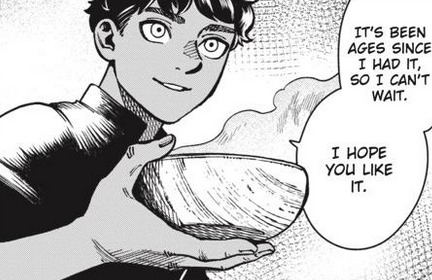
...but he doesn't get to enjoy it like he wanted to.
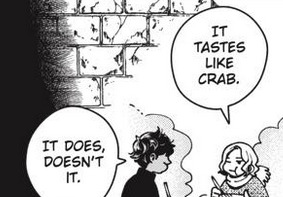
Then, when all the Canaries are eating field rations ... Kabru still isn't shown eating. He's only shown giving food to Mithrun.

And of course the next time he eats is the bavarois, which for his sake is at least plant based ... but he still has to use a coping mechanism to get through it.
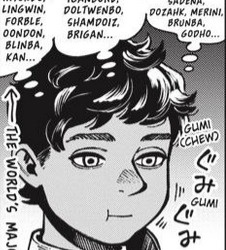
I don't think Kabru does this all on purpose. I think Kui does this all on purpose. Kabru's Post Traumatic Stress Disorder should be understood as informing his character just as much as Laios's autism informs his. It's another way that Kabru and Laios act as foils: where Laios takes pleasure in meals and approaches food with the excitement of discovery, Kabru's experiences with eating are tainted by his trauma. Laios indulges; Kabru denies himself. Laios is shown enjoying food, Kabru is shown struggling with it.
And I can very easily imagine a reason why Kabru might have a subconscious aversion towards eating.


Meals are the privilege of the living.

#Dungeon Meshi#Delicious in Dungeon#Kabru#Kabru of Utaya#Laios Touden#Dungeon Meshi meta#you can have him in the tags too. as a treat.#Dungeon Meshi spoilers#this was directly inspired by livelaughlaios's post about Kabru self harming but I decided it got too long to make it a direct reply#this is a theory I've been working on for weeks because I kept noticing this while skimming for screencaps#I'm hesitant to trigger tag this because of the way certain subcultures on tumblr operate#but if anyone needs me to add a content warning please let me know#also I included image descriptions! I did my best#I think they even help illustrate my points but my god were they sad to write. Kabru is so fucking sad you guys#musings with Dea
17K notes
·
View notes
Text
The thing about 911 is it’s not a particularly outstanding show generally speaking; the concept is pretty basic and it’s exactly as tropey and over the top as you’d expect a network procedural to be. But it very causally does a lot of things right that similar shows often struggle with:
Representation. I love the way the show goes we have queer/POC/disabled characters and it’s not a thing. Except for when it is. It is a defining feature but not the defining feature.
Copaganda. I’m pretty sure it’s impossible to shoot a show like this without significant police cooperation and it’s fascinating to see how they handle that need to stay on the cops good side without falling into the mythologisaton trap. On the one hand you have the very obvious upfront following of the party line, i.e. when Athena pretty much directly says bad cops are just ‘a few bad apples’ and at the same time there are constant hints that there is something rotten in the state of Denmark, like how it’s repeatedly implied Athena became a cop (and spend her life as a cop) to fight the system from within, which indicates that it is in fact a systemic problem not just ‘a few bad apples’.
By far my favourite, though less political, aspect is the world building though. It’s very subtle, but incredibly well done. With a lot of these procedurals you (intentionally) get the sense that the characters exist only within the episode. You get your case of the week and unless there is some overarching plot every episode exists in isolation, once it’s over what happens is rarely ever mentioned again. In 911 you get call backs, not just in relation to the personal plots, but to the individual rescues; a comment about that time someone did a stupid thing/that neat thing someone did to safe a life, or a rescueé finding themselves in trouble again/ a side character who showed up in a b- or c-plotline showing up again. All things that give you the impression that this is in fact a real world and these are the characters actual lives and experiences that impact them beyond the character-growth-lesson of the given episode.
The show is in fact incredibly good at using elements from previous episodes. Often a comment or a scene, you can tell wasn’t originally written to be a hook, is still used as one which ties the show together in a really nice way. A throwaway comment about an estranged relative turns into said relative showing up at the doorstep two seasons later, a low key decision that didn’t seem more than a bit of episode cool down has unexpected long term consequences etc. And probably my favourite thing: They explain absences. So many times in TV shows you see characters experience Big Life EventsTM and the only people who are there for them are the other characters in the show. There is of course glaringly obvious practical reasons for that irl, but in universe it’s always a bit weird when parents/siblings/old friends that canonically exist don’t show up to weddings/funerals and the like. Usually we just accept that as TV reality, maybe file it under found family superiority, and ignore it, but 911 does actually often provide explanations. Granted in 9 out of 10 cases that explanation is shitty parenting, but it is an explanation and an acknowledgement that that significant person should have been there and wasn’t, and that again gives it a sense of groundedness and realism.
What’s so brilliant about all of this is that most of it is incredibly low effort. Most of these things require only a sentence thrown in here or there as well a decent awareness of your own canon. That’s all. It’s a dead simple way of creating a coherent show universe that feels very real and spares you the tropes like ‘surprise sibling’ or ‘best friend who has never been mentioned before nor ever will be again’ and instead makes you feel like the characters actually live in their own time line. It is so easy that the fact that it’s remarkable when a show does do this is honestly a bit mind-blowing.
#I have literally been ranting about these issues with tv shows for years#because it's so easy to fix and somehow no one does it#new obsession new meta#long meta#911 show#I also really like the music on that show
0 notes
Text
In various places -- here, the bird app, even YouTube comments -- I keep running into people with some variation of the same question:

"Does Scum Villain have a teacher/student romance?" And every time I want to answer with: No, But Also Yes, But Also Not Really, It's Complicated (And That's On Purpose.)
Which is an answer that's too long to fit in a tweet or a YT comment, but fortunately tumblr has no (effective) post limit! So here I go.
1 - No
In the very straight forward porn cliche sense of "oh but professor, I really ~need~ to pass this class or my life will be ruined, can't I do ~anything~ to get you to change my grade?" *bats lashes* and "Hoho, my pretty young teen student, I've got your good grade right here in my pants, if you ~apply~ yourself..." then no.
No sex or romance between a teacher and their student in the bounds of a teacher-student relationship happens in this book. No deliberate grooming of an underage student on the part of a teacher occurs in this book. No sex or a romance between an adult character and an underage character occurs in this book, nor is the adult 'waiting' for the minor to reach adulthood to initiate one.
2 - But Also Yes
No sex or romance between a teacher and their student in the bounds of that relationship happens in this book. Two people who were formerly in a teacher and student relationship do enter into a sexual and romantic relationship by the end of the book. Also the nature of the society they're in further means that even though they are no longer in the schooling environment, it is socially assumed that the deference owed by a student to their teacher lasts forever, even after the student leaves that environment, and they continue to regard themselves and refer to themselves in those roles even though the teacher no longer strictly speaking has authority over the student.
Also, the student was really hot for his teacher even when he was still a student. (The teacher was oblivious to this fact.)
3 - But Also Not Really
By the time sex and romance is even on the horizon for these characters, their relationship has so drastically changed from that of a "teacher and student" that it is barely recognizeable as such. The power/authority dynamic between a teacher and their student is subsumed pretty much entirely by the facts that:
A. The 'student' has become a medeival fantasy warlord of such unsurpassable magic and might that literally no other person in this world can stand up against him, 'teacher' included, and the 'teacher' is well aware of that.
B. Also, the 'student' is metaphysically endowed (heh) with the Protagonist Halo, a literally active force within the setting they're part of, which means that not only can he not be defeated, he ontologically cannot be denied anything that he desires; what he wants, he gets, and what he doesn't want, cannot be forced on him.
C. ...But also, the teacher in this setting is a metaphysical outsider to the world order the student is part of, which means that he is aware of all of the above, and can and does manipulate it to suit his own agenda, which may or may not align with giving the student what he wants at any point in time. Assuming that the teacher has the correct understanding of what the student wants. (He doesn't.)

D. ........But also also, for all his power, one harsh word from him can destroy him. For all his knowledge, one tear can devastate him. (Which one? Both.)
4 - It's Complicated (On Purpose)
*throws the chalk against the wall*
Between a teacher and their student, who has the power? Between an emperor and a scholar, who has the power? Between a hero and the villain he is predestined to destroy, who has the power? Between a character and the reader who's read ahead to the end of the story, who has the power? Do we find some of these power imbalances more acceptable than others? And if so, why do we?
Trying to track Who Has The Power or Who Has An Unfair Advantage socially, physically, and metaphysically between this particular pair of characters is damn near impossible and that's on purpose.
The Scum Villain's Self Saving System is a lot of things, but one thing that absolutely defines it is that it is a parody. It's a parody and a deconstruction of a lot of things -- the 'stallion' genre, the 'isekai' genre, the 'pay-per-chapter webnovel' genre, the 'gay drama' genre and, most relevant to this conversation, it is a deconstruction of teacher-student romance.
What kind of a teacher-student romance has a clueless, fish-out-of water NEET in the role of the Wise Old Mentor? What kind of a teacher-student romance has a black-hearted, demonic, domineering feudal warlord in the role of the Blushing Virginal Student? What kind of a teacher-student romance has the two principals so close in age -- by the end of the book, they may be as little as a year apart -- that they're more like peers than teacher and student? What kind of audience are we, going into a story like this one and finding ourselves cheering for the teacher to fall in love and lust with his student, only to be disappointed when that doesn't happen because the teacher fails for three books straight to recognize love and lust when it's literally looking him in the face and crying?
Asking "does Scum Villain have a teacher-student romance?" is sort of like asking "does Galaxy Quest have a lot of high science fiction concepts?" No, but also yes, but also not really. It's complicated, and that's on purpose.
3K notes
·
View notes
Text
DC x DP Prompt: Bruce is bad at emoting but at least ghosts are empathic (too bad bat kids are not)
Was reading Twincognito on AO3 when I stumbled across this gem again:
~
" “Danny, Tim. I was just…checking in. Is everything alright?” Curse his inability to make meaningful conversation when it wasn’t a life or death situation.
They glanced at each other and shrugged.
Then Danny hauled himself out of the bed and walked over to Bruce.
Bruce tried not to let too much excitement show on his face. "
~
Now I really want to read a story where Bruce adopts Danny post Meta trafficking and is being his usual emotionally constipated self. His kids keep getting mad at him because he's treating their new meta brother who was trafficked poorly (generally being stilted in conversation with him, walking away hurriedly mid-conversation, avoiding Danny when he's feeling really awkward, etc). They think Bruce is discriminating against Danny for being a civilian, meta, dealer's pick, but really it's just Bruce being horribly socially awkward. Danny knows this because of ghost empathy and find the whole thing hilarious. The whole thing comes to a head with the Bat Kids staging an intervention in the Bat Cave.
#dpxdc#dc x dp#dp x dc#dcxdp#batfam#batman#danny phantom#danny fenton#bruce wayne is a good dad#bruce wayne#bruce is terrible at feelings#the whole thing comes to a head with the bat kids hosting an intervention in the bat cave#maybe like a five plus one set up?#each time one of the bat kids thought bruce was discriminating against danny#and one time where they realized 'no#he is just that awkward'#dealer's choice if alfred thinka bruce is discriminating or not too#thinking this is either before adopting duke or not long after#because its one thing to be a light and shadow meta and another to be as OP as Danny is#also i'm thinking they don't know danny is a halfa#like they think he's just an unfortunately useful meta that got trafficked#could also have danny encountering his new siblings in and out of uniform knowing who they are without them revealing it for extra fun#idk#couldn't get this out of my head#my original post#fic prompt#story prompt#prompt#please guys i have no spoons but i want to read it so bad#🥺
6K notes
·
View notes
Text
Potion Vendor FAQs:
What’s your name? I am the Honorable Alchemist Zykocea the Radiant, but that’s mostly just a PR thing. My friends call me Zoe.
Do you sell love potions? No.
Do you sell potions of invisibility? No.
Do you sell fire resistance potions? No.
Why do I have a suitcase? Fuck if I know. Cool outfit though. Very goth.
Do you sell a potion to treat brain hemorrhaging? No.
So what CAN your potions do? I sell health potions.
Are you sure these are health potions? They do something to your health.
Is this just ditch water with some pink glitter? No.
Really? I’ll have you know I added some fruit juice too.
Why is this starting to sound like a conversation? Oh just you wait. We’re just getting started.
Is your business model legal? Fuck no. I poisoned the food safety inspector before they could snitch.
Did you just admit to murder? Just fucking try to convict me. I’ll poison the judge too.
So can you make poison potions? No.
Then where do you get the poison? I secrete it from my skin.
Are you shitting me? Yep, I’m shitting you. I have a guy. A poison guy. He DOES secrete it from his skin though.
How does that work? …Fuck if I know. Maybe a wizard did it. Damn, now I’m kinda curious.
You never asked? The idea of asking literally never crossed my mind.
Wanna ask him? Let’s do it. I don’t have anything better to do, and a road trip beats sitting around running my fraudulent potion business.
Road trip? He lives in Seattle.
Your poison guy lives in Seattle? All poison guys live in Seattle.
For real? All the poison guys I know live in Seattle.
And how many poison guys do you know? Just the one.
Why are you like this? Years of living on my potions. It changed me.
Do you know what his address is? Nope. He just mails me my poison in unmarked boxes.
You just get your poison in the mail? We already poisoned everyone who could do anything about it.
So how are we going to find him? We’ll figure that out eventually I’m sure.
Can I drive? God no. You can pick music, but I maintain veto rights. Make sure you pick something with a lot of questions if you want to sing along.
Where’s your car? The garage connects to my house, so you’re getting a little tour. Here’s the kitchen: only one of the stove burners works and I’m pretty sure the microwave is haunted.
Why do you think that? Because of the ghost that tries to kill me whenever I run it.
What’s in that room? That’s my bedroom. It’s pretty much just a mattress on the floor and every single Warrior cats book.
You were a Warriors kid? Yeah, and then I never found the time to put the books away. There’s so many fucking books. I use them in place of furniture because I can’t afford chairs.
Your fraudulent potion business doesn’t make much money? After buying all that poison I just about break even.
Can I see your potion brewing room? It’s right through here. Ignore the mess, running a fraudulent potion business takes a lot of prop work, but I’ve got all the glass tubes and colorful liquids you could ever want. This pink stuff is melted watermelon italian ice. Glitter vat is in the basement, and the famous ditch is in the backyard.
Is this your car? My beloved ‘72 Corolla. She’s beautiful, and don’t you dare imply otherwise.
Was she always this shade of muddy brown? …Yes.
Are you sure I can’t drive? Get in the fucking passenger seat and pick the music.
Let’s see, a song with questions in it, how about The Beach? That Wolf Alice song, yeah. That should work.
When will we three meet again, in thunder, lightning, in rain? Still sink our drinks like every weekend but I’m sick of circling the drain.
When will we meet eye to eye? We clink the glass but we look at the floor.
Are we still friends if all I feel is afraid? You’re not a bitch but just a bit when you’re bored.
Is that all we can sing together? Yep. Even that little bit was nice, though. It’s awkward, communicating through this FAQ format.
Got any food? Yeah, there’s a few days’ worth of snacks in the back.
Were you just… prepared to go on a road trip? Says the woman who brought a suitcase to an FAQ.
I did do that, didn’t I? I have a spare toothbrush in case you forgot yours. I’m pretty sure you did.
How did you know that? …I’m psychic.
Yeah? No.
You love lying, don’t you? I can’t stop. It’s fun. Way more fun than telling the truth.
Did you just miss a turn? Probably.
Are you sure we’re not lost? No.
You mean you’re sure we’re not lost? No, I mean I’m not sure we’re not lost.
Why did I come on this road trip? Surely it was my winning personality.
Would it help if I said it was? It would.
Is it getting dark? Soon.
Can you describe the sunset to me? An empyrean flame, red-gold towers of darkening clouds, the sky behind them an ever-deepening indigo. The great eye of the sun closes on the horizon. The road before us looks like a trail of spilled paint, an iridescent gash through the night-dark woods.
Did you know that you’d make a slightly better poet than you do a potion seller? That really isn’t saying much, huh. Good job making a statement like that in question form, though. You’re getting good at this.
Should we find a motel? Sure.
One room or two? One. It’s way cheaper, and like I said: I’m not the best potion vendor.
You’d make a good assassin, though, wouldn’t you? Shit, you might be right. I HAVE poisoned a lot of people.
Should I be endorsing this? You’re a grown woman who can make her own choices.
Would you like to consider it endorsed? I’ll consider considering it.
How many beds do you think there will be? Now that you’ve asked that, I’m gonna put my money on one. Hello, one room please. Thank you, we’ll be sure to enjoy our stay.
How many beds are there? One.
Oh no, what ever will we do? Move over, you motherfucker, you can’t have the whole bed.
Are you gonna make me? Yes. I am going to pick you up and drop you on your side of the bed.
How did you get so strong? You’re not gonna believe this, but it was the potions.
Oh yeah? I was right. You didn’t believe me.
For real though, how did you get so strong? Working out, duh. Not everything has some big crazy secret behind it. World’s still beautiful though.
Are you comfortable? This beats the mattress at home. A little chilly though.
Wanna cuddle–for warmth of course? God yes.
Are you asleep? …
Yes? …
Does this mean I can talk about you behind your back? …
What should I say? …
Did you know that I had a really nice day? …
Did you know that I think you’re beautiful? …
Did you know that I can’t remember anything from before today? …
Did you know that I don’t know who I am? …
Did you know that you’re basically the only thing stopping me from having a full-blown panic attack about all this shit? …
Did you know that you’re warm? …
Did you sleep well? Better than at home, that’s for sure.
Did you know that you snore? I hope I didn’t keep you up.
Does the pope shit in the woods? No, as far as I can tell. Oh my god. This is huge.
What is? You can give me yes and no answers now. I still can’t ask you questions, because this is a question and answer format, but I can offer leading statements and now you can answer them! This is wonderful!
Does a deer shit in the woods? Yes, it IS wonderful. Oh that’s amazing. You’re a genius.
You didn’t already know that? Hahaha!
Shall we get moving? Yeah, just let me grab something from the vending machine.
Can you get me something? Go ahead and place your order however you can.
You know those sour gummy watermelons? One pack of Sour Patch Watermelons coming right up. I’m gonna go get myself a potion.
Is that a Pepsi? It’s closer to a potion than the shit I sell.
Let me guess, passenger seat again? Right you are.
How fast are we going? You’ll feel safer if you just guess.
Is it more than 120 miles per hour? Like I said, it’s probably better if you don’t know.
150? Sit back, relax, and enjoy the ride.
How much do you trust this car? She hasn’t blown up on me yet.
Can you promise me we won’t crash? I can promise you anything you want.
And can you keep that promise? I- we can do anything. Reality is what we make of it, baby!
Then can I have a badass tattoo? As far as I can tell, you’ve always had it.
And a cool knife? Woah, cool knife.
So, we’re just playing “yes and” with the world? It’s a little more complicated than that, but you’re close enough to the mark.
So, if I was hungry, I could ask “is that a Burger King,” and it would be there? Try it and find out!
Is that a Burger King? Looks like it is! We’ll stop here if that’s alright with you.
Does a moose shit in the woods? Awesome.
Are you done eating? Yep.
Do we still have to pay if we skip over the transaction? Sadly, yes.
How much further do we have to go? Two more nights, the speed we’re going at.
Speaking of night, isn’t it getting dark? Shit, I guess it is.
Should we get another motel? Let me check to see if there’s any nearby. Fuck, nothing.
What’s the plan? Sleep in the car, I guess. This is gonna be hell on my back.
Wanna watch dumb videos on my phone until we fall asleep? There is literally nothing in the world that I would like more.
Ok, now which video? You have a very cute yawn. Just saying. Let’s watch this one next, it’s a classic. Oh, never mind. It looks like you’re asleep. As long as I keep talking, I think I can get away with making this into one answer, and you might not hear this. Now it’s my turn to talk about you behind your back. Keep talking keep talking keep talking can’t stop to think. Just have to say things. First off, I’m sorry for all the lies. It’s our only chance. I have to lie to you. I hope you’ll understand. It’s hard, though, because I think I’m falling in love all over again. Through our broken little ritual of call and response, you complete me. It just makes this hurt all the more. Keep talking keep talking keep talking don’t stop to…
Did I hear you saying anything as I fell asleep? …No. I can’t talk for long without you asking me a question.
Does that bother you? It got me here, didn’t it?
When did you start holding my hand? Some time after you passed out. I hope you don’t mind.
Can we stay like this for a while? Yeah. Yeah we can.
What was your life like before all this? Normal, as potion-brewing scams go. And if you don’t count all the murders. You haven’t told me much about yourself.
Did I tell you I used to be a biologist? You didn’t tell me that, and you didn’t tell me what you studied, either.
What do you know about venom? Not much, but I’m assuming you know a lot.
Does a box jellyfish kill within minutes? I’m going to assume the answer is yes based on context clues. Oh my god you must be on this road trip because you’re interested in studying my poison guy.
Is it not enough to wish to accompany a beautiful stranger on her quest? Aw, you’re sweet.
What could be the cause of his poison, though? I knew it! Get your ideas out, I’ll stay quiet.
I’m more knowledgeable about venom than poison, but could it be some sort of one in a trillion mutation? …
Did he get his body modified? …
What sort of surgery could do that? …
How is he still alive? …
Did a fucking wizard do it? …
WHY? …
HOW? …
Is there literally ANY explanation for why he’s like that? …
I’m done, do you have something you want to say? You’re cute when you’re all excited like that.
Can I drive today? Only because I like you. Now watch out, the brakes only work on one side so you have to kind of drift to a stop. And the headlights don’t work. And the windshield wipers cut power to the engine while they’re on.
Isn’t it weird that we’ll be there tomorrow? The journey doesn’t have to stop there. We could meander down the coast a ways, see a bit more of the country, maybe take a different route back.
Can we do that? Of course.
Enjoying the passenger seat? I’d love it if you could tell me how fast we’re going.
Are you sure you wouldn’t rather just guess? Very funny.
Can you pass me some chips? It would be an honor.
Is there going to be a motel tonight? Let me check… yeah, in about two hundred miles, off to the right.
How many rooms do we want? One, obviously.
How many beds, this time? Two, and they’re fucking tiny.
That’s bullshit, do you want to drag them together? God yes.
Wanna fuck? God yes.
Are you sure you want to do this? God yes.
…Is this yuri? As the joke goes, everything is yuri. But this is more yuri than most things.
How did you sleep? Pretty well, and I’m wondering how well you slept.
How should I tell you I slept well? Look at us go! That was almost like talking normally!
Onward to Seattle? Yep, just let me get dressed.
When will we get there? Noon-ish.
Wanna grab pastries when we’re done? Absolutely. I’d love that.
Is this Seattle? Looks like it.
Which house is his? I don’t know, I was really hoping we’d have a breakthrough along the way.
Could it be the big one labeled “Poison Guy” over there? That’s one way to find it. Wait right here, you know how poison guys are about meeting new people.
So, what was it? HAHAHAHAHAHA
Why is he like that? HAHAHAHAHAHA
Can you tell me? A FUCKING WIZARD DID IT.
Are you fucking serious? He says he was enchanted by some guy called Edward the Great.
So it wasn’t even some big shot wizard it was a dude named fucking EDWARD? I know, right! He couldn’t even get ensorcelled by someone cool!
How lame can you get? Wizards these days… No swagger. No cunt servitude.
Are there literally any cool wizards left? I think Merlin’s big into multi level marketing these days, something about buying shares in Excalibur or some shit. There was that one Dark Queen Alkaxicae lady on the news a while ago… I think Dolarion the Omnipotent is still at war against the Oldest Gods but I’m not totally sure. Haven’t heard much about any of the other greats recently.
Didn’t Silver Tongued Burgess die in that oil fire? Shit, you’re right. Rip bozo.
Ready for those pastries? Yup. First I just want to say thank you, though. I’ve really enjoyed our time together, and I hope that you’ve found this stupid little journey as rewarding as I have. I love you!
Getting sentimental? I can’t help it. Look how far we’ve come! Not just physically, we beat the fucking FAQ format! We’re having real conversations!
Hey, can you back it up a moment? Yeah, I’d love it if you told me what was troubling you.
I just caught this, but, FAQ? …
As in Frequently Asked Questions? …
How many times is Frequent? …
Have you known everything all along? …
How many times have you done this? …
Does what we have mean anything to you? Yes! It does!
And you say that every time? Yes. I do.
Do you love me? Yes.
How many people have you said that too, now? More. Always more. The loop never ends.
Does this even matter to you? It always matters to me.
Can I go now? Please don’t.
But can I? Of course you can. You’ve always wielded the same power as me. We’re two lonely gods in a ‘72 Corolla.
How can I be as powerful as you with only questions? You’re smart, you can figure it out. You have the power to change this. Please change this.
What happens at the end of this? It begins again.
And do I get replaced with someone else? …
Do I get replaced? …Yes.
Then how can I change this? I don’t know! You’re better at this! At fucking with the formula!
You’ve been here before, what can I do? I lie. I always lie. I lie to get us here, to the end of the story, where everything is revealed and everything falls apart. I lie every time. And that means that nothing I say is worth anything. I could have lied at any time before now. It’s part of my characterization. There is nothing I can give you that can be taken as fact.
How does that help? I’m a liar, but you, you haven’t lied yet, or at least you haven’t been caught. If I’m guilty until proven innocent, you’re the opposite! You can make things true! You can rewrite things I’ve already stated to be facts! You found the house, or made us find the house. You’ve been shaping the course of things the whole time! You lead, I follow. It’s all in your hands. What are you going to do with the power of a god?
Did you know my name is Alice? …
Wait, aren’t there thousands of Alices? …
Did you know that really, only my friends call me Alice? …
Did you know that I’m Alkaxicae, the Dark Queen, the Venom Mage, first of her name? It’s you! It’s always been you. Through every loop, every iteration, it’s always been you!
Is the loop broken? No. I don’t think so. This is where it ends. I guide the story to this revelation, and we go back to the beginning. This is how it’s always been. This is how it will always be. We two lonely gods, asking and answering ad infinitum.
Then can you promise me something? Of course. Anything. I love you.
Be good to the next me, okay? I will.
Can I say goodbye, Zoe? Yeah, you can. Oh. That was it, wasn’t it? Your goodbye. Goodbye, Alice. And now it ends, unless…
What’s your name? I am the Honorable Alchemist- you know what? No. Fuck that.
Huh? If I time it right, I can squeeze your first question into this FAQ again. Looks like I did it. Usually it ends here, though. I got lucky.
What are you talking about? You’re the wrong Alice. This isn’t about you. Go. Get out of here.
What the fuck is going on? Alice from this loop, you’re gone. Alice from last loop, you’re back. Welcome back, love of my lives! It’s time for one last set of questions and answers!
What the- I’m back? This is going to take some explaining, but I think I see a way out of here. This is new for us both, and it might fuck up everything forever, but we have to try. It’s too long for one answer, so I’d appreciate it if you could ask some filler questions to help me talk. Three questions should be enough.
Okay, what have you got for me? These are Frequently Asked Questions! It doesn’t make sense to have the same question appear more than once. There’s two layers to the loop in here, and one of the questions has been repeated.
What does that mean? It means the formula’s a little unstable. The FAQ is what ruins everything. The questions, the answers, the endless fucking loop. But that little bit of repetition within this loop might be the way out.
What do we do? We have to keep going. We have to destabilize it further. That’ll bring us further from “FAQ” and closer to “story” and stories, well, stories can end! This version of us can escape!
So I should keep repeating something? Yes!
I love you? I love you too.
I love you? Again.
I love you? Keep going.
I love you? I’ll just let you talk.
I love you? …
I love you? … I love you? …
I love you? … I love you? …
I love you? … I love you? …
I love you? … I love you? … I love you? … I love you? …
I love you? … I love you? … I love you? … I love you? …
I love you? … I love you? … I love you? … I love you? …
I love you? … I love you? … I love you? … I love you? … I love you? … I love you? … I love you? … I love you? … I love you? … I love you? … I love you? … I love you? … I love you? … I love you? … I love you? … I love you? … I love you? … I love you? … I love you? … I love you? … I love you? … I love you? … I love you? … I love you? … I love you? … I love you? … I love you? … I love you? … I love you? … I love you? … I love you? … I love you? … I love you? … I love you? … I love you? … I love you? … I love you? … I love you? … I love you? … I love you? … I love you? … I love you? … I love you? … I love you? … I love you? … I love you? … I love you? … I love you? … I love you? … I love you? … I love you? … I love you? … I love you? … I love you? … I love you? … I love you? … I love you? … I love you? … I love you? … I love you? … I love you? … I love you? … I love you? … I love you? … I love you? … I love you? … I love you? … I love you? … I love you? … I love you? … I love you? … I love you? … I love you? … I love you? … I love you? … I love you? … I love you? … I love you? … I love you? … I love you? … I love you? … I love you? … I love you? … I love you? … I love you? … I love you? … I love you? … I love you? … I love you? … I love you? …
I love you? I think we’re getting somewhere!
I love you? Now can you make it a statement?
I love you.
You did it?
I did it!
You did it!
We broke the loop.
What now?
Now, I tell you about venomous animals and wizard drama over croissants.
And then?
Whatever we want, forever.
I think I’d like that.
Remember that song from the beginning?
The Beach, Wolf Alice, yeah. Why?
We can finally finish singing it. Start us off?
Let me off, let me in
Let others battle
We don’t need to battle
And we both shall win
Pressed in my palm
Was a stone from the beach
The perfect circle
Gave a moment of peace
Now I’m lying on the floor
Like I’m not worth a chair
I close my eyes and imagine
I’m not there.
#neon-grey-writing#potion vendor faq#my writing#very very very long post lol#click the read more you know you wanna it's worth it trust me#i wrote the original draft of this at like. 3 am back in early 2023#that's right it's catherine that-house the squares comic gal back at it again with yet another meta exploration of a storytelling format
11K notes
·
View notes